-
Content Count
564 -
Joined
-
Last visited
Posts posted by Admin
-
-
December 29 2014: There has been welcome progress in the NGO sector in Somalia during recent years, with many new organisations setting up around the country. However, questions have been asked about the degree to which they are helping to support peace and development work, with international aid money flowing in and the potential for corruption increasing. Abdiwahab M. Ali reports on the situation in the Horn of Africa.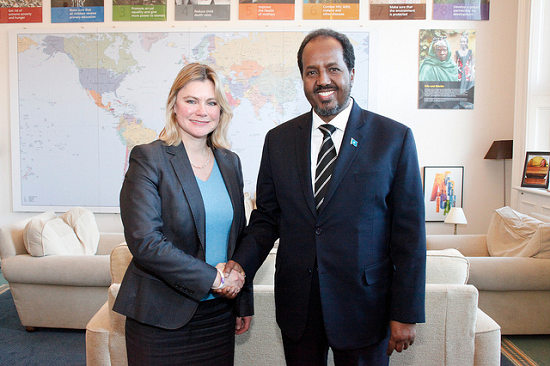 Somali President Hassan Sheikh Mohamud, with British Secretary of State for International Development, Justine Greening. Image credit: DFIDAfter the 1991 downfall of government led by Siad-Barre, a new era of great decadence began in Somalia, which continues to this day. The country found itself in the midst of an intense struggle for power, featuring prominent Somali clans and warlords. The bloody civil war which ensued was followed by several humanitarian crises, with an estimated 350,000 peopel dying as result of f ighting, kidnappings and other problems linked to conflict.Although more than 20 peace-building conferences on Somalia have been held since the demise of Siad Barre, none has brought lasting peace in Somalia. They have failed because of a lack of local participation, and the influence of clan-based interests where there has been. Regional and international interventions in Somalian affairs have further complicated matters.However, in the wake of disintegration of the Somalian state in 1992, numerous NGOs were formed. This upshot of the civil war has helped to bolster the strength of indigenous voices, and contributed to the rise of self-help groups aimed at improving people’s lives in the absence of government.Somalians have seen tremendous growth in the size, scope, and activities of the non-profit sector. They all claim to be dedicated to improving people’s lives and livelihoods, curbing poverty, fighting against injustice and exploitation.They have often been established with the backing of international actors, including the UN and several other international agencies, which work to implement relief and humanitarian interventions with local partners.
Somali President Hassan Sheikh Mohamud, with British Secretary of State for International Development, Justine Greening. Image credit: DFIDAfter the 1991 downfall of government led by Siad-Barre, a new era of great decadence began in Somalia, which continues to this day. The country found itself in the midst of an intense struggle for power, featuring prominent Somali clans and warlords. The bloody civil war which ensued was followed by several humanitarian crises, with an estimated 350,000 peopel dying as result of f ighting, kidnappings and other problems linked to conflict.Although more than 20 peace-building conferences on Somalia have been held since the demise of Siad Barre, none has brought lasting peace in Somalia. They have failed because of a lack of local participation, and the influence of clan-based interests where there has been. Regional and international interventions in Somalian affairs have further complicated matters.However, in the wake of disintegration of the Somalian state in 1992, numerous NGOs were formed. This upshot of the civil war has helped to bolster the strength of indigenous voices, and contributed to the rise of self-help groups aimed at improving people’s lives in the absence of government.Somalians have seen tremendous growth in the size, scope, and activities of the non-profit sector. They all claim to be dedicated to improving people’s lives and livelihoods, curbing poverty, fighting against injustice and exploitation.They have often been established with the backing of international actors, including the UN and several other international agencies, which work to implement relief and humanitarian interventions with local partners.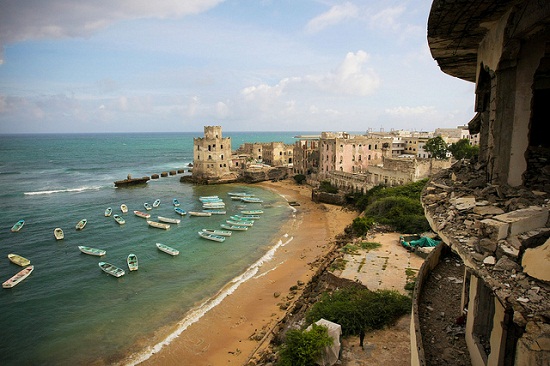 Mogadishu harbour in 2012, a year after the forced withdrawl of Al Shabaab. Image credit: UN Photos.
Mogadishu harbour in 2012, a year after the forced withdrawl of Al Shabaab. Image credit: UN Photos.The credibility gap
But as the sector develops, so do arguments over the actual impact it has on the lives of those it claims to serve.Indeed, when I visited Somalia last year, I was very worried to see that many local NGOs have disappeared, with few replacing them.Problems but potential: the status of NGOs in Somalia
Research has shown that NGOs experience a number of common problems and dilemmas, including internal decision-making processes, recruitment, retention of staff, layoffs, and accountability, evaluation, structural growth, and fund raising activities.From my experience and observations of local people and organisations, it appears the much of the decline of Somalian NGOs is self-inflicted. Below are four common challenges facing then:Donor dependency
NGOs are non-profit generating organisations, and must offer their services for the greater cause of Somalis. However, some community organisations are driven less by vision, morals and beliefs, and more by the need to generate earnings. Such money-minting behaviour is an indication of the presence of vested interests, and erodes the local credibility of such organisations. It is also typical for the founders of NGOs in Somalia to be their chief executive as well. Often, what they do is establish an organisation, develop a donor-recipient relationship with foreign NGOs, take photographs of supposed work which has taken place, and use these as false evidence for having completed a project, in order to gain access to donor funds.Corruption and poor leadership
These problems are a nation-wide hindrance not just to NGOs, but to democracy and good governance generally. As youth specialist Mohamoud Yosuf says:Some NGOs in Somalia put their principles into practice, but too many are becoming part of the problem, instead of the solution. They’ve last their public image of being honest brokers. Some locals dub them ‘brief-case’ NGOs – organisations which exist only on paper, in order to make their owners money. They need to work for the sake of their communityGender bias
Many who claim to be helping minorities and vulnerable groups in Somalia, including women, children and the elderly, actually ignore those very same people. No properly inclusive process can function in this way.Geographical location
A great fault, which has surprised me a lot during my research, is how many local NGOs run very similar projects, with the same objectives. And these are often in the same, usually urban, areas. Clearly there are disadvantages to working in rural settings, but it is important not to neglect people living and working away from towns and cities.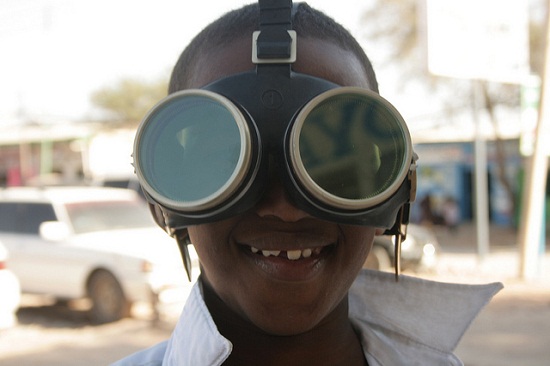 A youngster in Somaliland. Image credit: Teresa Krug
A youngster in Somaliland. Image credit: Teresa KrugCorrecting the trend
The general growth in Somalian NGOs is to be welcomed. They provide vital services, and reach sectors of the population who otherwise would not be able to access services.But the private actions and public image of these local NGOs is far from positive. By taking the following steps, they will be able to regain the full confidence and trust of local people and international organisations in Somalia.First, efforts should be made to formulate good organisational structures: being flexible, innovative and inclusive of all those relevant to the issue they are working on.Second, the accountability, transparency, and efficiency of NGOs needs to be improved. Although a large undertaking, establishing an independent authority to assess actual and claimed NGO achievement would be one step towards doing this.Third, and most importantly, the civil society sector in general and local NGOs in particular should turn to grassroots communities and evaluate themselves and their performance. They should work collectively, wherever possible avoiding competing for resources and sharing technical know-how.And last but no means least, donors should think twice about to whom they give aid, providing funding based on the reality on the ground, not merely for the sake of funding.Trying to avoid past mistakes will make it much easier to promote social justice and development, across all of Somalia.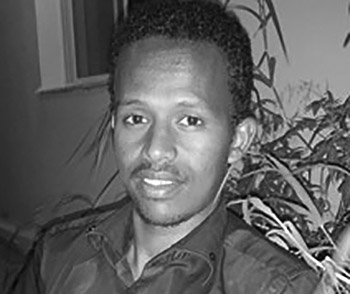 Abdiwahab M Ali is a Somalia-based freelance writer and researcher. His interests include conflict, peace building and civil society. He has worked with a number of government and non-governmental organisations. Follow him at@Waberijr.
Abdiwahab M Ali is a Somalia-based freelance writer and researcher. His interests include conflict, peace building and civil society. He has worked with a number of government and non-governmental organisations. Follow him at@Waberijr.
http://www.somaliaonline.com/that-sinking-feeling-in-somalia-the-trouble-with-ngos-in-the-horn-of-africa-by-abdiwahab-m-ali/ -
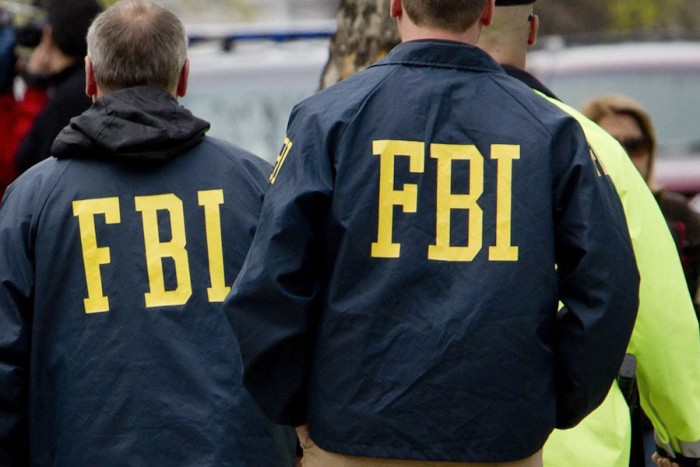 An FBI community outreach program in Seattle received orders to gather intelligence on the Somali community, according to reports released this week by the Brennan Center for Justice at New York University School of Law and the Star-Tribune in Minneapolis.Seattle was one of six cities targeted in a 2009 plan to use the FBI’s community outreach programs to gather intelligence on Somali immigrants, according to documents obtained and published by Michael Price, counsel for the Brennan Center’s Liberty and National Security Program. The order was rescinded in 2010.While the Brennan Center report said the Minneapolis-Saint Paul area was identified as the program’s top priority, the Star-Tribune reported that the Minneapolis FBI officials told reporters it resisted the spy orders because the bureau’s outreach specialists did not want to jeopardize their relationships with community members.Seattle FBI field office spokeswoman Ayn Dietrich-Williams told the Globalist that the FBI’s community outreach relationships are important to build trust.“Unfortunately in Seattle, we’ve seen a number of incidents with bias crime,” she said, referring to several recent attacks on immigrant cab drivers. “It’s for things like that, so that people know that we have a commitment to investigate.”She said in the al-Shabab case in Minneapolis, it was members of the Somali community who came to FBI agents to report that their family members had been radicalized.“They came to us; we’re not suspicious of them. They want to protect their families,” she said.The FBI has long had community outreach programs and fostered relationships with community groups, to provide mentorship and to build trust in law enforcement, according to the agency’s website. The program ended in December 2010, after the field offices received an order to separate community outreach efforts with field operations. The 2010 orders specifically “forbids using community outreach to conduct ‘Domain Assessments,’ prohibits (Community Outreach Program) personnel from reporting to the ‘Field Intelligence Group’ (FIG) or to an operational squad or task force, and requires segregation of community outreach files,” according to Price of the Brennan Center.However, Price questioned continued uses of FBI community outreach, including a 2012 incident in Seattle when FBI agents came unannounced to the home of an immigrantand questioned her about calls to her family in Afghanistan. When she and her daughter asked why the agents were there, the agents reportedly cited “community outreach,” according to a letter to FBI from CAIR-WA.According to the Brennan Center, after 22 young men from the Minneapolis area joined al-Shabab in Somalia in 2007 and 2009, the FBI designed the “Specialized Community Outreach Team” (SCOT) to focus on outreach to Somali immigrants as a counter-terrorism measure.Instead of focusing on mentorship and bridge-building, like previous FBI community outreach efforts, Price writes that the main aim of SCOT was to collect information.“SCOT intentionally commingled community outreach with intelligence gathering and investigative activity. Indeed, according to the memo, one of the primary benefits of the SCOT program was the support it provided to Field Intelligence Groups (FIGs) and ‘operational programs throughout the Bureau,’ ” Price wrote.The program description outlines plans to expand to Cincinnati; Seattle; San Diego; Washington, D.C.; and Denver, according to the document obtained by the Brennan Center.The Seattle FBI office said it was working on a response to the specific reports late Friday. The Globalist will follow up with this story as information is received.Price wrote:Genuine efforts at community outreach are praiseworthy and have the potential to strengthen our national security. The FBI took a step in the right direction by establishing rules to keep outreach and intelligence separate. But even the best of intentions will not have an impact if the FBI does not follow its own rules or seeks to sidestep them.And despite the denial that any spying went on in the Minnesota programs, Minneapolis Public Radio reported that news released this week about the intelligence-gathering program have made some Muslims wary of new FBI community outreach efforts in the Twin Cities.Source: http://www.seattleglobalist.com
An FBI community outreach program in Seattle received orders to gather intelligence on the Somali community, according to reports released this week by the Brennan Center for Justice at New York University School of Law and the Star-Tribune in Minneapolis.Seattle was one of six cities targeted in a 2009 plan to use the FBI’s community outreach programs to gather intelligence on Somali immigrants, according to documents obtained and published by Michael Price, counsel for the Brennan Center’s Liberty and National Security Program. The order was rescinded in 2010.While the Brennan Center report said the Minneapolis-Saint Paul area was identified as the program’s top priority, the Star-Tribune reported that the Minneapolis FBI officials told reporters it resisted the spy orders because the bureau’s outreach specialists did not want to jeopardize their relationships with community members.Seattle FBI field office spokeswoman Ayn Dietrich-Williams told the Globalist that the FBI’s community outreach relationships are important to build trust.“Unfortunately in Seattle, we’ve seen a number of incidents with bias crime,” she said, referring to several recent attacks on immigrant cab drivers. “It’s for things like that, so that people know that we have a commitment to investigate.”She said in the al-Shabab case in Minneapolis, it was members of the Somali community who came to FBI agents to report that their family members had been radicalized.“They came to us; we’re not suspicious of them. They want to protect their families,” she said.The FBI has long had community outreach programs and fostered relationships with community groups, to provide mentorship and to build trust in law enforcement, according to the agency’s website. The program ended in December 2010, after the field offices received an order to separate community outreach efforts with field operations. The 2010 orders specifically “forbids using community outreach to conduct ‘Domain Assessments,’ prohibits (Community Outreach Program) personnel from reporting to the ‘Field Intelligence Group’ (FIG) or to an operational squad or task force, and requires segregation of community outreach files,” according to Price of the Brennan Center.However, Price questioned continued uses of FBI community outreach, including a 2012 incident in Seattle when FBI agents came unannounced to the home of an immigrantand questioned her about calls to her family in Afghanistan. When she and her daughter asked why the agents were there, the agents reportedly cited “community outreach,” according to a letter to FBI from CAIR-WA.According to the Brennan Center, after 22 young men from the Minneapolis area joined al-Shabab in Somalia in 2007 and 2009, the FBI designed the “Specialized Community Outreach Team” (SCOT) to focus on outreach to Somali immigrants as a counter-terrorism measure.Instead of focusing on mentorship and bridge-building, like previous FBI community outreach efforts, Price writes that the main aim of SCOT was to collect information.“SCOT intentionally commingled community outreach with intelligence gathering and investigative activity. Indeed, according to the memo, one of the primary benefits of the SCOT program was the support it provided to Field Intelligence Groups (FIGs) and ‘operational programs throughout the Bureau,’ ” Price wrote.The program description outlines plans to expand to Cincinnati; Seattle; San Diego; Washington, D.C.; and Denver, according to the document obtained by the Brennan Center.The Seattle FBI office said it was working on a response to the specific reports late Friday. The Globalist will follow up with this story as information is received.Price wrote:Genuine efforts at community outreach are praiseworthy and have the potential to strengthen our national security. The FBI took a step in the right direction by establishing rules to keep outreach and intelligence separate. But even the best of intentions will not have an impact if the FBI does not follow its own rules or seeks to sidestep them.And despite the denial that any spying went on in the Minnesota programs, Minneapolis Public Radio reported that news released this week about the intelligence-gathering program have made some Muslims wary of new FBI community outreach efforts in the Twin Cities.Source: http://www.seattleglobalist.com -
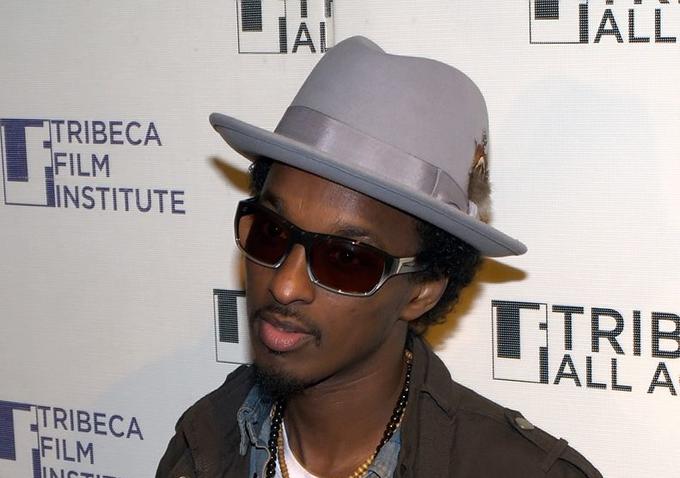 The Sundance Institute today announced the winners of its 2015 Sundance Institute Global Filmmaking Award, in recognition and support of emerging independent filmmakers from around the world. Each winning filmmaker will receive a cash award of $10,000, attendance at the Sundance Film Festival for targeted industry and creative meetings, eligibility to participate in one of Sundance Institute’s 24 annual artist-development labs and ongoing creative and strategic support from Sundance Institute’s Feature Film Program.Among the winning directors is New York-based Somali rapper K’naan, who's no stranger to the Sundance Institute (he's an alumnus of the Institute's Screenwriters and Directors Labs).K'naan's project, for which he won a Global Filmmaking Award, which he will direct (also his directorial debut), is titled "The Poet." Logline reads: "In war-torn Somalia, an artistic orphan named Maano undertakes a dangerous journey to Mogadishu in order to find his long-lost sister."Joining K'naan in the winner's circle are: Myroslav Slaboshpytskiy, whose project is titled "Luxembourg" (Ukraine); "Be Safe I Love You" (Saudi Arabia) by Haifaa Al Mansour; and Oskar Sulowski, "Rosebuds" (Poland/Germany).Former winners include: Ariel Kleiman (Australia) for "Partisan" (in competition at the 2015 Sundance Film Festival); Talya Lavie (Israel) for "Zero Motivation" (2014 Tribeca Film Festival, Founders Award for Best Narrative Feature and the Nora Ephron Prize); Jonas Carpignano (Italy) for "Mediterranea" (in post-production); Shonali Bose (India) for "Margarita with a Straw" (premiered at the 2014 Toronto International Film Festival); and Seng Tat Liew (Malaysia) for "The Men Who Saved the World" (premiered at the 2014 Toronto International Film Festival).The Sundance Institute Global Filmmaking Award presented by AJ+ marks the first collaboration between the two organizations.Source: http://blogs.indiewire.com
The Sundance Institute today announced the winners of its 2015 Sundance Institute Global Filmmaking Award, in recognition and support of emerging independent filmmakers from around the world. Each winning filmmaker will receive a cash award of $10,000, attendance at the Sundance Film Festival for targeted industry and creative meetings, eligibility to participate in one of Sundance Institute’s 24 annual artist-development labs and ongoing creative and strategic support from Sundance Institute’s Feature Film Program.Among the winning directors is New York-based Somali rapper K’naan, who's no stranger to the Sundance Institute (he's an alumnus of the Institute's Screenwriters and Directors Labs).K'naan's project, for which he won a Global Filmmaking Award, which he will direct (also his directorial debut), is titled "The Poet." Logline reads: "In war-torn Somalia, an artistic orphan named Maano undertakes a dangerous journey to Mogadishu in order to find his long-lost sister."Joining K'naan in the winner's circle are: Myroslav Slaboshpytskiy, whose project is titled "Luxembourg" (Ukraine); "Be Safe I Love You" (Saudi Arabia) by Haifaa Al Mansour; and Oskar Sulowski, "Rosebuds" (Poland/Germany).Former winners include: Ariel Kleiman (Australia) for "Partisan" (in competition at the 2015 Sundance Film Festival); Talya Lavie (Israel) for "Zero Motivation" (2014 Tribeca Film Festival, Founders Award for Best Narrative Feature and the Nora Ephron Prize); Jonas Carpignano (Italy) for "Mediterranea" (in post-production); Shonali Bose (India) for "Margarita with a Straw" (premiered at the 2014 Toronto International Film Festival); and Seng Tat Liew (Malaysia) for "The Men Who Saved the World" (premiered at the 2014 Toronto International Film Festival).The Sundance Institute Global Filmmaking Award presented by AJ+ marks the first collaboration between the two organizations.Source: http://blogs.indiewire.com -
When Munira Khalif was younger, she wanted to somehow use her education to give back to her parents’ native country, Somalia.
Now, at 17, she has done so much more.
Khalif, a senior at Mounds Park Academy in St. Paul, founded a nonprofit, lobbied for legislation against child marriage, became a teen adviser to the United Nations’ Girl Up campaign and performed an original spoken-word poem for Nobel Prize-winner Malala Yousafzai and U.N. leaders.
“She is an inspiration to her peers,” said Kari Kunze, Khalif’s speech coach at Mounds Park Academy. “She is somebody walking the walk, not just talking the talk. It makes it very real. You can be a kid and still have a voice and do important work.”
Khalif, who lives in Fridley, is a personable teenager with an impressive list of activities.
Her peers and teachers have said that she thinks critically about what she says and how she says it. She exudes confidence and grace in a way many twice her age have yet to master. She piles on extracurricular activities, but makes time for sleepovers and cooking with her friends.
As a high school freshman, Khalif already had a taste for activism.
She started the nonprofit Lighting the Way, which helps East African diaspora youth empower their counterparts in the Horn of Africa by making education accessible. The organization has raised about $30,000 to provide scholarships and tackle sanitation issues. An organization in Kenya donated $250,000 to help build a library in Somalia.
Khalif is also a global youth ambassador for A World At School, a campaign focused on ensuring universal education.
Khalif also founded a Social Consciousness Club, a platform for students to discuss domestic and international issues, such as hunger in America and foreign aid.
As a teen adviser for the U.N.’s Girl Up campaign, she mobilized young people in her community to send letters to Congress in support of legislation fighting against child marriage.
During her sophomore year, she was invited as part of Girl Up to attend Malala Day at the U.N. headquarters in New York. The 2013 event honored Yousafzai, the Afghan girl who this year became the youngest Nobel winner ever, sharing the peace prize at age 17. There, Khalif performed her spoken-word piece for Yousafzai, youth delegates and U.N. leaders, including Secretary-General Ban Ki Moon.
The poem was a tribute to Yousafzai’s bravery and “girls like her who continue to fight for fundamental human rights and education.”
Most recently, she was awarded the U.N. Special Envoy for Global Education’s Youth Courage Award, which honors young people fighting for universal education. She was one of nine chosen from around the world to receive the honor.
“That was the highlight of my entire high school career,” Khalif said. “I was just bewildered.”
She likes to recite the African proverb: “If you educate a boy, you educate an individual, but if you educate a girl, you educate a nation,” to explain the emphasis on girls’ education.
“The sheer ripple effect of educating a girl is huge, especially in developing countries,” Khalif said.
‘Identity’
Khalif is the daughter of Somali parents who fled the civil war there in 1992.
“Having parents who fled from civil war changes your entire perspective. That makes you realize the opportunities you have in the United States and use those to its fullest extent,” she said.
She recounts stories in Somalia of her mother’s father making sure his daughters had an education during a time when most girls did not.
“Because my mom was able to receive this gift of education, I felt I had an obligation to give this gift back,” Khalif said.
And she was told stories of female Muslims who were “leaders of their time.”
“So being able to see my own reflection in the mirrors of history were very important and pivotal growing up.”
Khalif is inspired by stories from the civil-rights movement, as well as by her favorite book, “The Souls of Black Folk” by W.E.B. Du Bois, the Beat poets and spoken-word artist Saul Williams. She uses these platforms to inspire her spoken-word poetry, which she calls her “identity.”
It’s been her way to “find a place as a minority in the United States.”
“[All of that was] influential in growing up but also [has] helped me a lot in figuring out who I was,” she said.
Spoken-word poetry has played a large role in her academic life.
Khalif is in her fourth year of performing poetry on the Mounds Park Academy speech and debate team. She was recently named the 2014 Minnesota state poetry champion at a speech competition.
“She has a strong sense of social justice,” said Kunze, who was Khalif’s Spanish teacher five years ago. “She has a beautiful voice and a beautiful point of view.”
Khalif said she is grateful to the school for prompting students to grow as thinkers. She said teachers at Mounds Park expect a lot from their students: “They force you to actually think in a larger sense of how you can play a larger role in this world.”
For most high school seniors, this time of year is crunch time for college applications.
Khalif is no exception. She’s put her extracurricular activities on hold to polish her college applications for early-decision deadline.
She doesn’t have a dream school in mind, knowing that most schools are selective. She does want to work in government, continue her activism and spoken-word poetry, and someday return to Somalia.
“I want to be part of the dialogue back home [in Somalia],” Khalif said. “There’s a lot of peace-building happening in Somalia, and I want to be a part of that when I get older.”
A lot of people say they are going to change the world and they have the best intentions, Kunze said.
“But Munira is somebody who probably will change the world,” Kunze said.
Karen Zamora • 612-673-4647
Twitter: @KarenAnelZamora
Source: http://www.startribune.com
-
Toronto’s inner suburbs have become shorthand for crumbling postwar apartment blocks, underfunded schools or gang warfare. They’re among the neighbourhoods with the lowest incomes in the city, the longest trek to a TTC stop, and the highest concentration of immigrants and visible minorities. This month, we’re sharing stories from Torontonians who live in the inner suburbs, told in their own words. Some are shocking, some tragic, some hopeful. Together, they convey an urgent truth: Toronto is failing too many of its citizens. Have a story of your own? Tweet, Facebook, or Instagram with the hashtag #TorontoIsFailingMe to tell us.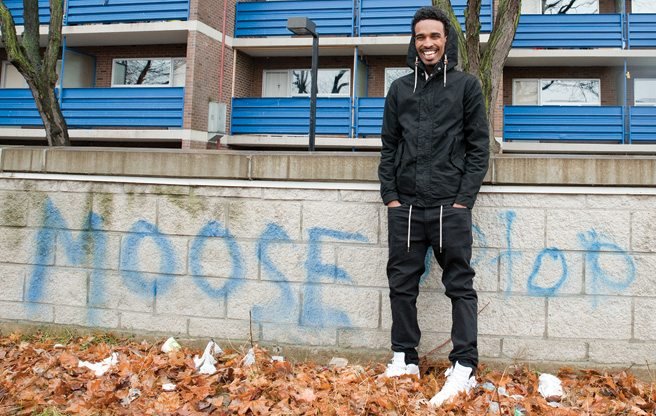 Abdul Nur in his neighbourhood.
Abdul Nur in his neighbourhood. Abdul Nur, 19
Jane and FinchI grew up in a five-bedroom townhouse in the Edgeley Village community housing complex. My whole life I had neighbours and friends who looked out for me. I have seven brothers and sisters, five older than me and two younger. My dad was a veterinarian in Somalia, but he now works in a shipping department. My mom keeps me on the right path.When I was 16, I hung around with guys who would just roam the streets; we were like a flock of sheep, all following each other. Then one day in 2012, two of my friends got arrested on robbery charges. Police ransacked the community centre, taking them out in handcuffs, shoving them inside cruisers. And I’m watching this thinking, “Yo, these are the people I’m running around with.” I realized that would be me soon, getting carted away. I stopped hanging around with them after that.Instead, I spent my time volunteering with a community group, Success Beyond Limits. Some of my older siblings had been involved in the program, which uses youth leaders to teach other kids about education and life goals. I worked with them as a peer mentor over four years. Today I teach a spoken word workshop once a week, and we’re taking a group from the community to perform at the Parapan Games this summer.I graduated high school in 2013 but returned for another semester to improve my grades. I’m now in my first year at York—it’s a 10-minute walk from our house. I’m studying business management but thinking of switching to poli-sci. My mom always wanted me to be a doctor, but I want to be a teacher so that I can go back and teach in the community. I want to have a hand in how young people at Jane and Finch will grow up. They don’t have enough role models. If you’re a teacher, you’re going to be with them through some of the crucial points in their lives; you can have a huge influence.—as told to Lauren McKeonSource: http://www.torontolife.com
http://www.somaliaonline.com/torontos-inner-suburbs-have-become-shorthand-for-crumbling-postwar-apartment-blocks-underfunded-schools-or-gang-warfare-i-want-to-teach-kids-that-this-neighbourhood-isnt-a-curse/ -
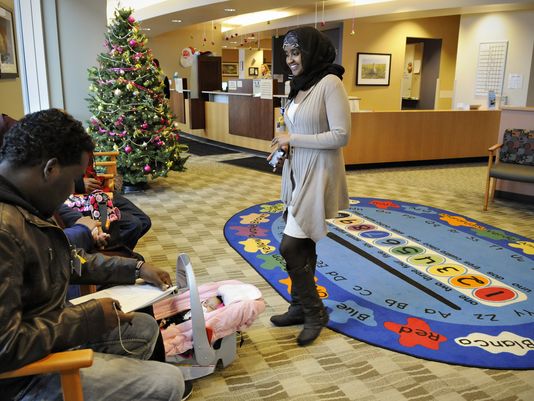 Amina Ahmed remembers well leaving Kenya for the U.S. in 2005."That was one of the hardest things, leaving my dad behind. ... I still have that picture of walking through the gate. ... I was thinking, 'This is the last time I'm going to see him, ever,' " said Ahmed, a 24-year-old Somali woman.She got off the plane in Iowa in December."That was the first time in my life I've ever seen snow. I saw it on TV. I didn't realize how cold it was," she said. "I'm wearing a small sweater. ... And the cold, it just hits me. 'Whoa. What is this? Am I in a freezer?' "Her family made a home in St. Cloud. Several years later, Ahmed reunited with her father in Africa."For a good minute I did not recognize my father. He was standing there smiling at me, and I'm over here like, 'Where's my father? Where's my dad?' ... It took a minute for it to just kind of register. ... My dad is not the person that cries because he's been through way more than I've been through. And we just cried," she said.Eventually, her father was able to join the family in St. Cloud. Ahmed graduated from Apollo High School and later St. Cloud State University, with a degree in community health. She is completing a certification as a community health worker.The experiences of separation, resettlement and reunion fuel her passion for her unique job as a community health worker at CentraCare Health, where she helps Somali patients in the obstetrics and pediatric and adolescent medicine clinic. Many of the families she guides are navigating the complicated U.S. health care system as brand-new residents..Ahmed knows, from personal experience, that for Somali refugees and immigrants coming to Minnesota, the first year is the hardest."Everybody goes through that," she said. "It really is the hardest. But it gets better."I get it. When they come and they sit in front of me, and they tell me all this stuff they went through. They're like, 'Oh I've been here for three months and life is hard, and I don't know a way to get around.' And they just talk about all the struggles and how they don't understand the culture and how they don't speak the language. That is a big, big barrier, the language, the transportation. Back home, we could walk. ... And they were familiar with this life."The medical system refugees are used to is very different from what they encounter in the U.S."My whole job description is to help them navigate the health care system," she said, though she is not to be confused with a medical interpreter.Ahmed has plenty to do. CentraCare can roughly track the number of Somali families that use an interpreter. Among obstetrics, women's health and pediatric patients where Ahmed works, 1,790 in-person interpreters for Somali were used in a six-month period.The clinic where Ahmed works has had a community health worker for about two and a half years, said Sarah Schindler, director of CentraCare Pediatric and Allergy. Ahmed joined the clinic this summer, replacing a health worker who came to CentraCare on a short-term basis via a grant. Now CentraCare budgets for the position."(Community health workers) are such a trusted voice for the families," Schindler said. "It's a point of contact that is comfortable."Her commitment comes from her own experiences."I remember how I felt. I felt lost," she said.It can be as simple as getting to the appointment."I make sure they will have a ride that day. Because it's a big chunk of time for us. If they don't show up, we lose a lot of time where we could be seeing other people," she said."Most of the time, 90 percent of the time — this is just my calculation — they don't have rides set up," she said.Ahmed will coordinate with programs that provide services to refugees, including Lutheran Social Services. She'll call patients a week ahead of an appointment, a day ahead, the day of — as well as talking to other agencies."My job is to make sure I get my patients here," she said. "Because of that contact from the beginning ... we make this connection."She'll coordinate with nurses, suggest urgent care or a walk-in clinic, if an issue arises."Just like any other mom, if their kid is not feeling well, they want their kids to be seen," she said.They'll ask about county benefits, insurance or nutritional assistance, and she'll do what she can to help."Every day for me is an adventure," she said. "And I love it. ... I have learned so much. People think I have the answers. No, I'm learning from everybody."Some appointments are required as a condition of resettlement in the U.S. She helps the refugee and immigrant families get tested for diseases prevalent where they came from: tuberculosis, malaria, hepatitis, lead levels and parasites.She makes sure they understand to know how important it is to show up to an appointment, and to come ahead of time.She helps families establish primary doctors. She knows that Somali patients can press 4 on an insurance hotline to get the instructions in Somali.She'll hold their hands. She'll laugh through the sometimes uncomfortable process. She will joke with the families."It makes them feel comfortable," she said. "It builds trust." She also tries to empower the families, so they can navigate more independently."A big part of it is, where do you go, where do you shop? And if you go to the store, what do you buy?"She told of one man who was given a list of supplies to get to prepare for a colonoscopy. He didn't know where to go to find them."He came to me," she said.She said many of the Somali people are more comfortable asking her than another professional.Ahmed also provides a bridge to Somali culture for providers."I've got providers calling me all the time," she said.Schindler said she's seen the impact learning even a few short Somali phrases can have on patients. It shows that the doctors and nurses care."They light up," she said.Ahmed, too, does her best to help people feel comfortable."For me, I'm like a natural. I can meet you today and speak like I've known you my whole life," she said. "That's kind of one of my things."Schindler agrees."She is very open, very transparent. Her focus is on the family and really providing them with the best possible care and experience," she said.Ahmed is the only one of her kind at CentraCare. She stresses the need for more community health workers, for everyone, not just Somali families."I see the difference, when they show up for appointments here, and they feel welcome ... and respected," she said.She has tried to talk to her Somali friends about going into the community health worker field, as well as recruiting Somali nurses and doctors."Because I see the difference when I help these families. ... I notice they show up to their appointments more. They actually feel welcomed here and they feel like CentraCare cares about them," she said."I get people from other clinics calling me asking for my help," she said."We need more in St. Cloud. We need more for everybody," she said. "We all need guidance, because it's complicated."Follow Stephanie Dickrell on Twitter @SctimesSteph or call her at 255-8749.Source: http://www.sctimes.com
Amina Ahmed remembers well leaving Kenya for the U.S. in 2005."That was one of the hardest things, leaving my dad behind. ... I still have that picture of walking through the gate. ... I was thinking, 'This is the last time I'm going to see him, ever,' " said Ahmed, a 24-year-old Somali woman.She got off the plane in Iowa in December."That was the first time in my life I've ever seen snow. I saw it on TV. I didn't realize how cold it was," she said. "I'm wearing a small sweater. ... And the cold, it just hits me. 'Whoa. What is this? Am I in a freezer?' "Her family made a home in St. Cloud. Several years later, Ahmed reunited with her father in Africa."For a good minute I did not recognize my father. He was standing there smiling at me, and I'm over here like, 'Where's my father? Where's my dad?' ... It took a minute for it to just kind of register. ... My dad is not the person that cries because he's been through way more than I've been through. And we just cried," she said.Eventually, her father was able to join the family in St. Cloud. Ahmed graduated from Apollo High School and later St. Cloud State University, with a degree in community health. She is completing a certification as a community health worker.The experiences of separation, resettlement and reunion fuel her passion for her unique job as a community health worker at CentraCare Health, where she helps Somali patients in the obstetrics and pediatric and adolescent medicine clinic. Many of the families she guides are navigating the complicated U.S. health care system as brand-new residents..Ahmed knows, from personal experience, that for Somali refugees and immigrants coming to Minnesota, the first year is the hardest."Everybody goes through that," she said. "It really is the hardest. But it gets better."I get it. When they come and they sit in front of me, and they tell me all this stuff they went through. They're like, 'Oh I've been here for three months and life is hard, and I don't know a way to get around.' And they just talk about all the struggles and how they don't understand the culture and how they don't speak the language. That is a big, big barrier, the language, the transportation. Back home, we could walk. ... And they were familiar with this life."The medical system refugees are used to is very different from what they encounter in the U.S."My whole job description is to help them navigate the health care system," she said, though she is not to be confused with a medical interpreter.Ahmed has plenty to do. CentraCare can roughly track the number of Somali families that use an interpreter. Among obstetrics, women's health and pediatric patients where Ahmed works, 1,790 in-person interpreters for Somali were used in a six-month period.The clinic where Ahmed works has had a community health worker for about two and a half years, said Sarah Schindler, director of CentraCare Pediatric and Allergy. Ahmed joined the clinic this summer, replacing a health worker who came to CentraCare on a short-term basis via a grant. Now CentraCare budgets for the position."(Community health workers) are such a trusted voice for the families," Schindler said. "It's a point of contact that is comfortable."Her commitment comes from her own experiences."I remember how I felt. I felt lost," she said.It can be as simple as getting to the appointment."I make sure they will have a ride that day. Because it's a big chunk of time for us. If they don't show up, we lose a lot of time where we could be seeing other people," she said."Most of the time, 90 percent of the time — this is just my calculation — they don't have rides set up," she said.Ahmed will coordinate with programs that provide services to refugees, including Lutheran Social Services. She'll call patients a week ahead of an appointment, a day ahead, the day of — as well as talking to other agencies."My job is to make sure I get my patients here," she said. "Because of that contact from the beginning ... we make this connection."She'll coordinate with nurses, suggest urgent care or a walk-in clinic, if an issue arises."Just like any other mom, if their kid is not feeling well, they want their kids to be seen," she said.They'll ask about county benefits, insurance or nutritional assistance, and she'll do what she can to help."Every day for me is an adventure," she said. "And I love it. ... I have learned so much. People think I have the answers. No, I'm learning from everybody."Some appointments are required as a condition of resettlement in the U.S. She helps the refugee and immigrant families get tested for diseases prevalent where they came from: tuberculosis, malaria, hepatitis, lead levels and parasites.She makes sure they understand to know how important it is to show up to an appointment, and to come ahead of time.She helps families establish primary doctors. She knows that Somali patients can press 4 on an insurance hotline to get the instructions in Somali.She'll hold their hands. She'll laugh through the sometimes uncomfortable process. She will joke with the families."It makes them feel comfortable," she said. "It builds trust." She also tries to empower the families, so they can navigate more independently."A big part of it is, where do you go, where do you shop? And if you go to the store, what do you buy?"She told of one man who was given a list of supplies to get to prepare for a colonoscopy. He didn't know where to go to find them."He came to me," she said.She said many of the Somali people are more comfortable asking her than another professional.Ahmed also provides a bridge to Somali culture for providers."I've got providers calling me all the time," she said.Schindler said she's seen the impact learning even a few short Somali phrases can have on patients. It shows that the doctors and nurses care."They light up," she said.Ahmed, too, does her best to help people feel comfortable."For me, I'm like a natural. I can meet you today and speak like I've known you my whole life," she said. "That's kind of one of my things."Schindler agrees."She is very open, very transparent. Her focus is on the family and really providing them with the best possible care and experience," she said.Ahmed is the only one of her kind at CentraCare. She stresses the need for more community health workers, for everyone, not just Somali families."I see the difference, when they show up for appointments here, and they feel welcome ... and respected," she said.She has tried to talk to her Somali friends about going into the community health worker field, as well as recruiting Somali nurses and doctors."Because I see the difference when I help these families. ... I notice they show up to their appointments more. They actually feel welcomed here and they feel like CentraCare cares about them," she said."I get people from other clinics calling me asking for my help," she said."We need more in St. Cloud. We need more for everybody," she said. "We all need guidance, because it's complicated."Follow Stephanie Dickrell on Twitter @SctimesSteph or call her at 255-8749.Source: http://www.sctimes.com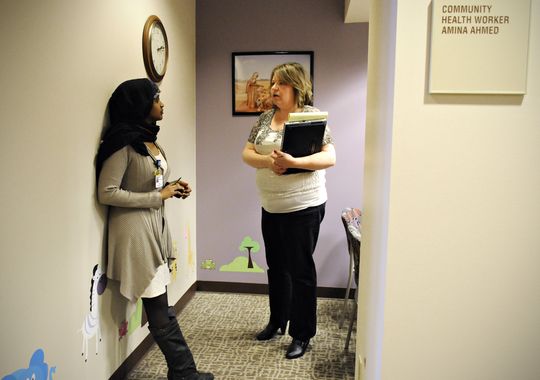 Buy PhotoAmina Ahmed, community health worker at the CenraCare Health Plaza talks with her supervisor Sarah Schindler, director of pediatrics and allergy, on Dec. 19. (Photo: Jason Wachter, jwachter@stcloudtimes.com)
Buy PhotoAmina Ahmed, community health worker at the CenraCare Health Plaza talks with her supervisor Sarah Schindler, director of pediatrics and allergy, on Dec. 19. (Photo: Jason Wachter, jwachter@stcloudtimes.com)
-
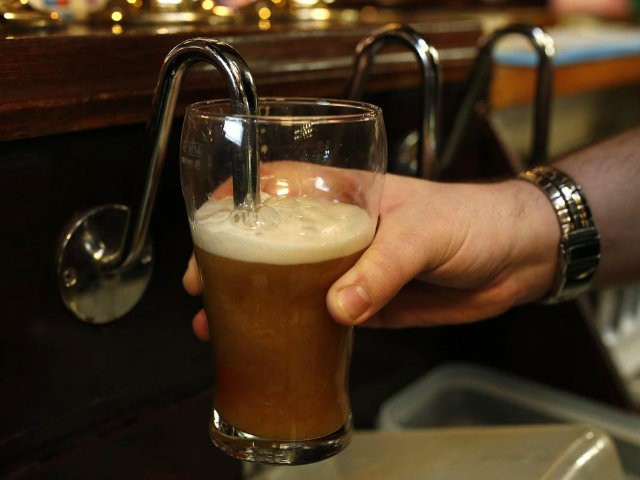 Mr Williams, whose party along with Labour and the Conservatives supported the expansion of the European Union in 2004, leading to a massive influx of migrants, was specific about those which had, in his opinion, led to the closures.His comments were part of a debate as the Government unveiled new plans to protect pubs after over a thousand have closed since the smoking ban was brought into law in 2007: a rate of about 26 a week on average.The Government has included a series of amendments to the Infrastructure Bill which have cross party support to stop pubs being demolished or having their use changed without planning permission.Deciding that pubs are now valuable to local communities, the plans are to stop pubs which meet the new criteria from being demolished or converted for other uses, such as flats.In November last year, MPs voted to loosen the ties which pub companies have over landlords managing tied pubs, with the aim of allowing them to lower prices to compete better with supermarkets and draw clientele in. The reform gives 15,000 British pubs the chance to ask for an independently assessed market rent and allows them to buy beer on the open market rather than being tied to one company.With towns and villages littered with the corpses of boarded up pubs; formerly centres of local communities unable to make ends meet as the regular drinkers stopped turning up, not wanting to stand outside in the cold for a cigarette along with their pint, politicians are eager to taking action.When the ban was brought in, people were told that pubs would instead be full of people who had stayed away because of the smoky atmosphere or come for evening meals, even though the Labour government was warned that pubs would close. There was evidence of this following the state of British Columbia in Canada introducing a similar ban, with the immediate results of bar closures.But the Lib Dem Minister said that the reason many pubs had closed was in fact because of “demographic change” rather than regulars abandoning their locals. It was for this reason he said that the measures being implemented by the government would not be a “blanket protection” because cultural reasons had led to closures.The MP for Bristol West said, “In my own constituency, lots of pubs have closed but it is usually because of demographic change.”“Particularly in some parts of my constituency, which used to have … ‘a white working class community’ 20 or 30 years ago are now populated primarily by recently-arrived Somalis and other people.“Obviously the pubs in that area have closed.“Some have been converted to other uses, some of them actually are still derelict.”It’s not the first time that migrants have been blamed for the closure of the British pub: one of the country’s traditional icons.In December, Tory peer Lord Hodgson of Astley Abbots said the growing Muslim population was one of the main reasons for pubs closing.UKIP MEP Ray Finch said: “Mr Williams has obviously an issue with mistaking apples for oranges.“Just because people are from a different culture doesn’t mean they can’t assimilate and indeed we should encourage them to enjoy the unique British culture.“The smoking ban is iniquitous and illiberal and if MPs really wanted to save the great British pub they would look at allowing landlords the freedom to have dedicated smoking rooms in their own establishments – which is currently UKIP policy.”Source: http://www.breitbart.com
Mr Williams, whose party along with Labour and the Conservatives supported the expansion of the European Union in 2004, leading to a massive influx of migrants, was specific about those which had, in his opinion, led to the closures.His comments were part of a debate as the Government unveiled new plans to protect pubs after over a thousand have closed since the smoking ban was brought into law in 2007: a rate of about 26 a week on average.The Government has included a series of amendments to the Infrastructure Bill which have cross party support to stop pubs being demolished or having their use changed without planning permission.Deciding that pubs are now valuable to local communities, the plans are to stop pubs which meet the new criteria from being demolished or converted for other uses, such as flats.In November last year, MPs voted to loosen the ties which pub companies have over landlords managing tied pubs, with the aim of allowing them to lower prices to compete better with supermarkets and draw clientele in. The reform gives 15,000 British pubs the chance to ask for an independently assessed market rent and allows them to buy beer on the open market rather than being tied to one company.With towns and villages littered with the corpses of boarded up pubs; formerly centres of local communities unable to make ends meet as the regular drinkers stopped turning up, not wanting to stand outside in the cold for a cigarette along with their pint, politicians are eager to taking action.When the ban was brought in, people were told that pubs would instead be full of people who had stayed away because of the smoky atmosphere or come for evening meals, even though the Labour government was warned that pubs would close. There was evidence of this following the state of British Columbia in Canada introducing a similar ban, with the immediate results of bar closures.But the Lib Dem Minister said that the reason many pubs had closed was in fact because of “demographic change” rather than regulars abandoning their locals. It was for this reason he said that the measures being implemented by the government would not be a “blanket protection” because cultural reasons had led to closures.The MP for Bristol West said, “In my own constituency, lots of pubs have closed but it is usually because of demographic change.”“Particularly in some parts of my constituency, which used to have … ‘a white working class community’ 20 or 30 years ago are now populated primarily by recently-arrived Somalis and other people.“Obviously the pubs in that area have closed.“Some have been converted to other uses, some of them actually are still derelict.”It’s not the first time that migrants have been blamed for the closure of the British pub: one of the country’s traditional icons.In December, Tory peer Lord Hodgson of Astley Abbots said the growing Muslim population was one of the main reasons for pubs closing.UKIP MEP Ray Finch said: “Mr Williams has obviously an issue with mistaking apples for oranges.“Just because people are from a different culture doesn’t mean they can’t assimilate and indeed we should encourage them to enjoy the unique British culture.“The smoking ban is iniquitous and illiberal and if MPs really wanted to save the great British pub they would look at allowing landlords the freedom to have dedicated smoking rooms in their own establishments – which is currently UKIP policy.”Source: http://www.breitbart.com -
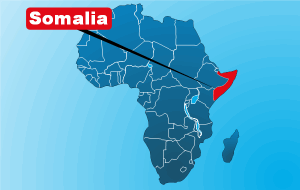 Global oil price drop brings relief for electricity consumers in SomaliaBy Abdirahman Hussein MOGADISHU (Xinhua) -- With a broad smile suggestive of a better business day, Halima Hassan serves a client ice cream in a side shop in Somalia’s capital Mogadishu a week after the electricity firm dropped electricity prices by 21 percent.“I was so elated when I got the message on my phone, saying that I would be paying 0.79 U.S. dollar per kilowatt of electricity compared with the previous 1.1 dollars. I can now make ice creams and also reduce the price for my clients,” Hassan told Xinhua on Wednesday.The reduction in electricity prices is attributed to the falling global oil prices, which now stands at around 50 dollars per barrel.Electricity generation and distribution in Somalia is fully run by the private sector after the collapse of government in 1991.Banadir Electricity Company (BECO), the only electricity generating and distribution company in Mogadishu, produces electricity using diesel powered generators since Somalia does not have hydro or wind powered electricity.Mohamed, a manager at BECO, told Xinhua that they buy the fuel at 125 dollars per barrel, which is a significant reduction from the previous 227 dollars per barrel.“The reduction in global oil prices has motivated us to reduce the charges for our clients,” he said.“I now pay 27.6 dollars for 35 kilowatts,” said Fatima Nor, a client of BECO, adding that the reduction in prices has helped her cut expenditure in her family.Asiyo Jimale, a mother of six, said her children can now study, thanks to reconnection in her house after she stopped using electricity because the price was expensive for her.“I now pay less than 5 dollars a month and my children are able to carry on with their studies in the evening,” Jimale said.However, some people in the city have decided to use solar panels for electricity despite the decrease in prices, saying that electricity cost is still very high in Mogadishu.Hassan Mohamud is one of a few people who use solar in their homes.“I have enough electricity from the solar installation, 24 hours a day, at my home and my business center, which can be used for more than three months,” Mohamud said.Some business in the city closed as they could not meet the electricity expenses.Hussein Farah, a former bar owner in Bakara market in Mogadishu said high electricity cost was the main obstacle to small business growth in Mogadishu.“Using over 25 kilowatts daily in my bar has led to the shut- down of my business because I sometimes could not afford the electricity bill. I could not earn over 25 dollars per day from the business yet the electricity alone consumed that amount,” said Farah.Source: http://www.coastweek.com
Global oil price drop brings relief for electricity consumers in SomaliaBy Abdirahman Hussein MOGADISHU (Xinhua) -- With a broad smile suggestive of a better business day, Halima Hassan serves a client ice cream in a side shop in Somalia’s capital Mogadishu a week after the electricity firm dropped electricity prices by 21 percent.“I was so elated when I got the message on my phone, saying that I would be paying 0.79 U.S. dollar per kilowatt of electricity compared with the previous 1.1 dollars. I can now make ice creams and also reduce the price for my clients,” Hassan told Xinhua on Wednesday.The reduction in electricity prices is attributed to the falling global oil prices, which now stands at around 50 dollars per barrel.Electricity generation and distribution in Somalia is fully run by the private sector after the collapse of government in 1991.Banadir Electricity Company (BECO), the only electricity generating and distribution company in Mogadishu, produces electricity using diesel powered generators since Somalia does not have hydro or wind powered electricity.Mohamed, a manager at BECO, told Xinhua that they buy the fuel at 125 dollars per barrel, which is a significant reduction from the previous 227 dollars per barrel.“The reduction in global oil prices has motivated us to reduce the charges for our clients,” he said.“I now pay 27.6 dollars for 35 kilowatts,” said Fatima Nor, a client of BECO, adding that the reduction in prices has helped her cut expenditure in her family.Asiyo Jimale, a mother of six, said her children can now study, thanks to reconnection in her house after she stopped using electricity because the price was expensive for her.“I now pay less than 5 dollars a month and my children are able to carry on with their studies in the evening,” Jimale said.However, some people in the city have decided to use solar panels for electricity despite the decrease in prices, saying that electricity cost is still very high in Mogadishu.Hassan Mohamud is one of a few people who use solar in their homes.“I have enough electricity from the solar installation, 24 hours a day, at my home and my business center, which can be used for more than three months,” Mohamud said.Some business in the city closed as they could not meet the electricity expenses.Hussein Farah, a former bar owner in Bakara market in Mogadishu said high electricity cost was the main obstacle to small business growth in Mogadishu.“Using over 25 kilowatts daily in my bar has led to the shut- down of my business because I sometimes could not afford the electricity bill. I could not earn over 25 dollars per day from the business yet the electricity alone consumed that amount,” said Farah.Source: http://www.coastweek.com -
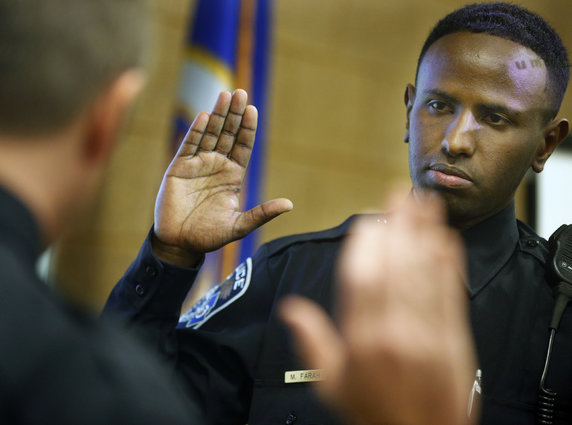 Hashim Abdullahi grew up in Minneapolis’ Cedar-Riverside neighborhood, where he says police-community relationships are, at times, tense. Many of his friends and acquaintances had scuffles with the law over the years.“Truthfully speaking, I think minorities there feel they are being picked on, my community especially,” said Abdullahi, who immigrated from Ethiopia via a Kenyan refugee camp at age 10. “There is some distrust for police officers.”Now, Abdullahi believes he can help change some of these perceptions. He is one of Columbia Heights’ two new police officers. The Columbia Heights Police Department has hired its first Ethiopian- and Somali-American officers.Abdullahi and Mohammed Farah were both sworn in on Thursday in front of a crowd of family, friends, city officials and fellow officers.The suburb of 20,000 on Minneapolis’ north border is about 35 percent minority. According to the U.S. Census, 15.5 percent of the city’s population is foreign born. Its police chief has stressed community policing and community outreach and said this is the natural progression — hire officers who reflect the community the police serve. The small department has 27 sworn officers.“We have an amazing team. We did have some gaps in our team in serving our community,” said Chief Scott Nadeau. The new officers bring cultural and language skills as well as the education needed to do the job. Abdullahi, 25, speaks four languages. He has an associate degree in law enforcement and has worked as a security officer at Abbott Northwestern Hospital. He owns a home in Brooklyn Park and is married, and the couple is expecting a child in two months.Farah, 27, speaks two languages. He immigrated to Rochester, Minn., from Somalia as a teenager. He earned his bachelor’s degree in law enforcement from Minnesota State University, Mankato. He served as a volunteer reserve officer with Mankato police, worked with troubled youth in a group home setting and worked at a school in Rochester before joining the Columbia Heights force.Mayor Gary Peterson attended last week’s ceremony and expressed his support.Both officers say their families support their career move but initially balked a bit at the risks involved.“My family was concerned because I was born and raised in a war zone in Ethiopia. They didn’t want anything to do with guns,” Abdullahi said. “They were afraid at times but they supported me in the long run.”Farah said his parents expressed similar sentiments.“My parents are like, ‘We brought you here for a reason. We don’t want you to carry guns.’ ” Farah said. “Obviously, they wanted me to be a doctor or an engineer.”Farah said their work will be twofold. They will bring some cultural knowledge to the department but will also help immigrant communities better understand laws and expectations in their new country.“I hope to build those bridges — educate the community about the laws and work with our peers about cultural differences,” Farah said.Both officers say the department’s emphasis on community outreach was appealing.“One of the things that attracted me is their core values being committed to helpfulness, dedication to the community and their professionalism toward their community and community involvement,” Abdullahi said. “I wanted to become part of it.”Source: http://www.startribune.com
Hashim Abdullahi grew up in Minneapolis’ Cedar-Riverside neighborhood, where he says police-community relationships are, at times, tense. Many of his friends and acquaintances had scuffles with the law over the years.“Truthfully speaking, I think minorities there feel they are being picked on, my community especially,” said Abdullahi, who immigrated from Ethiopia via a Kenyan refugee camp at age 10. “There is some distrust for police officers.”Now, Abdullahi believes he can help change some of these perceptions. He is one of Columbia Heights’ two new police officers. The Columbia Heights Police Department has hired its first Ethiopian- and Somali-American officers.Abdullahi and Mohammed Farah were both sworn in on Thursday in front of a crowd of family, friends, city officials and fellow officers.The suburb of 20,000 on Minneapolis’ north border is about 35 percent minority. According to the U.S. Census, 15.5 percent of the city’s population is foreign born. Its police chief has stressed community policing and community outreach and said this is the natural progression — hire officers who reflect the community the police serve. The small department has 27 sworn officers.“We have an amazing team. We did have some gaps in our team in serving our community,” said Chief Scott Nadeau. The new officers bring cultural and language skills as well as the education needed to do the job. Abdullahi, 25, speaks four languages. He has an associate degree in law enforcement and has worked as a security officer at Abbott Northwestern Hospital. He owns a home in Brooklyn Park and is married, and the couple is expecting a child in two months.Farah, 27, speaks two languages. He immigrated to Rochester, Minn., from Somalia as a teenager. He earned his bachelor’s degree in law enforcement from Minnesota State University, Mankato. He served as a volunteer reserve officer with Mankato police, worked with troubled youth in a group home setting and worked at a school in Rochester before joining the Columbia Heights force.Mayor Gary Peterson attended last week’s ceremony and expressed his support.Both officers say their families support their career move but initially balked a bit at the risks involved.“My family was concerned because I was born and raised in a war zone in Ethiopia. They didn’t want anything to do with guns,” Abdullahi said. “They were afraid at times but they supported me in the long run.”Farah said his parents expressed similar sentiments.“My parents are like, ‘We brought you here for a reason. We don’t want you to carry guns.’ ” Farah said. “Obviously, they wanted me to be a doctor or an engineer.”Farah said their work will be twofold. They will bring some cultural knowledge to the department but will also help immigrant communities better understand laws and expectations in their new country.“I hope to build those bridges — educate the community about the laws and work with our peers about cultural differences,” Farah said.Both officers say the department’s emphasis on community outreach was appealing.“One of the things that attracted me is their core values being committed to helpfulness, dedication to the community and their professionalism toward their community and community involvement,” Abdullahi said. “I wanted to become part of it.”Source: http://www.startribune.com -
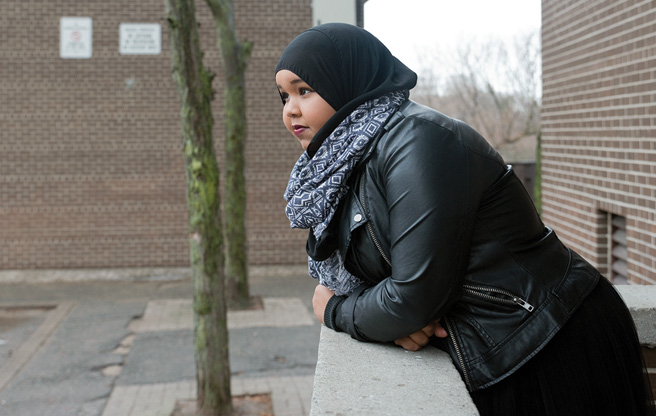 My parents came to Toronto from Somalia during the civil war. I’m the fourth of nine children: eight girls and one boy. I still live with my parents, in the same five-bedroom townhouse where I grew up. My dad has always supported us on a taxi-driver’s income; my mom stayed home and took care of us kids. My brother joined the Canadian military six years ago and helps with the bills. It’s been a challenge, but my parents are strong-willed and determined.I loved growing up in Etobicoke. There were always kids around: whether you wanted to play soccer or basketball in the summer or build snow forts in the winter. There were always adults around, too—to help you if you were in trouble, or to scold you if you needed a scolding. Now I’m that adult: if I see a young guy outside and it’s 10 p.m. and I know he’s supposed to be at home, I’ll say, “Hey, go home!” and he’ll go right away. That’s a strong neighbourhood.The first time I really got involved in the community was when I was 13. At the time we had a community centre with an after-school tutoring program. One day I showed up and the program had been shut down without notice. I was so frustrated. When Toronto Community Housing later held a meeting, my mom told me I should go and speak out. I did, and after the meeting we got our program back.People in our neighbourhood often don’t have a strong sense of self-worth. Everyone is always telling them they can’t do things—and outsiders seem so surprised when they succeed. In 2010, I enrolled in the criminology program at Ryerson University. Someone asked me where I lived, and when I said Rexdale, they told me, “Wow. You live there and you go to school here?” It’s hard to imagine yourself sitting at a desk in university, if all your life you’ve been told university isn’t for you.It’s the same with politics. I saw that my parents and the rest of the community were tired of voting for someone they thought would bring change and not seeing it happen. No one reflected their life experiences, their ideas and their beliefs. I wanted to demonstrate that there are options, so last year I entered the race for councillor in Ward 2. I ran against Rob Ford, knowing I had little chance of beating him. My goal was to show people that it’s possible for one of them to run for office.What happened during the campaign shocked me. People wrote “Bitch” and “Go back home” on my campaign signs. Being a target made me feel incredibly vulnerable. Then my signs started disappearing. We let the city know, but they said there wasn’t anything they could do. After the election was over, whoever stole the signs placed them back up all over the neighbourhood—likely knowing I’d be fined for it. In total, there were 154 put back up, and in November I received an invoice from Municipal Licensing and Standards for more than $4,000. I’m still fighting the charge—I followed all the rules and shouldn’t be penalized. The racism hit my team pretty hard; it took a lot out of them. The youngest volunteer was only 11 or 12, and they’d never faced anything like it. But I tried to teach them we could persevere past it. People only do this because they have hate in their hearts; you don’t have to give them any space in yours.Source: http://www.torontolife.com
My parents came to Toronto from Somalia during the civil war. I’m the fourth of nine children: eight girls and one boy. I still live with my parents, in the same five-bedroom townhouse where I grew up. My dad has always supported us on a taxi-driver’s income; my mom stayed home and took care of us kids. My brother joined the Canadian military six years ago and helps with the bills. It’s been a challenge, but my parents are strong-willed and determined.I loved growing up in Etobicoke. There were always kids around: whether you wanted to play soccer or basketball in the summer or build snow forts in the winter. There were always adults around, too—to help you if you were in trouble, or to scold you if you needed a scolding. Now I’m that adult: if I see a young guy outside and it’s 10 p.m. and I know he’s supposed to be at home, I’ll say, “Hey, go home!” and he’ll go right away. That’s a strong neighbourhood.The first time I really got involved in the community was when I was 13. At the time we had a community centre with an after-school tutoring program. One day I showed up and the program had been shut down without notice. I was so frustrated. When Toronto Community Housing later held a meeting, my mom told me I should go and speak out. I did, and after the meeting we got our program back.People in our neighbourhood often don’t have a strong sense of self-worth. Everyone is always telling them they can’t do things—and outsiders seem so surprised when they succeed. In 2010, I enrolled in the criminology program at Ryerson University. Someone asked me where I lived, and when I said Rexdale, they told me, “Wow. You live there and you go to school here?” It’s hard to imagine yourself sitting at a desk in university, if all your life you’ve been told university isn’t for you.It’s the same with politics. I saw that my parents and the rest of the community were tired of voting for someone they thought would bring change and not seeing it happen. No one reflected their life experiences, their ideas and their beliefs. I wanted to demonstrate that there are options, so last year I entered the race for councillor in Ward 2. I ran against Rob Ford, knowing I had little chance of beating him. My goal was to show people that it’s possible for one of them to run for office.What happened during the campaign shocked me. People wrote “Bitch” and “Go back home” on my campaign signs. Being a target made me feel incredibly vulnerable. Then my signs started disappearing. We let the city know, but they said there wasn’t anything they could do. After the election was over, whoever stole the signs placed them back up all over the neighbourhood—likely knowing I’d be fined for it. In total, there were 154 put back up, and in November I received an invoice from Municipal Licensing and Standards for more than $4,000. I’m still fighting the charge—I followed all the rules and shouldn’t be penalized. The racism hit my team pretty hard; it took a lot out of them. The youngest volunteer was only 11 or 12, and they’d never faced anything like it. But I tried to teach them we could persevere past it. People only do this because they have hate in their hearts; you don’t have to give them any space in yours.Source: http://www.torontolife.com -
Protests against Charlie Hebdo's front cover have seen thousands more take to the streets - with students in Somalia declaring 'Je Suis Muslim - and I love my Prophet'.Students marched through Mogadishu on Saturday morning, three days after the commemorative edition of the satirical magazine went on sale.The magazine features a cartoon of the Prophet Mohamed shedding a tear underneath the words 'All is forgiven', after 12 of Charlie Hebdo's staff were killed in a massacre earlier this month.But the use of the Prophets image has angered many Muslims around the world, with protests taking place from Somalia to Niger, and Pakistan to Jordan. Scroll down for video
Students marched through Mogadishu on Saturday morning after a cartoon of the Prophet Mohamed was published on the cover of Charlie Hebdo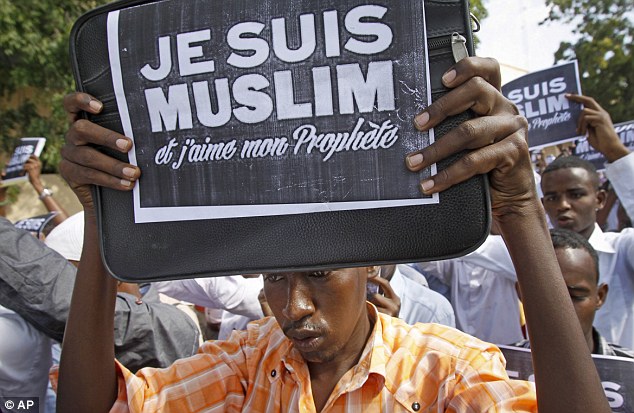 The Somali students carried signs which aped the 'Je Suis Charlie' posters which became synonymous with the Western peace rallies
The Somali students carried signs which aped the 'Je Suis Charlie' posters which became synonymous with the Western peace rallies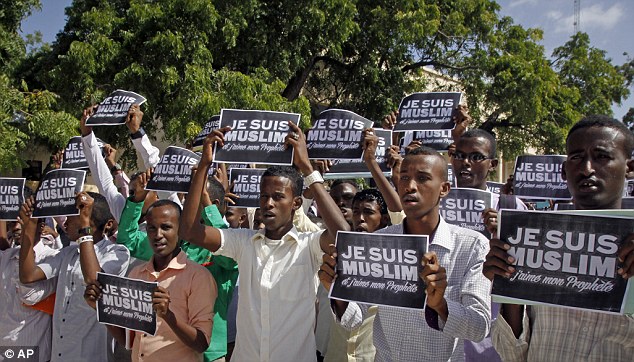 But their signs said 'Je Suis Muslim' - with 'I love my Prophet' written underneath
But their signs said 'Je Suis Muslim' - with 'I love my Prophet' written underneath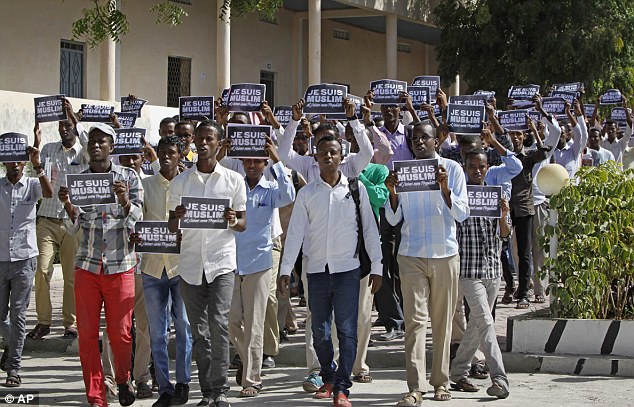 In Somalia, students had aped the catchphrase of Western marches 'Je Suis Charlie' - meant to show solidarity with the magazine - to 'Je Suis Muslim, et j'aime mon Prophete'. Translated, the sign means 'I am Muslim, and I love my Prophet'. The distinctive white writing was set against a black background with a white border, just like the Je Suis Charlie placards. Meanwhile, lawyers in Pakistan burnt an effegy of French President Francois Hollande in protest at the image, which they see as an attack on their religion.People took to the streets all across the western world in the wake of the Charlie Hebdo and Jewish supermarket massacres, which left 12 dead
In Somalia, students had aped the catchphrase of Western marches 'Je Suis Charlie' - meant to show solidarity with the magazine - to 'Je Suis Muslim, et j'aime mon Prophete'. Translated, the sign means 'I am Muslim, and I love my Prophet'. The distinctive white writing was set against a black background with a white border, just like the Je Suis Charlie placards. Meanwhile, lawyers in Pakistan burnt an effegy of French President Francois Hollande in protest at the image, which they see as an attack on their religion.People took to the streets all across the western world in the wake of the Charlie Hebdo and Jewish supermarket massacres, which left 12 dead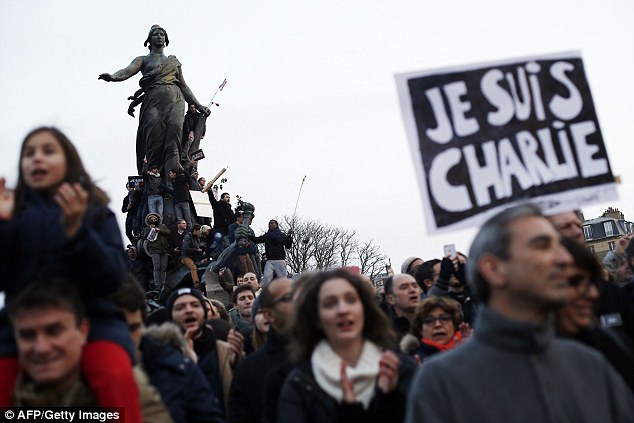 But while westerners were shocked by the attack on free speech, Muslims feel any image of the Prophet Mohamed is an attack on their religion
But while westerners were shocked by the attack on free speech, Muslims feel any image of the Prophet Mohamed is an attack on their religion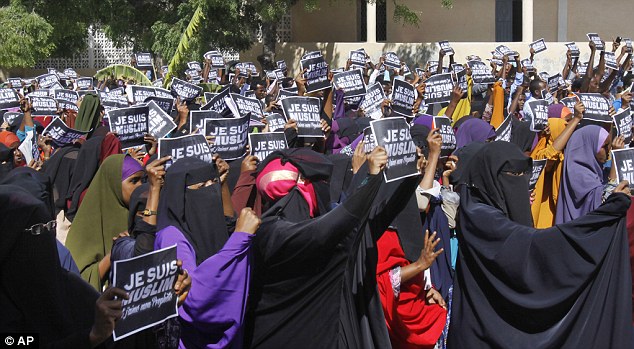 In Pakistan, lawyers burned an effigy of French president Francois Hollande, who today said those taking part in the protests 'did not understand our attachment to freedom of speech'
In Pakistan, lawyers burned an effigy of French president Francois Hollande, who today said those taking part in the protests 'did not understand our attachment to freedom of speech'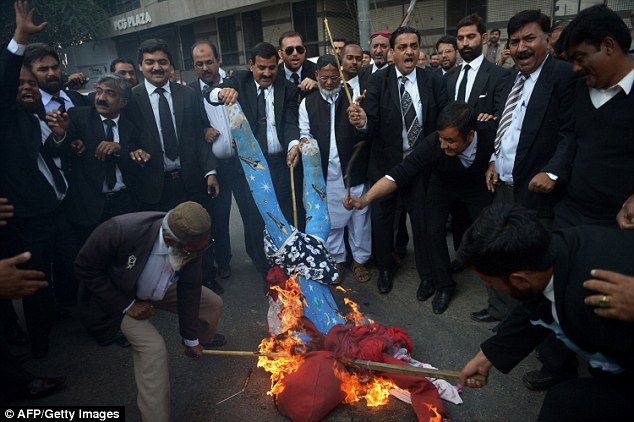 The lawyers, dressed in smart suits, were out in force on Saturday morning, as Pakistani activists from Tanzeem-e-Islami lined the streets with signs declaring 'We condemn anti-Islam acts'. These protests a day after Pakistani authorities had to use tear gas, batons and water cannons to disperse angry crowds. The crowds were said to be trying to force their way into the French consulate.French flags have been burnt in the northwest city of Peshawar and central Multan and rallies have also been held in the capital Islamabad and the eastern city of Lahore.On Thursday, Prime Minister Nawaz Sharif had led parliament in condemning the cartoons published by the magazine whose officers were attacked last week, resulting in the deaths of 12 people.Religious leaders had also called for the magazine's journalists to be hanged and urged their followers to join the protests.The march of the lawyers was a continuation of marches which took place around Pakistan on Friday
The lawyers, dressed in smart suits, were out in force on Saturday morning, as Pakistani activists from Tanzeem-e-Islami lined the streets with signs declaring 'We condemn anti-Islam acts'. These protests a day after Pakistani authorities had to use tear gas, batons and water cannons to disperse angry crowds. The crowds were said to be trying to force their way into the French consulate.French flags have been burnt in the northwest city of Peshawar and central Multan and rallies have also been held in the capital Islamabad and the eastern city of Lahore.On Thursday, Prime Minister Nawaz Sharif had led parliament in condemning the cartoons published by the magazine whose officers were attacked last week, resulting in the deaths of 12 people.Religious leaders had also called for the magazine's journalists to be hanged and urged their followers to join the protests.The march of the lawyers was a continuation of marches which took place around Pakistan on Friday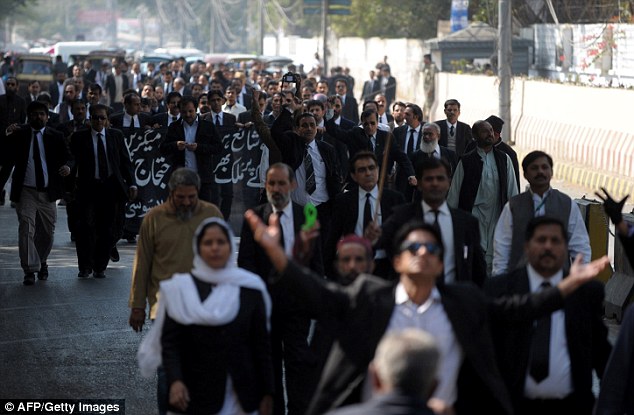
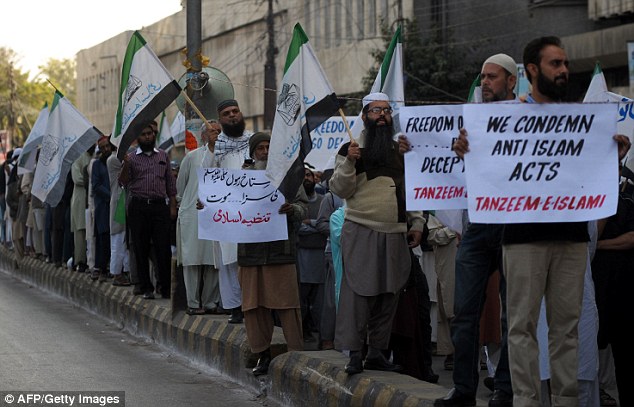 There had also been protests in Senegal, Mali, Muaritania and Algeria after Friday prayers, as well as in Jordan, where clashes broke out between security forces and about 2,000 protesters organised by the Muslim Brotherhood.But French President Francois Hollande dismissed the protests, saying anti-Charlie Hebdo protesters in other countries do not understand France's attachment to freedom of speech.In Niger - a day after five people were killed in Niger in protests over the cartoons - protesters in Niamey attacked a police station and burned at least two police cars near the main mosque after authorities banned a meeting called by local Muslim leadProtesters burned represenations of French flags as Pakisatani officials tried to get them under control using tear gas, batons and water cannons
There had also been protests in Senegal, Mali, Muaritania and Algeria after Friday prayers, as well as in Jordan, where clashes broke out between security forces and about 2,000 protesters organised by the Muslim Brotherhood.But French President Francois Hollande dismissed the protests, saying anti-Charlie Hebdo protesters in other countries do not understand France's attachment to freedom of speech.In Niger - a day after five people were killed in Niger in protests over the cartoons - protesters in Niamey attacked a police station and burned at least two police cars near the main mosque after authorities banned a meeting called by local Muslim leadProtesters burned represenations of French flags as Pakisatani officials tried to get them under control using tear gas, batons and water cannons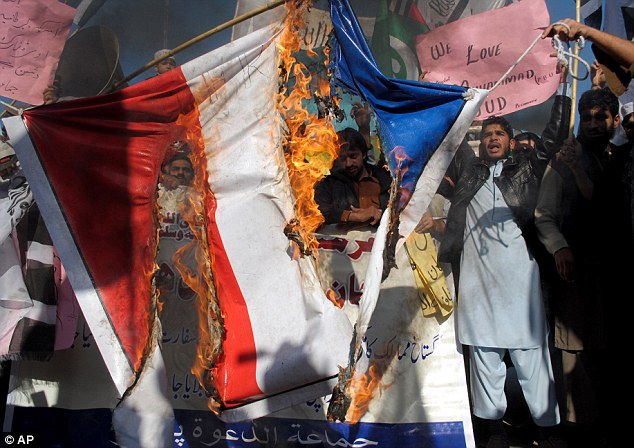
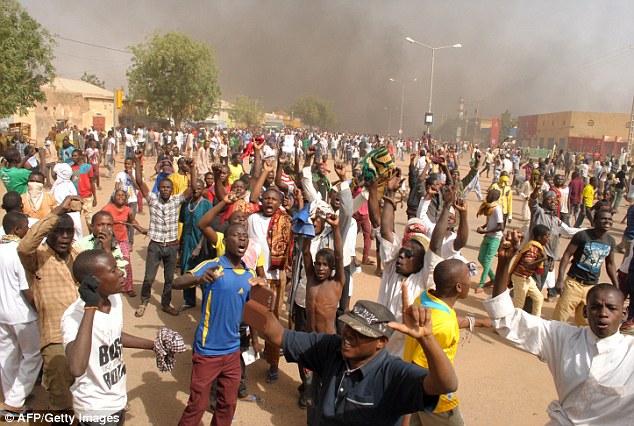 'There are tensions abroad where people don't understand our attachment to the freedom of speech,' Hollande said. 'We've seen the protests, and I would say that in France all beliefs are respected.'He added France had supported 'these countries' in the fight against terrorism. 'I still want to express my solidarity (towards them), but at the same time France has principles and values, in particular freedom of expression,' he said.Hollande's country has been left in shock after the three days of violence, which started with the attack on the Charlie Hebdo offices, in which 12 died, including the editor.A young police officer was shot dead in the street the next day, while four more people were killed when they were taken hostage in a Jewish supermarket on the final day, last Friday.Three of the gunmen were killed in shoot outs with police: brothers Cherif and Said Kouachi, who carried out the magazine attack, and Amedy Coulibaly, who was in the supermarket. A lawyer for one of the brothers said the man had been buried in the eastern city of Reims in an unmarked grave so as not to attract admirers.A number of anti-terror raids have been carried out across Europe in response to the attacks - including one in Belgium where two suspected jihadists were thought to be planning their own Charlie Hebdo-style attack.Both were killed in a firefight with officers. SOURCE: http://www.dailymail.co.uk/Pakistani protesters shout slogans against the printing of images of the Prophet Muhammed in Lahore
'There are tensions abroad where people don't understand our attachment to the freedom of speech,' Hollande said. 'We've seen the protests, and I would say that in France all beliefs are respected.'He added France had supported 'these countries' in the fight against terrorism. 'I still want to express my solidarity (towards them), but at the same time France has principles and values, in particular freedom of expression,' he said.Hollande's country has been left in shock after the three days of violence, which started with the attack on the Charlie Hebdo offices, in which 12 died, including the editor.A young police officer was shot dead in the street the next day, while four more people were killed when they were taken hostage in a Jewish supermarket on the final day, last Friday.Three of the gunmen were killed in shoot outs with police: brothers Cherif and Said Kouachi, who carried out the magazine attack, and Amedy Coulibaly, who was in the supermarket. A lawyer for one of the brothers said the man had been buried in the eastern city of Reims in an unmarked grave so as not to attract admirers.A number of anti-terror raids have been carried out across Europe in response to the attacks - including one in Belgium where two suspected jihadists were thought to be planning their own Charlie Hebdo-style attack.Both were killed in a firefight with officers. SOURCE: http://www.dailymail.co.uk/Pakistani protesters shout slogans against the printing of images of the Prophet Muhammed in Lahore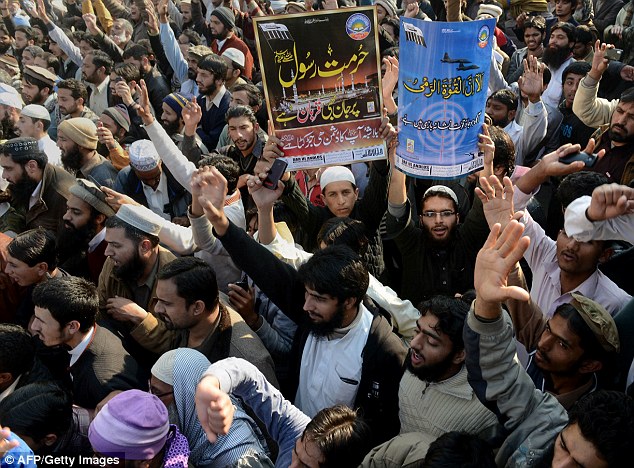
-
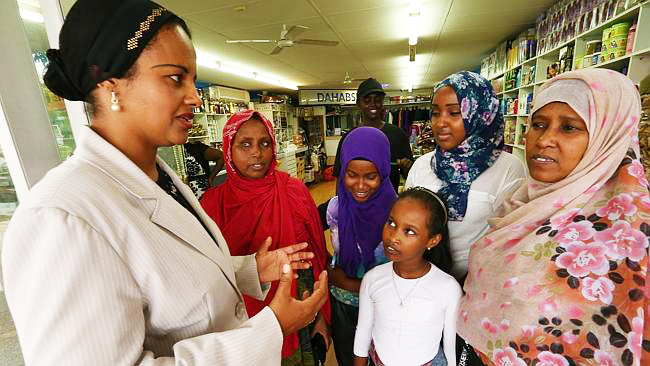 QUEENSLAND is full of blow-ins, people who’ve arrived from somewhere else in Australia or overseas, but no candidate in this election comes close to have the background of Leila Abukar, the Liberal National Party candidate for Yeerongpilly on Brisbane’s southside.Thirty years ago, at the age of 12, she and some family members were taken from their home in the Somali capital, Mogadishu, and piled into a Land Cruiser while bullets rained around them and her father and eldest brother were shot dead.After a week’s walk, she and her mother found a UN truck and started the long process of resettlement until she arrived in Australia in 1997; since then, she has worked as an interpreter, social worker and political staffer.“When I first came to Brisbane I was very active socially, I got out a lot and met a lot of people, and the Liberal Party were very welcoming and respectful, so I joined them,” she said.“Since then I have worked with a lot of organisations doing community work. I believe very strongly in grassroots work, helping young people get jobs, things like that.“But I am a very proud Queenslander — my birthday is Queensland Day, June 6, so I have a double celebration then for this place which has given me so much.”Ms Abukar was settled in Moorooka in the electorate of Yeerongpilly when she arrived, and while she may be unique as a political candidate, she’s not unique in the area.Yeerongpilly is probably the most multicultural electorate in Queensland, with people from Somalia and places such as Sudan, Ethiopia, Eritrea, Congo, Sierra Leone and Liberia.Moorooka Shopping Centre, one of the most “whitebread” of shopping centres 10 years ago, has a substantial Sudanese presence in particular.Whether all this will give Ms Abukar a big advantage is debatable.While she is the LNP candidate, she was not the candidate when it was won by the LNP at the last election, the man elected as the LNP member at that time being Carl Judge.Mr Judge resigned from the LNP in protest over the mass sackings in the public service and joined the Palmer United Party, indicating he would be standing for the PUP on the Sunshine Coast against Attorney-General Jarrod Bleijie in this election.He changed his mind again, resigned from the PUP and is back standing as an independent in this election.This sort of track record is hardly going to endear him to his constituents and, notwithstanding Ms Akubar’s grip on the ethnic vote, the seat looks as though it will be a difficult one for the LNP to hold, given its margin is 1.5 per cent.The ALP candidate is Mark Bailey, who previously represented the area in the Brisbane City Council.He said there had been a change “in the ethnic make-up of the area in the past five years … but it’s not that big a factor. Everywhere I go there are people unhappy with Campbell Newman and his program of slashing services and public servants and I’ve been getting a positive response from all across the electorate, including ethnic groups”.The Greens, who won 16 per cent of the primary vote in 2012, are running community development worker Gillian Marshall-Pierce, while the PUP is running social worker Georgina Walton.Source: http://www.theaustralian.com.au/
QUEENSLAND is full of blow-ins, people who’ve arrived from somewhere else in Australia or overseas, but no candidate in this election comes close to have the background of Leila Abukar, the Liberal National Party candidate for Yeerongpilly on Brisbane’s southside.Thirty years ago, at the age of 12, she and some family members were taken from their home in the Somali capital, Mogadishu, and piled into a Land Cruiser while bullets rained around them and her father and eldest brother were shot dead.After a week’s walk, she and her mother found a UN truck and started the long process of resettlement until she arrived in Australia in 1997; since then, she has worked as an interpreter, social worker and political staffer.“When I first came to Brisbane I was very active socially, I got out a lot and met a lot of people, and the Liberal Party were very welcoming and respectful, so I joined them,” she said.“Since then I have worked with a lot of organisations doing community work. I believe very strongly in grassroots work, helping young people get jobs, things like that.“But I am a very proud Queenslander — my birthday is Queensland Day, June 6, so I have a double celebration then for this place which has given me so much.”Ms Abukar was settled in Moorooka in the electorate of Yeerongpilly when she arrived, and while she may be unique as a political candidate, she’s not unique in the area.Yeerongpilly is probably the most multicultural electorate in Queensland, with people from Somalia and places such as Sudan, Ethiopia, Eritrea, Congo, Sierra Leone and Liberia.Moorooka Shopping Centre, one of the most “whitebread” of shopping centres 10 years ago, has a substantial Sudanese presence in particular.Whether all this will give Ms Abukar a big advantage is debatable.While she is the LNP candidate, she was not the candidate when it was won by the LNP at the last election, the man elected as the LNP member at that time being Carl Judge.Mr Judge resigned from the LNP in protest over the mass sackings in the public service and joined the Palmer United Party, indicating he would be standing for the PUP on the Sunshine Coast against Attorney-General Jarrod Bleijie in this election.He changed his mind again, resigned from the PUP and is back standing as an independent in this election.This sort of track record is hardly going to endear him to his constituents and, notwithstanding Ms Akubar’s grip on the ethnic vote, the seat looks as though it will be a difficult one for the LNP to hold, given its margin is 1.5 per cent.The ALP candidate is Mark Bailey, who previously represented the area in the Brisbane City Council.He said there had been a change “in the ethnic make-up of the area in the past five years … but it’s not that big a factor. Everywhere I go there are people unhappy with Campbell Newman and his program of slashing services and public servants and I’ve been getting a positive response from all across the electorate, including ethnic groups”.The Greens, who won 16 per cent of the primary vote in 2012, are running community development worker Gillian Marshall-Pierce, while the PUP is running social worker Georgina Walton.Source: http://www.theaustralian.com.au/ -
AFGOOYE, Somalia — Armed with machetes, the men push their way through the densely packed rows of trees, emerging every few minutes with large bundles of green bananas over their shoulders.
A guard, his chest crossed with bullet belts, his hands cradling a Russian-made rifle, scans the tree line for intruders as the men throw the bananas on a trailer before dashing back into the plantation for another load.
When the trailer is piled high with bananas, it is pulled by tractor to a nearby warehouse, where the fruit is sorted and boxed for transport to destinations across Somalia and as far away as the Middle East.
After years of warfare that decimated an industry that was once the largest in Africa, the banana is making a tentative comeback in Somalia. Farms are stepping up production and eyeing overseas markets that have been dormant for years.
“Last April we exported to Saudi Arabia for the first time in 23 years,” said Kamal Haji Nasir, 30, whose father, owns this plantation in Afgooye, a town on the Shebelle River, about 45 minutes’ drive from Mogadishu. “We are excited and hopeful.”
Afgooye
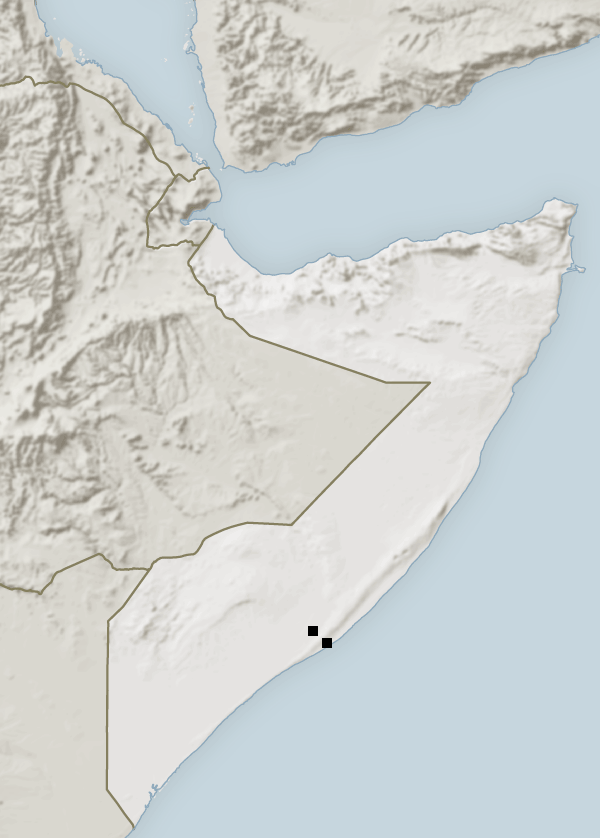
For more than two decades, Somalia was the epitome of a failed state — a country rife with war, anarchy, famine, piracy and terrorism. Many of those problems persist — there has been a recent surge in attacks by Shabab militants, the government is riven with infighting and the United Nations has been warning of a growing risk of famine — but the country has nonetheless made some progress in the past few years.
Somalia elected a new president and adopted a constitution in 2012, bringing some stability, and attracting pledges of aid from international donors. Somali pirates, who once threatened international shipping in the Indian Ocean, have largely been contained and the Shabab have lost their grip over many towns.
“By any measure, Somalia today is in a better situation than it has been for the past 23 years,” said Nicholas Kay, the United Nations’ special representative for Somalia.
That stability has allowed farmers like Mr. Nasir, who studied agriculture at Mogadishu University, to return to a business that has been in his family for four generations.
Banana farming was brought to the fertile Shebelle and Juba river basins in the southern part of the country by Italian colonists in the 1920s. Soon, bananas became a major staple of Somali cuisine, consumed with rice or pasta, or just as a fruit, and farmers began exporting to Italy and the Middle East. With investment by Italian and American fruit companies, the banana trade reached its peak in the 1980s, led by the brand Somalita, which was partly owned by De Nadai, an Italian company. In 1990, Somalia’s banana exports were worth $96 million, according to Mohamood Abdi Noor, a former World Bank agricultural expert.
“The industry was doing very well and moving forward,” said Hasan Haji Osman, an agricultural consultant, who previously worked for Italian and Somali fruit companies.
That all came to a halt when civil war broke out in 1991. The government collapsed, and Somalia became a battleground in which warlords and Islamic extremists vied for control and pirates became the scourge of the surrounding seas. In what became known as “the banana wars,” rival warlords fought to control exports of the fruit as a source of hard currency. The once-thriving banana industry fell apart. Irrigation systems were damaged, plantations were abandoned, farmers were displaced, and storage facilities and ports were destroyed.
Mr. Osman shook his head sadly as he recalled farms lying damaged and unattended.
“What was in my head were the banana farms with no workers” and with destroyed irrigation systems, he said. “I was thinking about that more than my family.”
For those who continued to farm, the breakdown of supply chains and transport links proved to be disastrous. “There were no markets for our bananas,” said Abu Bakr Hirabe, 70, who has been farming bananas in Afgooye for decades. “We lost a lot of money.”
As the security situation began improving a few years ago, Mr. Hirabe, along with other banana farmers, set about trying to rebuild the industry. They repaired irrigation systems, hired workers and security guards and set their sights on markets overseas. In 2011 they established a company, FruitSome, to market and export their bananas.
Mr. Hirabe said FruitSome had contacted Del Monte, Dole and fruit companies in the Middle East, but the response so far has been mixed.
PhotoThe bananas harvested in Afgooye are sent to destinations as far away as the Middle East.CreditDaniel Berehulak for The New York Times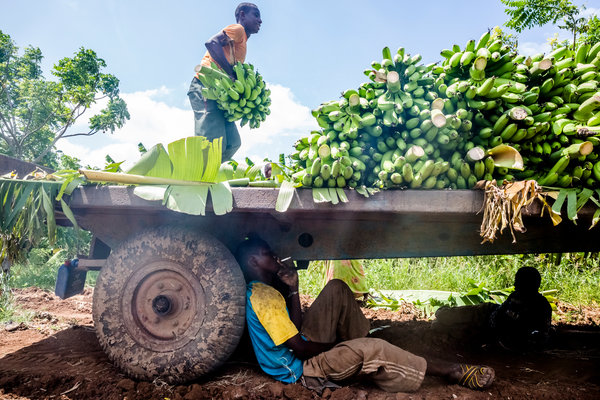
Dole, which has in the past invested there, said it was cautious about committing to Somalia.
“The Somali banana industry has potential,” Xavier Roussel, the marketing and communication director at Dole Fresh Fruit Europe in Hamburg, Germany, said in an email. But, he added, “right now it seems difficult to develop any agriculture program in Somalia because of the local situation.”
The banana farmers, however, have had some success connecting with regional buyers, with some help from the United Nations Food and Agriculture Organization.
The F.A.O. helped organize a conference in Dubai this year at which Somali businesses exhibited their goods to an international audience for the first time in years. FruitSome had its bananas on display.
“We let them taste them and they were surprised,” said Omar Farah, a FruitSome representative. “Some asked us, ‘How can we order this?’ ”
Since then, FruitSome has exported five containers to the Middle East and hopes that some of the contacts forged at the conference will yield further gains.
Somali bananas, experts say, have several advantages that make them marketable, including easy and short access to seaports from farms and proximity to markets in the Middle East.
And, aficionados say, they taste great.
“Sweet, slightly sour, creamy vanilla,” is how Edward Baars, an agricultural engineer with Cgiar, a group of research organizations, described their taste. “The quality of Somali bananas is near unmatched in taste and texture, which is due to the unique growing conditions.”
Despite that, experts say that considerable issues need to be addressed before Somalia can once again become a leading banana exporter. Mr. Noor said that irrigation and drainage systems, roads and storage facilities all needed to be improved, as did quality control and packaging. And, he added, security was still an issue.
Jose Lopez of the Food and Agriculture Organization said the country needed to attract more private investment to rebuild the industry.
Mr. Farah of FruitSome, however, said he was optimistic about the future.
“When you try a Somali banana,” he said, “you can tell the difference.”
Source: http://www.nytimes.com
http://www.somaliaonline.com/after-years-of-warfare-that-decimated-an-industry-that-was-once-the-largest-in-africa-the-banana-is-making-a-comeback-in-somalia/ -
Royal Mail parcel sorters had to seek permission to use the toilet - and their visits were timed, an employee has claimed.Details of a "bullying" regime were outlined by a staff member who told an employment tribunal on Tuesday that she was also banned from attending prayers.Somali-born Shamin Husen, 30, claimed that her "bullying boss" made her life hell at the Royal Mail depot in Langley, Berks, which sorts parcels coming into the UK from Heathrow airport.She told the tribunal that she was bullied and singled out by manager Talib Hussain.In her witness statement, she said: "Talib was horrible."He bullied me, harassed me, intimidated me and victimised me most of the time."Mrs Husen claimed she was made to feel like she could not go to the toilet because her manager would time how long she was gone and he allegedly stopped her from attending prayers when other Muslims were not challenged.The tribunal heard that Mrs Husen first encountered problems with her manager in December 2013, when he stopped her from going to the toilet.Representing Royal Mail, Bridget Tokhai said: "You claim Mr Hussain stopped you when you went to the toilet and monitored how long you were in the toilet."You say this was all part of him maintaining a watch over you."On what basis, apart from the fact that you are a woman and a Muslim, were you made to feel discriminated against?"Mrs Husen, from Hounslow, replied: "Because he would not stop men visiting the toilet."The tribunal heard that Mr Hussain took on the role of manager in October 2013, when he asked everyone to tell him when they were leaving the work area, whether it was for a smoking break, a comfort break or to attend prayers.It is alleged he challenged Mrs Husen when she returned from a toilet break because he believed she had been gone for around 20 minutes.Ms Tokhai said: "Mr Hussain says in his statement he would make a mental note if someone was absent from the floor."That is not the same as keeping a watch over someone excessively, is it?"He is entitled to ask the question if he believed you were away for too long. He didn't stop you from going to the toilet."Mrs Husen replied: "He did."The tribunal heard Mrs Husen had joined Royal Mail in 2007 and worked as a manual sorter at the Heathrow Worldwide Distribution Centre in Langley, Berks.
©2015 Kerry Davies/INS News Agency LtdDiscrimination claim: Shamin Husen, 30 She claims she was subjected to sexual and religious discrimination by Mr Hussain and the Royal Mail group.Ms Tokhai said: "What the evidence suggests is that Mr Hussain did not single you out."You were all expected to tell him when you left the floor."One month later, in January 2014, Mr Hussain allegedly stopped Mrs Husen on her way to prayers.Ms Tokhai said: "You say you were not able to perform prayers even though other Muslims were going without asking permission."What else, apart from the fact you are a woman and a Muslim, made you feel discriminated against?'Mrs Husen replied: "I was the only Somali, the only Muslim, in that area."Ms Tokhai said: "Mr Husen says the reason he challenged you is because you failed to tell him where you were going."Mrs Husen replied: "For that particular prayer time, yes.'Ms Tokhai said: "As you left the floor without his permission, was that not a reason for him to challenge you?"Mrs Husen replied: "Yes, but he did not ask others and others did not ask permission."Ms Tokhai said Mr Hussain had not singled her out based on her sex or religion.When pushed on whether this was correct, Mrs Husen replied: "Yes."The tribunal also heard Mr Hussain allegedly gave Mrs Husen "unreasonable" targets.However, Ms Tokhai said: "You were not the only one who was challenged for your performance."Others were challenged and they were not Muslim employees."Mrs Husen replied: "Yes."In March 2014, Mr Hussain allegedly isolated Mrs Husen from her colleagues by moving her to a different department.The tribunal heard it was common practice for staff to be moved around and Ms Tokhai said: "He did not move you to isolate you, he moved you because an extra pair of hands was needed."Your sex and religion has nothing to do with it."Mrs Husen replied: "It has."Judge Andrew Gumbiti-Zimuto said: "You say you were moved several times because of your sex and your religion."Do you accept when you were moved there was a legitimate need for you or someone else to be moved at that time?"Mrs Husen replied: "No. There was a procedure which was not being followed."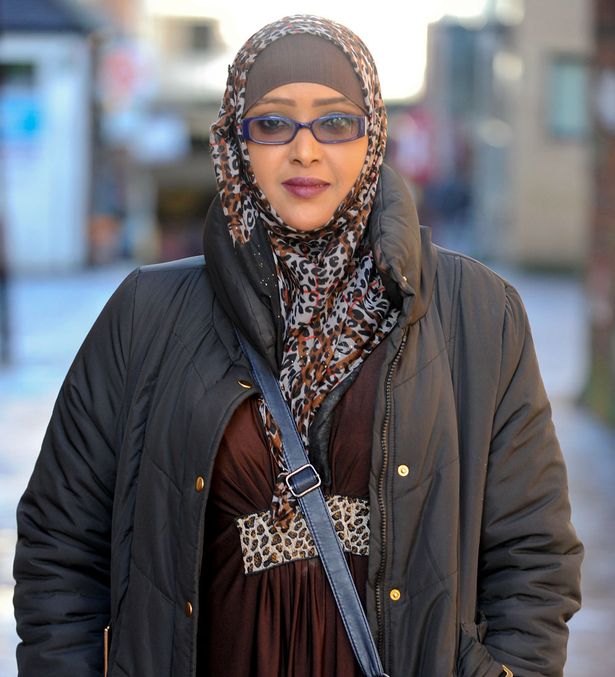 ©2015 Kerry Davies/INS News Agency LtdWork tribunal: The Royal Mail depot in Langley, Berks A colleague of Mrs Husen broke down in tears on Tuesday when she recounted what her friend had gone through.Bing Wang became emotional as she relived the moment she was also stopped by manager Talib Hussain while returning from the toilet.She told the hearing: "He bullied me too."When he saw I was with Shamin, he stopped me too."All of it made me so stressed I asked to be moved to another area."Ms Wang added: "Except for Shamin, he would never ask other people."He wouldn't stop other people."Ms Wang told the tribunal she was returning from a toilet break with Mrs Husen in November 2013 when Mr Hussain stopped both of them and challenged them about how long they had taken.Ms Tokhai said: "On the face of it, you had your own disagreements with Mr Hussain, so you cannot give an objective view can you?"Through tears, Ms Wang replied: "I can. What he did was wrong."Earlier, the tribunal heard from another employee, Rakmita Talwar, who said: "Shamin said she did not want to go to the toilet because she did not want to be conduct coded."She was scared of Talib."He always stopped her."I cried about it."I felt stressed for what she was going through."It made me feel like, why is this happening?"Ms Tokhai said: "You said Mr Hussain was a bully , so how can you give an unbiased opinion?"Ms Talwar replied: "It is not biased."I felt scared he might start to do it to me as well."Another colleague, Eric Darpoh, who worked in the dispatch area, told the tribunal he saw the manager stop Mrs Husen from going to prayer.He said: "It seemed like he picked on her."I spoke to him and said you can't single out certain people but he carried on."Ms Tokhai said: "You say he used to glare at you."So he watched and monitored you too?"Mr Darpoh replied: "He wanted to target us."The tribunal heard Mr Hussain no longer worked at Royal Mail.Michael Duodo, a colleague and union representative at Royal Mail since 2005, said: "I was informed the manager had stopped Shamin Husen from going to the toilet."I raised the issue with him and he admitted it."He was of the view that it was right for a manager to stop people from going to the toilet or to prayers, so I had to explain to him that at Royal Mail, we don't do that."Ms Tokhai said: "Did you witness Mr Hussain stopping Mrs Husen from going to prayers or to the toilet?"Mr Duido replied: "No."The tribunal, in Reading, Berks, continues.Source: http://www.mirror.co.uk/
©2015 Kerry Davies/INS News Agency LtdWork tribunal: The Royal Mail depot in Langley, Berks A colleague of Mrs Husen broke down in tears on Tuesday when she recounted what her friend had gone through.Bing Wang became emotional as she relived the moment she was also stopped by manager Talib Hussain while returning from the toilet.She told the hearing: "He bullied me too."When he saw I was with Shamin, he stopped me too."All of it made me so stressed I asked to be moved to another area."Ms Wang added: "Except for Shamin, he would never ask other people."He wouldn't stop other people."Ms Wang told the tribunal she was returning from a toilet break with Mrs Husen in November 2013 when Mr Hussain stopped both of them and challenged them about how long they had taken.Ms Tokhai said: "On the face of it, you had your own disagreements with Mr Hussain, so you cannot give an objective view can you?"Through tears, Ms Wang replied: "I can. What he did was wrong."Earlier, the tribunal heard from another employee, Rakmita Talwar, who said: "Shamin said she did not want to go to the toilet because she did not want to be conduct coded."She was scared of Talib."He always stopped her."I cried about it."I felt stressed for what she was going through."It made me feel like, why is this happening?"Ms Tokhai said: "You said Mr Hussain was a bully , so how can you give an unbiased opinion?"Ms Talwar replied: "It is not biased."I felt scared he might start to do it to me as well."Another colleague, Eric Darpoh, who worked in the dispatch area, told the tribunal he saw the manager stop Mrs Husen from going to prayer.He said: "It seemed like he picked on her."I spoke to him and said you can't single out certain people but he carried on."Ms Tokhai said: "You say he used to glare at you."So he watched and monitored you too?"Mr Darpoh replied: "He wanted to target us."The tribunal heard Mr Hussain no longer worked at Royal Mail.Michael Duodo, a colleague and union representative at Royal Mail since 2005, said: "I was informed the manager had stopped Shamin Husen from going to the toilet."I raised the issue with him and he admitted it."He was of the view that it was right for a manager to stop people from going to the toilet or to prayers, so I had to explain to him that at Royal Mail, we don't do that."Ms Tokhai said: "Did you witness Mr Hussain stopping Mrs Husen from going to prayers or to the toilet?"Mr Duido replied: "No."The tribunal, in Reading, Berks, continues.Source: http://www.mirror.co.uk/
-
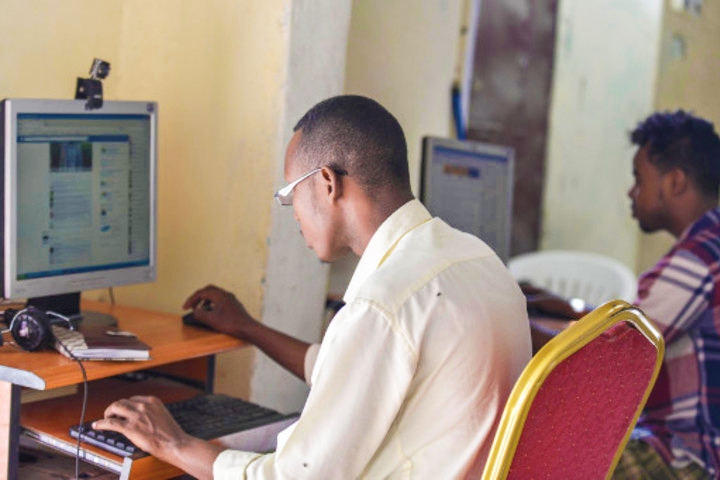 Somalia has blocked more than 20 fraudulent social media accounts impersonating government officials and ministries over the past year, Ministry of National Security spokesperson Mohamed Yusuf Osman told Sabahi.The move follows an increase in the number of counterfeit Facebook and Twitter accounts that purport to represent members of the Somali government, he said, adding that the ministry has since established that the blocked accounts were opened from outside the country."We have prevented many problems by the groups whose intention is to spread lies through social media using the names of government officials," Osman said. "We have communicated with many allies who support Somalia in that area. We succeeded in tackling some and we are still working on others."Somalia is not alone in tackling government impersonators on social media. Many foreign government officials also fall prey to impersonators and hackers, he said, but they have employees trained to address these issues."Since our country was destroyed over 20 years [ago], we do not have the capability to do that work," Osman said. "It is not shameful that we do not have that capability, but there are efforts under way to train people for us on those issues."Until Somalia reaches that point, it will have to rely on its allies for help in this area, he said.Osman declined to give details on the foreign governments helping Somalia suspend fake accounts, but he said they succeeded in closing Facebook and Twitter accounts impersonating several ministries, including the ministries of national security, foreign affairs, information and justice.They also are investigating a Facebook page impersonating the National Intelligence and Security Agency, he said.In the meantime, the Somali government makes every effort to alert the public whenever it finds fraudulent social media accounts claiming to represent Somali officials, Osman said."People can identify [fraudulent accounts] because we immediately issue a denial and address them," he said. "They do not have a great impact on us."Osman cautioned, however, that if the fraudulent accounts are not dealt with swiftly, hackers could be emboldened to attack the emails of government officials and ministries, as has happened in other countries.It is possible al-Shabaab is behind the fake Facebook and Twitter accounts and is using them to spread rumors about the country's leaders and ministries in an attempt to mislead the public and diminish citizens' support for the government, he added.Somali government spokesperson Ridwan Haji Abdiweli said the number of fraudulent social media accounts increases during periods of transition and transfers in leadership."We are aware that many names are used in accounts on Facebook and Twitter, such as the name of the previous Prime Minister Abdiweli Sheikh Ahmed, and we tell people that they are fake when they send us inquiries," he told Sabahi."It seems like the impersonators think their lies are more believable during times when the public has a high interest in news, such as when ministers are being named and when a prime minister is vacating the post and a new one is coming," he said.
Somalia has blocked more than 20 fraudulent social media accounts impersonating government officials and ministries over the past year, Ministry of National Security spokesperson Mohamed Yusuf Osman told Sabahi.The move follows an increase in the number of counterfeit Facebook and Twitter accounts that purport to represent members of the Somali government, he said, adding that the ministry has since established that the blocked accounts were opened from outside the country."We have prevented many problems by the groups whose intention is to spread lies through social media using the names of government officials," Osman said. "We have communicated with many allies who support Somalia in that area. We succeeded in tackling some and we are still working on others."Somalia is not alone in tackling government impersonators on social media. Many foreign government officials also fall prey to impersonators and hackers, he said, but they have employees trained to address these issues."Since our country was destroyed over 20 years [ago], we do not have the capability to do that work," Osman said. "It is not shameful that we do not have that capability, but there are efforts under way to train people for us on those issues."Until Somalia reaches that point, it will have to rely on its allies for help in this area, he said.Osman declined to give details on the foreign governments helping Somalia suspend fake accounts, but he said they succeeded in closing Facebook and Twitter accounts impersonating several ministries, including the ministries of national security, foreign affairs, information and justice.They also are investigating a Facebook page impersonating the National Intelligence and Security Agency, he said.In the meantime, the Somali government makes every effort to alert the public whenever it finds fraudulent social media accounts claiming to represent Somali officials, Osman said."People can identify [fraudulent accounts] because we immediately issue a denial and address them," he said. "They do not have a great impact on us."Osman cautioned, however, that if the fraudulent accounts are not dealt with swiftly, hackers could be emboldened to attack the emails of government officials and ministries, as has happened in other countries.It is possible al-Shabaab is behind the fake Facebook and Twitter accounts and is using them to spread rumors about the country's leaders and ministries in an attempt to mislead the public and diminish citizens' support for the government, he added.Somali government spokesperson Ridwan Haji Abdiweli said the number of fraudulent social media accounts increases during periods of transition and transfers in leadership."We are aware that many names are used in accounts on Facebook and Twitter, such as the name of the previous Prime Minister Abdiweli Sheikh Ahmed, and we tell people that they are fake when they send us inquiries," he told Sabahi."It seems like the impersonators think their lies are more believable during times when the public has a high interest in news, such as when ministers are being named and when a prime minister is vacating the post and a new one is coming," he said.Improving cyber security
Yasmin Abdi, 23, who studied computer science at Mogadishu's Benadir University, said the Somali government must prioritise cyber security."It is necessary for the Somali government to first focus on managing Somalia's internet, so that it can block fake pages and even the websites extremists use to spread news that can pose a danger to the nation's security," she told Sabahi.It is a huge victory for the government to succeed in blocking 20 fraudulent social media accounts, she added."It is a step that shows the government is ready to secure its data and that can lead the groups behind the fake accounts to be afraid of engaging in such acts," Abdi said.Ali Farah, 35, who owns an internet café in Hamar Weyne district, said people who create fraudulent social media accounts are ignorant about Islam.Farah praised the Ministry of National Security for taking on the responsibility of tackling the fraudulent accounts that are propagating on social media and misappropriating the names of Somali government ministries and leaders."Lying is a sin for us as Muslims. Therefore, I can say that someone who does not realise that is ignorant," he told Sabahi. "I would advise the people who are busy lying about government officials and famous people to fear God and refrain from misleading people."Source: http://sabahionline.com -
 Before graduating from Ohio State University in the spring, Abdilahi Hassan promised himself that he would visit Somalia and, upon his return, start his own business.The 26-year-old made good on both vows. During the summer, he took his first trip to Somalia, where he spent a little more than a month traveling with his grandparents, who emigrated from the African nation.And in November, he opened Hoyo’s Kitchen, a casual restaurant off E. Dublin-Granville Road with food inspired by his mother’s cooking. (The name itself is a reminder of that: Hoyo is the Somali word formom.)The recipes are a combination of those from Hassan’s mother, Hayat Dalmar, and Halimo Alibair, the longtime chef of Solay Bistro, the previous tenant of the strip-mall space.Hassan wants his restaurant to be a gateway into the cuisine with which he grew up. He is hoping that Hoyo seems authentic for Somali regulars and welcoming for newcomers.The beauty of Somali food is that something is bound to seem familiar, regardless of how adventurous of an eater you are. Sambusa (one for $1.25 or 10 for $10) — a flaky, triangle-shaped pastry filled with a choice of ground beef or lamb with onions and garlic, or potatoes and peas — are reminiscent of Indian samosas. Bajiya (five for $3) are akin to falafel.The Somali version is a deliciously aromatic bean mash that has been fried until just crisp on the outside and moist inside.Mostly, food may be ordered one of two ways: as a combo plate ($11 for meat with a drink; $10 for vegetarian) or a bowl ($8 for meat with a drink; $7 for vegetarian). The meat combo includes a choice of a main and two side dishes, while the bowl offers a choice of one side.For vegetarian diners, Hoyo’s has a choice of three sides paired with a choice of Somali flatbreads (including sour injera and thin, pancakelike canjeero, which is a slightly sweeter version of its Ethiopian counterpart), or one side for the bowl.For omnivores, Hoyo’s offers a combo plate with goat, the most authentic meat on the menu. Chunks of soft goat meat are poached in house seasonings and tossed with a traditional Somali sauce (think of a light barbecue spiked with berbere).House-made hot sauces are available to add kick. The sauce with fenugreek and vinegar adds a punch to seafood dishes.The goat is good paired with fata muus, a soft, sweet mixture of flatbread, bananas and honey made savory with a touch of butter.Hoyo’s has a strong choice of vegetarian options. Don’t pass on the daal soup, which is really more of a hearty, aromatic stew.Hoyo’s can be confusing. Customers have the choice to order at the counter at the back of the restaurant or to grab a table and be waited upon.The former is the way Hassan wanted to set up the service, but the latter is customary in the Somali culture.And, although he says the staff is working on picking up the pace of service, it is best to go when you have time to sit back and enjoy the meal and company.While waiting, diners should have time to explore the coffee-shop menu that features a variety of styles of Somali coffees, teas and pastries.In the works is a breakfast menu — a tribute to Hassan’s favorite meal — which will include a dish to rival pancakes.5786 Columbus Square Contact: 614-899-8800 Hours: 10 a.m. to 10 p.m. daily Source: http://www.dispatch.com/
Before graduating from Ohio State University in the spring, Abdilahi Hassan promised himself that he would visit Somalia and, upon his return, start his own business.The 26-year-old made good on both vows. During the summer, he took his first trip to Somalia, where he spent a little more than a month traveling with his grandparents, who emigrated from the African nation.And in November, he opened Hoyo’s Kitchen, a casual restaurant off E. Dublin-Granville Road with food inspired by his mother’s cooking. (The name itself is a reminder of that: Hoyo is the Somali word formom.)The recipes are a combination of those from Hassan’s mother, Hayat Dalmar, and Halimo Alibair, the longtime chef of Solay Bistro, the previous tenant of the strip-mall space.Hassan wants his restaurant to be a gateway into the cuisine with which he grew up. He is hoping that Hoyo seems authentic for Somali regulars and welcoming for newcomers.The beauty of Somali food is that something is bound to seem familiar, regardless of how adventurous of an eater you are. Sambusa (one for $1.25 or 10 for $10) — a flaky, triangle-shaped pastry filled with a choice of ground beef or lamb with onions and garlic, or potatoes and peas — are reminiscent of Indian samosas. Bajiya (five for $3) are akin to falafel.The Somali version is a deliciously aromatic bean mash that has been fried until just crisp on the outside and moist inside.Mostly, food may be ordered one of two ways: as a combo plate ($11 for meat with a drink; $10 for vegetarian) or a bowl ($8 for meat with a drink; $7 for vegetarian). The meat combo includes a choice of a main and two side dishes, while the bowl offers a choice of one side.For vegetarian diners, Hoyo’s has a choice of three sides paired with a choice of Somali flatbreads (including sour injera and thin, pancakelike canjeero, which is a slightly sweeter version of its Ethiopian counterpart), or one side for the bowl.For omnivores, Hoyo’s offers a combo plate with goat, the most authentic meat on the menu. Chunks of soft goat meat are poached in house seasonings and tossed with a traditional Somali sauce (think of a light barbecue spiked with berbere).House-made hot sauces are available to add kick. The sauce with fenugreek and vinegar adds a punch to seafood dishes.The goat is good paired with fata muus, a soft, sweet mixture of flatbread, bananas and honey made savory with a touch of butter.Hoyo’s has a strong choice of vegetarian options. Don’t pass on the daal soup, which is really more of a hearty, aromatic stew.Hoyo’s can be confusing. Customers have the choice to order at the counter at the back of the restaurant or to grab a table and be waited upon.The former is the way Hassan wanted to set up the service, but the latter is customary in the Somali culture.And, although he says the staff is working on picking up the pace of service, it is best to go when you have time to sit back and enjoy the meal and company.While waiting, diners should have time to explore the coffee-shop menu that features a variety of styles of Somali coffees, teas and pastries.In the works is a breakfast menu — a tribute to Hassan’s favorite meal — which will include a dish to rival pancakes.5786 Columbus Square Contact: 614-899-8800 Hours: 10 a.m. to 10 p.m. daily Source: http://www.dispatch.com/ -
World Bulletin / News Desk
A Chinese mining company has been ordered out of Somalia for allegedly conducting illegal mining activity and causing "public turmoil," the Somali government announced on Wednesday."[Chinese mining company] ARC has been involved in the illegal digging and mining for minerals in the Simodi mountain range in Somalia's Awdal region," the government said in a statement.
It added: "These activities violate Somalia's territorial integrity and national sovereignty."
The statement called on the company to "cease its activities responsibly and immediately."
"ARC's activities are not only a violation of Somali laws related to the extraction of natural resources, but also a violation of Somalia's immigration laws, as Chinese nationals are in Somalia illegally where they are conducting activities without work permits," the government asserted.
The government went on to say that the Chinese company had caused "civil turmoil and tension" in its area of operation after introducing "an armed militia to protect its illegally obtained mining acreage."
It also accused the firm of displacing native inhabitants, destroying private property, and harming the local environment.
Somalia's Awdal region is rich in minerals and petroleum and has therefore attracted several international mining firms. Some of these companies, however, are said to be operating on invalid agreements and contracts.
Somali Foreign Minister Abdirahman Duale has already met with Chinese Ambassador Wei Hongtiang to discuss the issue.
Northern Somalia contains numerous deposits of gemstones, natural gas, uranium, tin, iron and petroleum.
Source: http://www.worldbulletin.net/
-
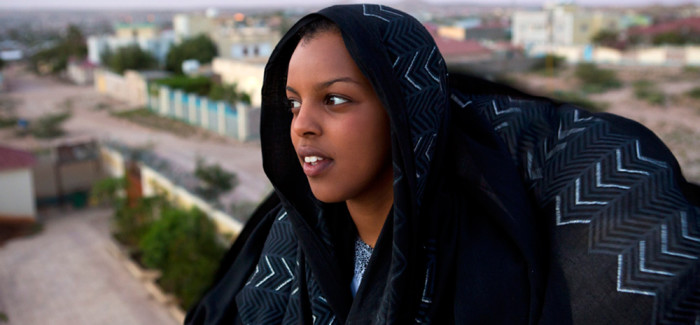 Chris King – If you could introduce yourself, and the project you’re currently working on…Kate Stanworth – I’m Kate Stanworth – I’m a London-based portrait and documentary photographer, and this summer I’ve been working on a new project which is a work in progress, called ‘Somaliland Summer’.I went out to Somaliland where I was working for the Hargeysa International Book Fair, and I stayed on for a couple of weeks extra with the idea of photographing British Somalilanders as they visited the region – to see relatives and spend a summer in Hargeysa.Last year I was looking for a more self-initiated project, and I noticed that the population of the capital city almost doubled during the summer from all the diaspora visiting from across the world. So I thought ‘OK, this is my project’, and the following year – this year – with the help of a friend, I went back and started.Chris King – What drew you into documentary photography?Kate Stanworth - I originally studied fine art, so I was making installations, and was a painter before that. But in some ways being an artist is quite isolating, and I thought that photography was a way to still be working with those same elements – the colour, the composition, the expression of ideas, but then at the same time it allowed me to connect with people – people that I wouldn’t normally meet, and to travel, and to find stories. Whereas my art practice before that was a little more introspective perhaps.I got a job as a picture editor initially for an NGO, and that allowed me to travel a little bit and see how photographers worked, and then I wanted to get more into photography myself, and so that’s the direction I took.CK – How did your Somaliland project come about?KS - In 2012 I managed to get connected with a group who were going out to form the international election observation for the Somaliland elections.Somaliland declared independence from Somalia in 1991 after a civil war, and it’s never been recognised by any other country, but they’ve established a government and a representative democracy there, and relative peace in what is quite an unstable region.A friend of mine had already gone to be an observer for the elections in 2010, and told me all about it and I was really fascinated. And then in 2012 for the local elections they needed a photographer, so I wrote a proposal saying why I wanted to do it, and how I had all these ideas for doing an exhibition afterwards, and this kind of stuff. And in the end they picked me.It was an NGO called Progressio that paid for me to go – they were part of the co-ordination team of the observation. That was a real eye-opener – it was the first time I had been to Africa actually.So I learnt a lot about Somaliland and started making some contacts – one of them being Ayan, who is now a good friend. She runs this brilliant Somali arts organisation called Kayd, and they do the Somali Week Festival in London and also theHargeysa Internation Book Fair in Somaliland – which is this amazing literature and arts festival. I convinced her that they should do a photography element of the festival, so I got involved in that.Basically I’ve been going every year since 2012 – building up all these contacts. That’s how I managed to get the ideas and the contacts to start this Somaliland Summer project, and I hope to go back next year – if I get the funding and everything is arranged, and finish it.
Chris King – If you could introduce yourself, and the project you’re currently working on…Kate Stanworth – I’m Kate Stanworth – I’m a London-based portrait and documentary photographer, and this summer I’ve been working on a new project which is a work in progress, called ‘Somaliland Summer’.I went out to Somaliland where I was working for the Hargeysa International Book Fair, and I stayed on for a couple of weeks extra with the idea of photographing British Somalilanders as they visited the region – to see relatives and spend a summer in Hargeysa.Last year I was looking for a more self-initiated project, and I noticed that the population of the capital city almost doubled during the summer from all the diaspora visiting from across the world. So I thought ‘OK, this is my project’, and the following year – this year – with the help of a friend, I went back and started.Chris King – What drew you into documentary photography?Kate Stanworth - I originally studied fine art, so I was making installations, and was a painter before that. But in some ways being an artist is quite isolating, and I thought that photography was a way to still be working with those same elements – the colour, the composition, the expression of ideas, but then at the same time it allowed me to connect with people – people that I wouldn’t normally meet, and to travel, and to find stories. Whereas my art practice before that was a little more introspective perhaps.I got a job as a picture editor initially for an NGO, and that allowed me to travel a little bit and see how photographers worked, and then I wanted to get more into photography myself, and so that’s the direction I took.CK – How did your Somaliland project come about?KS - In 2012 I managed to get connected with a group who were going out to form the international election observation for the Somaliland elections.Somaliland declared independence from Somalia in 1991 after a civil war, and it’s never been recognised by any other country, but they’ve established a government and a representative democracy there, and relative peace in what is quite an unstable region.A friend of mine had already gone to be an observer for the elections in 2010, and told me all about it and I was really fascinated. And then in 2012 for the local elections they needed a photographer, so I wrote a proposal saying why I wanted to do it, and how I had all these ideas for doing an exhibition afterwards, and this kind of stuff. And in the end they picked me.It was an NGO called Progressio that paid for me to go – they were part of the co-ordination team of the observation. That was a real eye-opener – it was the first time I had been to Africa actually.So I learnt a lot about Somaliland and started making some contacts – one of them being Ayan, who is now a good friend. She runs this brilliant Somali arts organisation called Kayd, and they do the Somali Week Festival in London and also theHargeysa Internation Book Fair in Somaliland – which is this amazing literature and arts festival. I convinced her that they should do a photography element of the festival, so I got involved in that.Basically I’ve been going every year since 2012 – building up all these contacts. That’s how I managed to get the ideas and the contacts to start this Somaliland Summer project, and I hope to go back next year – if I get the funding and everything is arranged, and finish it.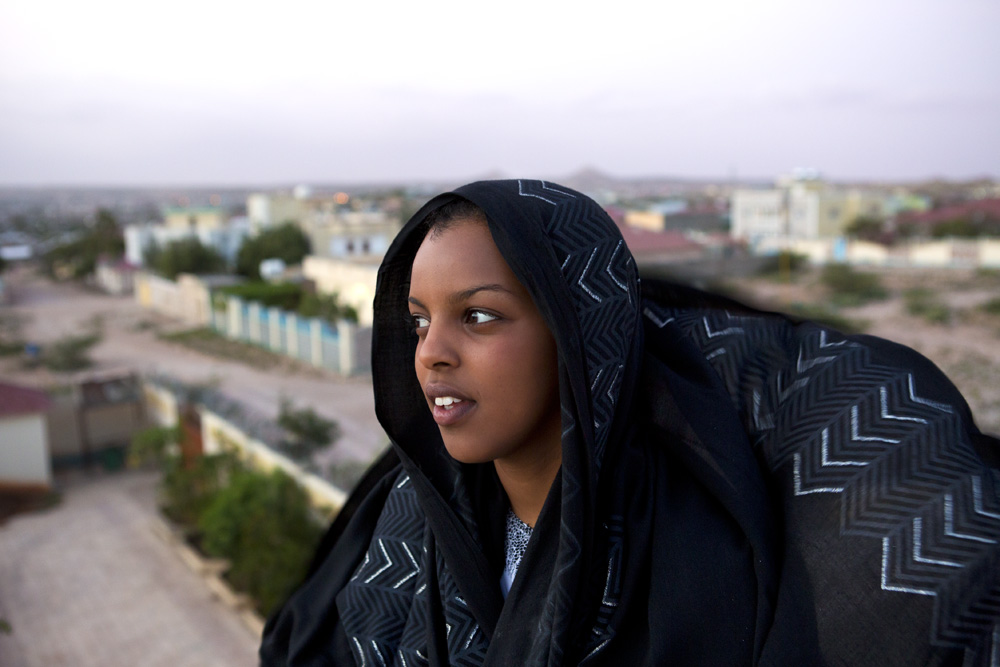 CK – How easy was it to get access to the people and places you visited for the Somaliland Summer project?KS - Getting access is easier when you know people. A driver was arranged for me by the people I had been working with on the book fair. I had people helping me because I was already part of something out there. That makes everything easier really – I knew people who were based there.In terms of making contact with people to be involved in the project, I have a friend, Farah, who I met here in London, who has been great in supporting the project and helping me to find participants.I also sometimes voluntarily take pictures at Somali events – I went to the Somaliland Independence Day events in London, where I met Mohamed, who is another one of my participants in the Somaliland Summer project. Then another I met out there – Nadra, through an anthropologist friend who was working in Somaliland. I think it’s really a case of using your connections – that’s what I aim to do for next year as well.In the past I’ve travelled around. If you’re working with an NGO then you get really easy access – you’ve already got the path laid out for you, but if you’re doing something by yourself, it’s perhaps a bit harder.But I was based on Hargeysa and I didn’t go anywhere else this year, so we just went to people’s houses and hung out in the markets, so it wasn’t hard to access those places.CK – So it’s something you worked on – you built up the contacts, you made strategic decisions to try and get access to people, and then nurtured those relationships?KS - Absolutely, yeah – and I think that kind of lead up was really essential in coming up with the project idea in the first place – thinking ‘Is this a significant thing?’. Because when I first went out there, I was struck by the colour and how everything was really different to Britain in a sense – like you’re in the middle of this dusty desert, and there are goats wandering round in the street. Everything seems so different that a hundred ideas come to you. You’re bombarded with them because everything’s new, but I thought I would just spend a little bit of time getting under the surface and see what people wanted to talk about, and I think it was really that British connection that came home to me when I was there during the summer. I would walk along the street and someone would come up to me and start talking in a Welsh accent about their experience going back for the summer, and how 10 years ago, when they were last here, there was nothing but bombed-out buildings and now there are big shopping malls.The fact that they told me these quite emotional stories was in part because I’m British, so we had that shared background that we live in the same country.I want my project to be seen by a British audience that doesn’t necessarily know anything about Somaliland, or know that there’s a strong Somalilander community here in Britain. We can start with this common ground that we live in the same place, and then move on to talk about their experiences.CK – Do you think in Hargeysa, and Somaliland in general, that this evolution from a bombed-out shell of a state, to a place that has shopping malls and has been regenerated – do you think that’s driven by the diaspora – the British and Western residents who go over there and invest in it.KS - Well you can’t dispute there’s a lot of investment by the diaspora but I think perhaps the most significant rebuilding was probably largely done by the people who were there already. So yeah, I think the diaspora contribution is big, but I don’t think you should underestimate what the people who have been there all along have done, because they were the ones who were camping in their own houses just after the war – when there was absolutely nothing. Their resilience is something really amazing and deserves respect. Although the diaspora do get a lot of credit for contributing – they’ve been amazing as well.CK – What about the economy as a whole – without that income during the summer months, would the state survive without that? Is there a reliance now on that income generated by the presence of the diaspora during the summer months?KS - I’m not sure how much their presence during the summer makes that big a financial contribution – the money people send home throughout the year is likely more important.Barclays were going to pull out their support for the money transfer companies to Somalia and Somaliland. So there’s been a big campaign to rectify that because a lot of Somali families rely on family sending money home from outside. That’s much bigger than aid contributions and I think that’s more important than the money people spend during their summer visits. However you do see more and more new cafes and restaurants opening in Hargeysa that are aimed directly at the diaspora market.
CK – How easy was it to get access to the people and places you visited for the Somaliland Summer project?KS - Getting access is easier when you know people. A driver was arranged for me by the people I had been working with on the book fair. I had people helping me because I was already part of something out there. That makes everything easier really – I knew people who were based there.In terms of making contact with people to be involved in the project, I have a friend, Farah, who I met here in London, who has been great in supporting the project and helping me to find participants.I also sometimes voluntarily take pictures at Somali events – I went to the Somaliland Independence Day events in London, where I met Mohamed, who is another one of my participants in the Somaliland Summer project. Then another I met out there – Nadra, through an anthropologist friend who was working in Somaliland. I think it’s really a case of using your connections – that’s what I aim to do for next year as well.In the past I’ve travelled around. If you’re working with an NGO then you get really easy access – you’ve already got the path laid out for you, but if you’re doing something by yourself, it’s perhaps a bit harder.But I was based on Hargeysa and I didn’t go anywhere else this year, so we just went to people’s houses and hung out in the markets, so it wasn’t hard to access those places.CK – So it’s something you worked on – you built up the contacts, you made strategic decisions to try and get access to people, and then nurtured those relationships?KS - Absolutely, yeah – and I think that kind of lead up was really essential in coming up with the project idea in the first place – thinking ‘Is this a significant thing?’. Because when I first went out there, I was struck by the colour and how everything was really different to Britain in a sense – like you’re in the middle of this dusty desert, and there are goats wandering round in the street. Everything seems so different that a hundred ideas come to you. You’re bombarded with them because everything’s new, but I thought I would just spend a little bit of time getting under the surface and see what people wanted to talk about, and I think it was really that British connection that came home to me when I was there during the summer. I would walk along the street and someone would come up to me and start talking in a Welsh accent about their experience going back for the summer, and how 10 years ago, when they were last here, there was nothing but bombed-out buildings and now there are big shopping malls.The fact that they told me these quite emotional stories was in part because I’m British, so we had that shared background that we live in the same country.I want my project to be seen by a British audience that doesn’t necessarily know anything about Somaliland, or know that there’s a strong Somalilander community here in Britain. We can start with this common ground that we live in the same place, and then move on to talk about their experiences.CK – Do you think in Hargeysa, and Somaliland in general, that this evolution from a bombed-out shell of a state, to a place that has shopping malls and has been regenerated – do you think that’s driven by the diaspora – the British and Western residents who go over there and invest in it.KS - Well you can’t dispute there’s a lot of investment by the diaspora but I think perhaps the most significant rebuilding was probably largely done by the people who were there already. So yeah, I think the diaspora contribution is big, but I don’t think you should underestimate what the people who have been there all along have done, because they were the ones who were camping in their own houses just after the war – when there was absolutely nothing. Their resilience is something really amazing and deserves respect. Although the diaspora do get a lot of credit for contributing – they’ve been amazing as well.CK – What about the economy as a whole – without that income during the summer months, would the state survive without that? Is there a reliance now on that income generated by the presence of the diaspora during the summer months?KS - I’m not sure how much their presence during the summer makes that big a financial contribution – the money people send home throughout the year is likely more important.Barclays were going to pull out their support for the money transfer companies to Somalia and Somaliland. So there’s been a big campaign to rectify that because a lot of Somali families rely on family sending money home from outside. That’s much bigger than aid contributions and I think that’s more important than the money people spend during their summer visits. However you do see more and more new cafes and restaurants opening in Hargeysa that are aimed directly at the diaspora market.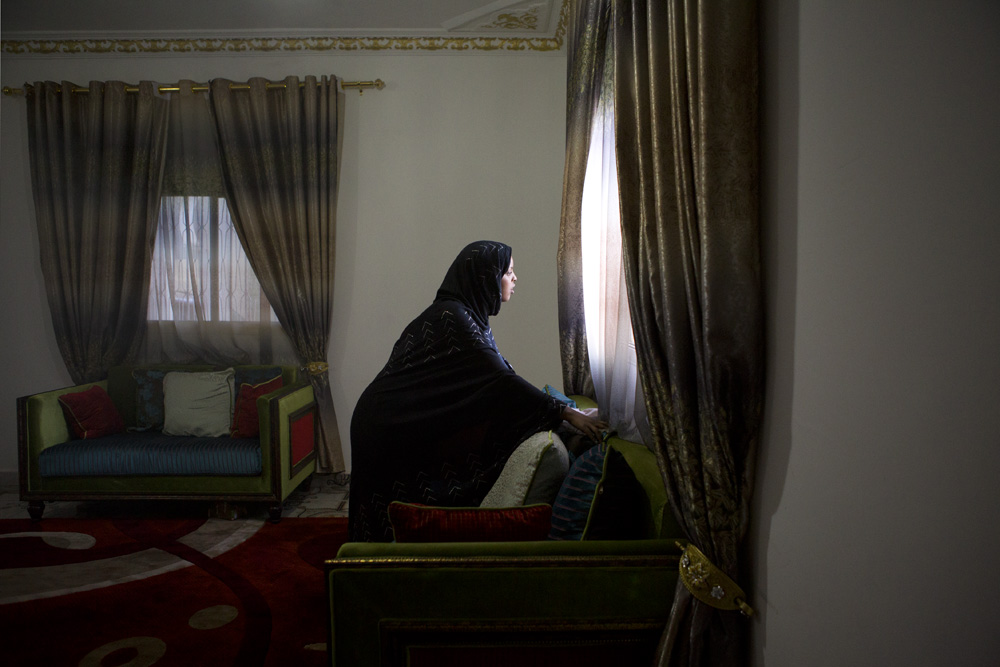 CK – Your presence during the summer months wouldn’t have caused the same reaction due to there being such a significant British population there at that time, but the non-Brits – the families of those whom you were visiting, how did they react to your presence – exploring your story, going into their houses and putting your camera ‘in their face’?KS - I think there’s a certain shyness among the population when it comes to being photographed, so a lot of the family members didn’t want me to photograph them, which is fair enough.Just walking down the street you have to be very careful – if you’re shoving your camera in people’s faces they want to know what you’re doing – if you’re going to exploit their image, and a lot of people don’t want to be photographed.But on other occasions I’ve stood there with my camera and people have asked me to take photos, so I think it might be a little bit of a power thing as well – they want a bit more control of their image, which is understandable really!There is a difference with the diaspora – it’s maybe a bit easier to photograph them because they’re probably more used to being photographed, although everyone’s really into their phones in Somaliland, so they do take a lot of pictures and a lot of people have cameras too.Once people get to know me and know what I’m about, and they know other Somalilanders like and support my work, or they know my work already, then people will tend to relax around me because they know I’m not going to exploit them.CK – And what lessons have you learnt about carrying out a documentary project in a foreign country?KS - I think you really have to listen. It’s quite difficult in some ways because I think ‘What do I know about this?’ – many layers are revealed to me all the time about Somali culture and society, and I’m never going to have an understanding of them in the same way someone who lives or originates from there does.So I think really listening to people – trying to get involved in the community. I’ve joined a group called Somaliland Focus – we try and keep track of what’s going on in the country. I go to talks all the time, and as I said I’m involved in the Somali Week Festival and the Hargeysa International Book Fair. While I’m photographing the book fair I get to listen to talks given by the best Somali writers, poets and historians.So I’ve really tried to embed myself in this.I’m also doing another project in Argentina about carnival dancers. For that one I have written articles as well. I think that’s a really good way to ground yourself in the historical context of your project. So I wrote quite an in-depth article for that one about this particular type of dance. That made me do more rigorous research, and really sort of ground myself.You can’t really just go in and think you know what’s important there. You can also end up exoticising the place.I’m really trying to understand people as much as I can – that’s why I interview them and spend some time with them.CK – What advice would you give others who might want to go to Somaliland to document a story?KS - I’d say go – despite what it says on the Foreign Office website, and as far as I’ve experienced, it does seem like quite a peaceful place. But I’d try and find your contacts who are going to connect you, because it can be quite a frustrating place to work if you don’t have that. But then again you’ll find a person who will just make something happen – it’ll be really frustrating for ages, and you think things aren’t going to happen, and then everything comes together in a short amount of time.I think there are a lot of stories to explore there, and people are supportive if you have the right approach.
CK – Your presence during the summer months wouldn’t have caused the same reaction due to there being such a significant British population there at that time, but the non-Brits – the families of those whom you were visiting, how did they react to your presence – exploring your story, going into their houses and putting your camera ‘in their face’?KS - I think there’s a certain shyness among the population when it comes to being photographed, so a lot of the family members didn’t want me to photograph them, which is fair enough.Just walking down the street you have to be very careful – if you’re shoving your camera in people’s faces they want to know what you’re doing – if you’re going to exploit their image, and a lot of people don’t want to be photographed.But on other occasions I’ve stood there with my camera and people have asked me to take photos, so I think it might be a little bit of a power thing as well – they want a bit more control of their image, which is understandable really!There is a difference with the diaspora – it’s maybe a bit easier to photograph them because they’re probably more used to being photographed, although everyone’s really into their phones in Somaliland, so they do take a lot of pictures and a lot of people have cameras too.Once people get to know me and know what I’m about, and they know other Somalilanders like and support my work, or they know my work already, then people will tend to relax around me because they know I’m not going to exploit them.CK – And what lessons have you learnt about carrying out a documentary project in a foreign country?KS - I think you really have to listen. It’s quite difficult in some ways because I think ‘What do I know about this?’ – many layers are revealed to me all the time about Somali culture and society, and I’m never going to have an understanding of them in the same way someone who lives or originates from there does.So I think really listening to people – trying to get involved in the community. I’ve joined a group called Somaliland Focus – we try and keep track of what’s going on in the country. I go to talks all the time, and as I said I’m involved in the Somali Week Festival and the Hargeysa International Book Fair. While I’m photographing the book fair I get to listen to talks given by the best Somali writers, poets and historians.So I’ve really tried to embed myself in this.I’m also doing another project in Argentina about carnival dancers. For that one I have written articles as well. I think that’s a really good way to ground yourself in the historical context of your project. So I wrote quite an in-depth article for that one about this particular type of dance. That made me do more rigorous research, and really sort of ground myself.You can’t really just go in and think you know what’s important there. You can also end up exoticising the place.I’m really trying to understand people as much as I can – that’s why I interview them and spend some time with them.CK – What advice would you give others who might want to go to Somaliland to document a story?KS - I’d say go – despite what it says on the Foreign Office website, and as far as I’ve experienced, it does seem like quite a peaceful place. But I’d try and find your contacts who are going to connect you, because it can be quite a frustrating place to work if you don’t have that. But then again you’ll find a person who will just make something happen – it’ll be really frustrating for ages, and you think things aren’t going to happen, and then everything comes together in a short amount of time.I think there are a lot of stories to explore there, and people are supportive if you have the right approach.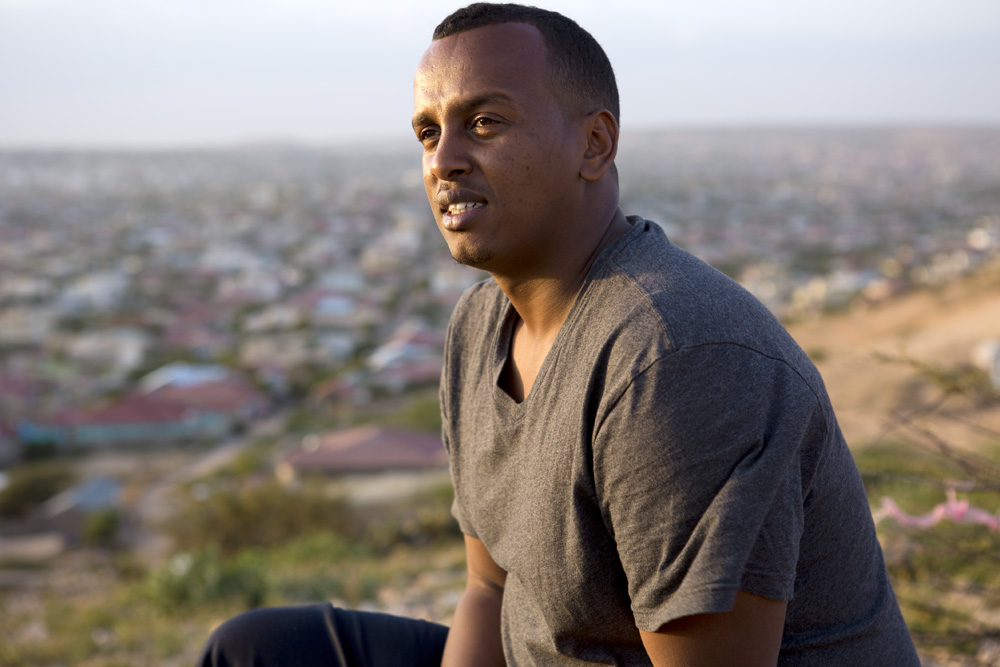 CK – The results of your work and the workshops you’ve led was exhibited in Oxford House in Bethnal Green in November 2014 – how did that come about?KS - The exhibition was put on to coincide with the Somali Week Festival, which is part of Black History Month, and it was the organisers of the festival – Ayan and Jama who invited me to do the exhibition.It’s been a great place to show the work because you’ve already got a captive audience – people who are coming to the events go past. One of the things I wanted for the project was to start a conversation, and that’s really been happening with this event. I’ve also done a talk on my project – Somaliland Summer, as part of the festival, and through that a lot of people have come and talked to me about their experiences, and I really feel like we’ve started a conversation here.That’s one of the things that I think is important for documentary photography to do, really – start a conversation, allow a sharing of experiences. Also they’re the ones who should be guiding me in the themes that are important for me to look at.To give some background about the workshops – when I worked on the Hargeysa book fair, which has been for the past two summers now, I’ve been doing photo workshops because I realised that there were no formal photography courses in Somaliland, so you get these young, enthusiastic, talented photographers but they’ve got no guidance really. So I ran some classes.I didn’t really know what to expect the first time, but a lot of people came from lots of different sectors – journalists, NGO workers, artists and others, and they all want different things. Originally I went in with all these ideas about them telling a story about Somaliland and their lives through photography, but then I realised I had to react to what they wanted – not impose some sort of idea of what I could see happening. They basically wanted me to share skills with them so I did an overview of different types of photography and tried to cover all bases really, because they’re from all walks of life and they’re going to use photography in lots of different ways.Two of the trainees from last year have started actually doing paid photography jobs. And often those jobs will be weddings and the likes. So that’s not necessarily what I do, but I had to be flexible and tell them how to make the best of their skills in all these situations.I’m really pleased to see that some of them have really improved and part of the exhibition, as you said, included printing out some of their best work.I sent them pictures of their work hanging up in London and they’re really proud, and I’m really proud of them as well.Hopefully this is part of an on-going thing – I’d really like to stay in touch with them and the ones who are really serious about photography, and I’ll keep on giving them advice when I can.
CK – The results of your work and the workshops you’ve led was exhibited in Oxford House in Bethnal Green in November 2014 – how did that come about?KS - The exhibition was put on to coincide with the Somali Week Festival, which is part of Black History Month, and it was the organisers of the festival – Ayan and Jama who invited me to do the exhibition.It’s been a great place to show the work because you’ve already got a captive audience – people who are coming to the events go past. One of the things I wanted for the project was to start a conversation, and that’s really been happening with this event. I’ve also done a talk on my project – Somaliland Summer, as part of the festival, and through that a lot of people have come and talked to me about their experiences, and I really feel like we’ve started a conversation here.That’s one of the things that I think is important for documentary photography to do, really – start a conversation, allow a sharing of experiences. Also they’re the ones who should be guiding me in the themes that are important for me to look at.To give some background about the workshops – when I worked on the Hargeysa book fair, which has been for the past two summers now, I’ve been doing photo workshops because I realised that there were no formal photography courses in Somaliland, so you get these young, enthusiastic, talented photographers but they’ve got no guidance really. So I ran some classes.I didn’t really know what to expect the first time, but a lot of people came from lots of different sectors – journalists, NGO workers, artists and others, and they all want different things. Originally I went in with all these ideas about them telling a story about Somaliland and their lives through photography, but then I realised I had to react to what they wanted – not impose some sort of idea of what I could see happening. They basically wanted me to share skills with them so I did an overview of different types of photography and tried to cover all bases really, because they’re from all walks of life and they’re going to use photography in lots of different ways.Two of the trainees from last year have started actually doing paid photography jobs. And often those jobs will be weddings and the likes. So that’s not necessarily what I do, but I had to be flexible and tell them how to make the best of their skills in all these situations.I’m really pleased to see that some of them have really improved and part of the exhibition, as you said, included printing out some of their best work.I sent them pictures of their work hanging up in London and they’re really proud, and I’m really proud of them as well.Hopefully this is part of an on-going thing – I’d really like to stay in touch with them and the ones who are really serious about photography, and I’ll keep on giving them advice when I can.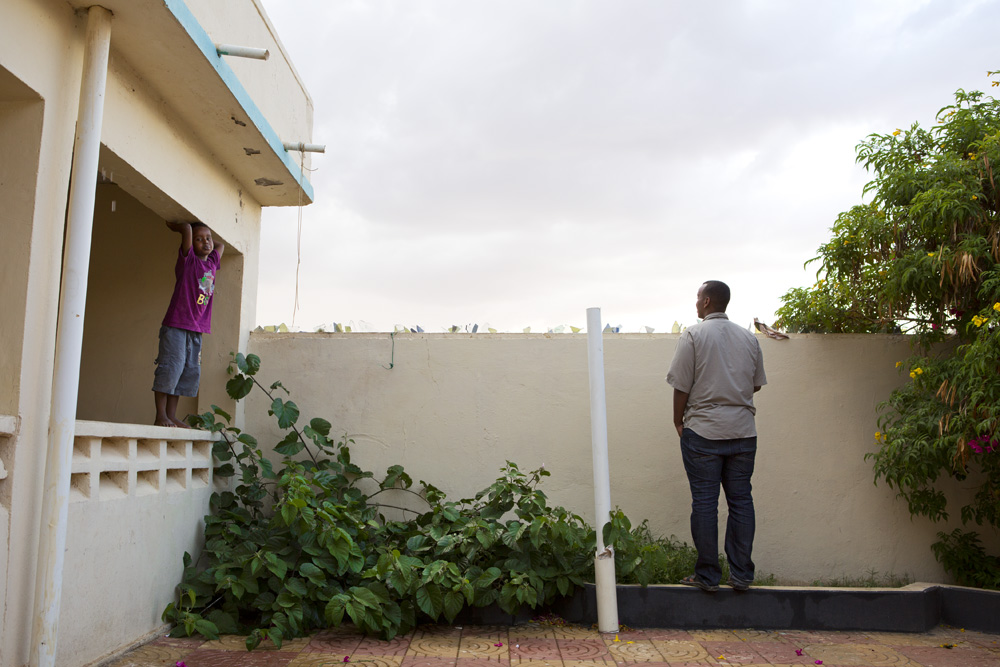 CK – You’ve made the decision to actually put an incomplete body of work out there in the public domain – is that purely so as the project is guided by them, or are there other reasons, as a lot of people won’t show any work until they have a complete body of work?KS - I wanted to publicise it – particularly among the Somali community at this stage, because they are the ones who are going to help me next year to complete the project, and I want to get them on board, and to ensure there is an understanding of what I’m doing and trust.And as I said, to get guidance from them – what their experiences have been, and what type of thing I should be looking at next time I go back.The whole project is unfinished – I’ve covered two people, and I’m happy to show those photographs, but I just want more.So it felt like a good idea.There have been other projects where even before taking a photograph people have relied on publicity for their project – like The Sochi Project where they told people what they were doing and then got the funding through that exposure.Also, I need funding to hopefully spend a whole summer next year in Hargeysa, so I think having a taster of the work should help people picture what I’m trying to do.CK – In terms of the exhibition, what has the experience been like and what lessons have you learnt in putting the exhibition together and compiling the work to be exhibited?KS - There are lots of lessons to be learnt. I think it’s a really good thing to do – to print your work, because then you can properly evaluate it, and then it informs your approach next time you’re taking photographs.I think when you’re doing your edit, you should always have your trusted friends to show your ideas and your edit to – always show your work someone else and get someone else’s opinion – I think that’s really important.What I also did was go and look at other shows and see how they were exhibited. I wasn’t able to mount the images this time, so I had to find a way of putting them up and what was best for that.I went to Brighton Photo Biennial and that gave me loads of ideas. So just go to as many exhibitions as possible and ask for your trusted friends’ opinions.CK – Are there any Somaliland-based documentary photographers that you’re aware of?KS - Some of my students have been doing quite interesting work – I don’t know if you could call them documentary photographers as such.There’s a brilliant US-based Somali photographer called Abdi Roble who did a project on Somali refugees and diaspora across the world, called the Somali Documentary Project. It’s not specific to Somaliland but looks at the Somali diaspora in general.CK – And where can people connect with you?KS - You can see my work on my website – www.katestanworth.comOr my Facebook page which is Kate Stanworth Photography.Through those places you can get in touch with me and see more of my workSource: http://www.documentaryphotoreview.com
CK – You’ve made the decision to actually put an incomplete body of work out there in the public domain – is that purely so as the project is guided by them, or are there other reasons, as a lot of people won’t show any work until they have a complete body of work?KS - I wanted to publicise it – particularly among the Somali community at this stage, because they are the ones who are going to help me next year to complete the project, and I want to get them on board, and to ensure there is an understanding of what I’m doing and trust.And as I said, to get guidance from them – what their experiences have been, and what type of thing I should be looking at next time I go back.The whole project is unfinished – I’ve covered two people, and I’m happy to show those photographs, but I just want more.So it felt like a good idea.There have been other projects where even before taking a photograph people have relied on publicity for their project – like The Sochi Project where they told people what they were doing and then got the funding through that exposure.Also, I need funding to hopefully spend a whole summer next year in Hargeysa, so I think having a taster of the work should help people picture what I’m trying to do.CK – In terms of the exhibition, what has the experience been like and what lessons have you learnt in putting the exhibition together and compiling the work to be exhibited?KS - There are lots of lessons to be learnt. I think it’s a really good thing to do – to print your work, because then you can properly evaluate it, and then it informs your approach next time you’re taking photographs.I think when you’re doing your edit, you should always have your trusted friends to show your ideas and your edit to – always show your work someone else and get someone else’s opinion – I think that’s really important.What I also did was go and look at other shows and see how they were exhibited. I wasn’t able to mount the images this time, so I had to find a way of putting them up and what was best for that.I went to Brighton Photo Biennial and that gave me loads of ideas. So just go to as many exhibitions as possible and ask for your trusted friends’ opinions.CK – Are there any Somaliland-based documentary photographers that you’re aware of?KS - Some of my students have been doing quite interesting work – I don’t know if you could call them documentary photographers as such.There’s a brilliant US-based Somali photographer called Abdi Roble who did a project on Somali refugees and diaspora across the world, called the Somali Documentary Project. It’s not specific to Somaliland but looks at the Somali diaspora in general.CK – And where can people connect with you?KS - You can see my work on my website – www.katestanworth.comOr my Facebook page which is Kate Stanworth Photography.Through those places you can get in touch with me and see more of my workSource: http://www.documentaryphotoreview.com
-
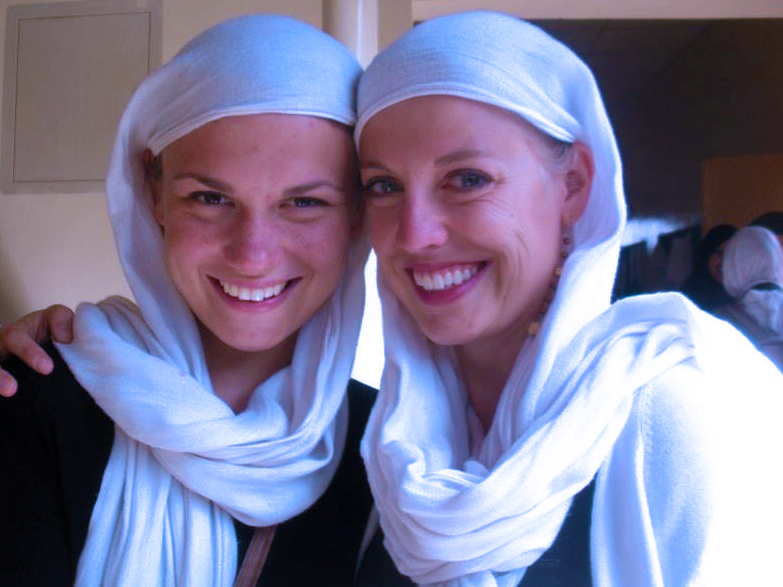 When Ava Ramberg and Kelly Heller arrived in the autonomous Somaliland region of Somalia in 2011, they planned to teach for a year. Within weeks, the Twin Cities natives knew they’d stay longer.The pair helped shape a boarding school recently launched by an East Coast hedge fund manager with half a million dollars of his own money. At the Abaarso School of Science and Technology, Ramberg and Heller struggled to get the knack of teaching — and saw students land full rides to selective colleges.“There was a kind of addiction in knowing we had a lot to contribute,” said Ramberg, who stayed three years and oversees the school’s finances from New York.In 2011, both women were recent college graduates: Ramberg of the University of Minnesota, Heller of the University of Wisconsin. Postings on a site that lists international nonprofit jobs caught their eye. For school founder Jonathan Starr, Somaliland was full of potential: more stable than much of the war-ravaged country, but sorely lacking in infrastructure.For the Minnesotans, the new jobs were tough. New to teaching, they had to draw out shy, reticent newcomers to the school. They faced local mistrust of foreigners.But the students won them over, said Heller, now in grad school at Columbia University: “We came to care for them so incredibly much.” One student read two English dictionaries cover to cover. Pupils, some of whom had lost parents in the war, pleaded for extra homework and scarfed down lunches to get back to studying.The women found Minnesota to be an instant icebreaker. The state is known for its Somali community, which has chipped in to pay for Abaarso students’ tuition.More than 30 students have moved on to colleges worldwide, including the Massachusetts Institute of Technology. Most will be back, Ramberg said: “When students come to us, it is ingrained in them they are the future of their country.”Mila Koumpilova (612) 673-4781Source: http://www.startribune.com
When Ava Ramberg and Kelly Heller arrived in the autonomous Somaliland region of Somalia in 2011, they planned to teach for a year. Within weeks, the Twin Cities natives knew they’d stay longer.The pair helped shape a boarding school recently launched by an East Coast hedge fund manager with half a million dollars of his own money. At the Abaarso School of Science and Technology, Ramberg and Heller struggled to get the knack of teaching — and saw students land full rides to selective colleges.“There was a kind of addiction in knowing we had a lot to contribute,” said Ramberg, who stayed three years and oversees the school’s finances from New York.In 2011, both women were recent college graduates: Ramberg of the University of Minnesota, Heller of the University of Wisconsin. Postings on a site that lists international nonprofit jobs caught their eye. For school founder Jonathan Starr, Somaliland was full of potential: more stable than much of the war-ravaged country, but sorely lacking in infrastructure.For the Minnesotans, the new jobs were tough. New to teaching, they had to draw out shy, reticent newcomers to the school. They faced local mistrust of foreigners.But the students won them over, said Heller, now in grad school at Columbia University: “We came to care for them so incredibly much.” One student read two English dictionaries cover to cover. Pupils, some of whom had lost parents in the war, pleaded for extra homework and scarfed down lunches to get back to studying.The women found Minnesota to be an instant icebreaker. The state is known for its Somali community, which has chipped in to pay for Abaarso students’ tuition.More than 30 students have moved on to colleges worldwide, including the Massachusetts Institute of Technology. Most will be back, Ramberg said: “When students come to us, it is ingrained in them they are the future of their country.”Mila Koumpilova (612) 673-4781Source: http://www.startribune.com -
It's the fashion portfolio of an Australian jihadist. Sharky Jama, from Melbourne, has traded in a 'budding' modelling career for a life devoted to the Islamic State in the Middle East, according to a report. The Australian reported that Jama and friend, former La Trobe University student Yusuf Yusuf, claim to have fled Australian for the key IS outposts of Fallujah, Iraq, and Raqqa, Syria, respectively.In various pictures published by his modelling agency, Jama, of Somalian descent, is seen posing for photographs in smart casual clothing.
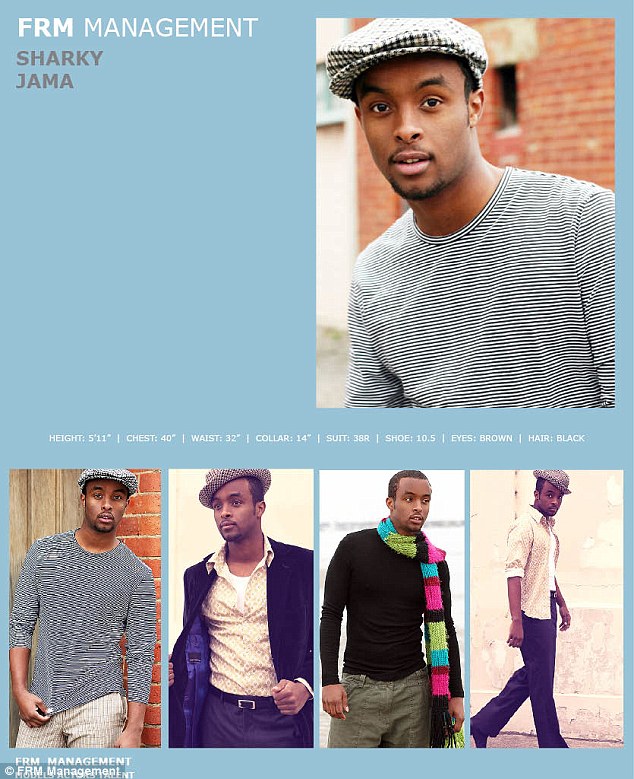 In a series of professional photographs, he is seen showing off high-topped leather boots, cargo pants and a colourful scarf on a picturesque Australian beach.In other pictures, he gazes down the barrel of the camera, a patterned fedora tipped forward on his head as he saunters down a laneway wearing a short-sleeve dress shirt and pants.Some pictures of Jama, above, feature him sauntering down laneways wearing a fedora, while others show him posing in high-top sneakers and colourful scarfs
In a series of professional photographs, he is seen showing off high-topped leather boots, cargo pants and a colourful scarf on a picturesque Australian beach.In other pictures, he gazes down the barrel of the camera, a patterned fedora tipped forward on his head as he saunters down a laneway wearing a short-sleeve dress shirt and pants.Some pictures of Jama, above, feature him sauntering down laneways wearing a fedora, while others show him posing in high-top sneakers and colourful scarfs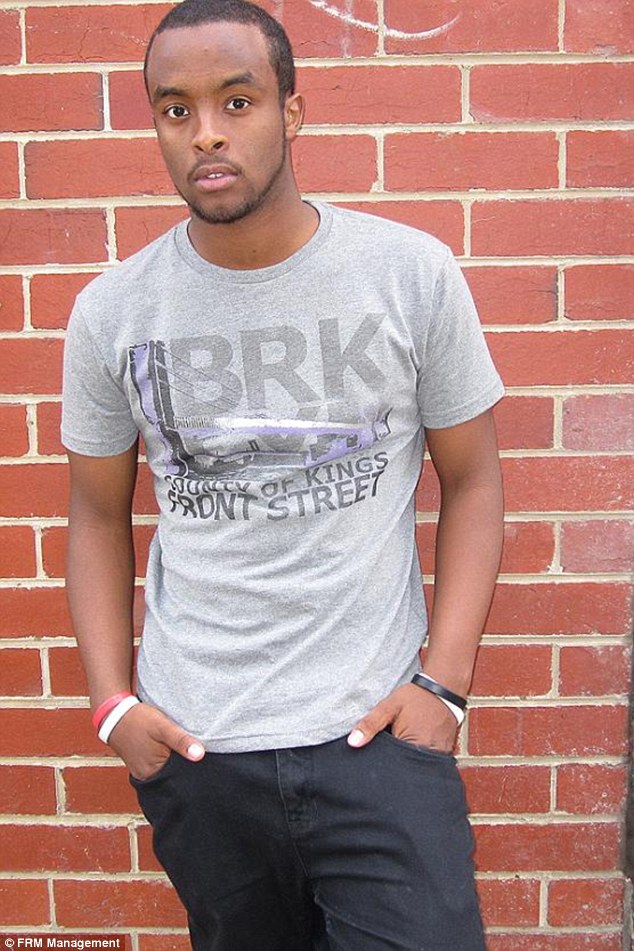 Jama's role in Fallujah - the first major city to fall to the Islamic State in 2014 - is not known, but is no doubt very different to his Australian occupation. The Federal government believes more than 70 Australians have fled to join the fighting in Iraq and Syria and the passports of more than 100 others have been cancelled.Counter-terrorism researcher Dr Anne Aly, from Curtin University, told Daily Mail Australia the young men matched the 'typical' profile of Australians joining the Islamic State.'That is pretty much a very typical profile, young men who for all intents and purposes seem to be quite well integrated... but then there's something that turns them'.'It might take a year, it might take six months and if they continue down that path and become more and more radicalised they get to the point where they're ready to take action'.
Jama's role in Fallujah - the first major city to fall to the Islamic State in 2014 - is not known, but is no doubt very different to his Australian occupation. The Federal government believes more than 70 Australians have fled to join the fighting in Iraq and Syria and the passports of more than 100 others have been cancelled.Counter-terrorism researcher Dr Anne Aly, from Curtin University, told Daily Mail Australia the young men matched the 'typical' profile of Australians joining the Islamic State.'That is pretty much a very typical profile, young men who for all intents and purposes seem to be quite well integrated... but then there's something that turns them'.'It might take a year, it might take six months and if they continue down that path and become more and more radicalised they get to the point where they're ready to take action'.His marketing card describes his chest, waist and collar measurements as well as his height (5'11"), suit size (38R) and shoe size (10.5).
From Melbourne to the Middle East: Jama claims he has moved to Fallujah, one of the first cities to fall to the Islamic State terror group's initial onslaught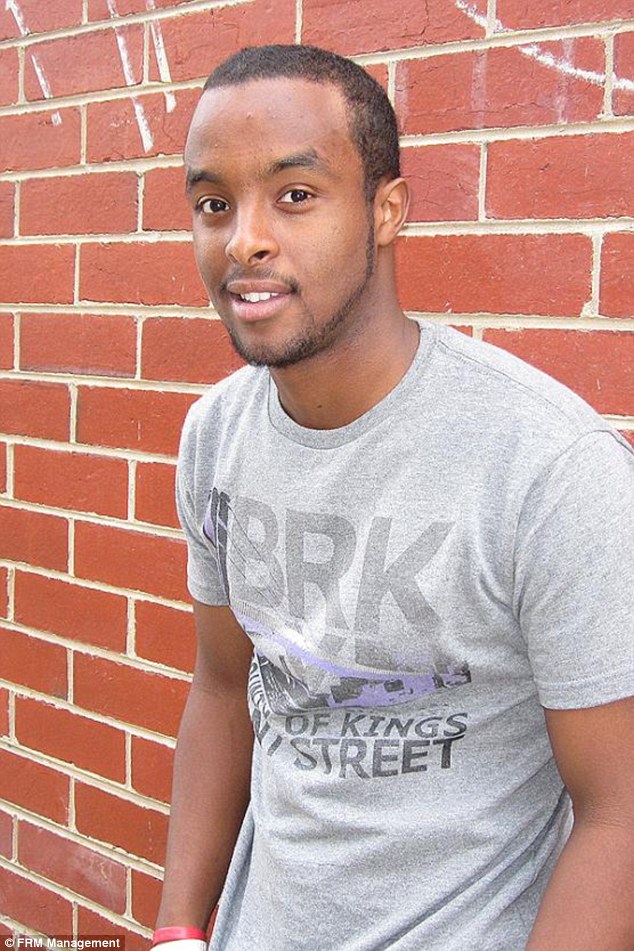 While many Australians have taken up arms on behalf of the Islamic State, and several have died, others have joined the terrorist group's propaganda arm. Last week, it was reported that a western Sydney man has joined the organisation's media arm, which produces its slick, high-definition propaganda packages for broadcast and upload.The man is understood to be working as a video editor. He described his life as 'pretty typical' in an interview with The Australian newspaper. 'I have a job, I live in a HQ, eat, sleep, work, hope an airstrike gets me so I can be Shaheed (martyred),' he was quoted saying. Two Australian nationals have featured in Islamic State videos - the so-called 'Ginger Jihadi', Abdullah Elmir, 17 and Zakaria Raad, 22.Elmir has not appeared in a video since October, when he was broadcast wearing military fatigues and surrounded by chanting Islamic State militants. Raad was reported killed shortly after his appearance in a July recruitment video with other militants.Source: http://www.dailymail.co.ukAustralian jihad fighter in Syria dreams of Coco Pops
While many Australians have taken up arms on behalf of the Islamic State, and several have died, others have joined the terrorist group's propaganda arm. Last week, it was reported that a western Sydney man has joined the organisation's media arm, which produces its slick, high-definition propaganda packages for broadcast and upload.The man is understood to be working as a video editor. He described his life as 'pretty typical' in an interview with The Australian newspaper. 'I have a job, I live in a HQ, eat, sleep, work, hope an airstrike gets me so I can be Shaheed (martyred),' he was quoted saying. Two Australian nationals have featured in Islamic State videos - the so-called 'Ginger Jihadi', Abdullah Elmir, 17 and Zakaria Raad, 22.Elmir has not appeared in a video since October, when he was broadcast wearing military fatigues and surrounded by chanting Islamic State militants. Raad was reported killed shortly after his appearance in a July recruitment video with other militants.Source: http://www.dailymail.co.ukAustralian jihad fighter in Syria dreams of Coco Pops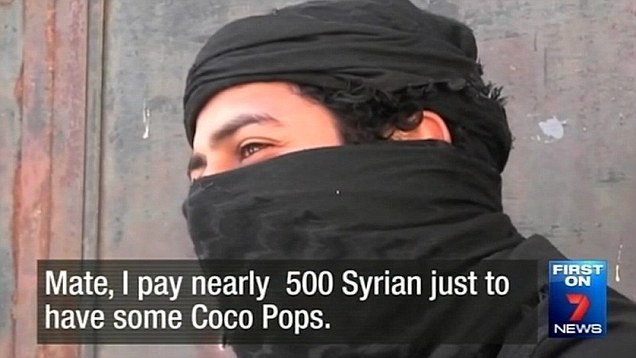
-
 In Somali slang, there is a special word for the daydream of starting a new life in a far-off land: it's known as a bofis. And for millions of refugees across Africa, there is one bofis that people obsess with above all — the idea of moving to the West, and in particular to the US.
For most, it remains an impossible dream. But there is one legal way in which even those without wealth or connections can do it: Getting a lucky break in the US' Diversity Visa Program, better known as the green card lottery. In 2013, nearly eight million people applied for just 50,000 winning tickets, which means that for every 1,000 applicants, only six won the chance of a new life.For the past year, I've followed the story of one of the winners, a young Somali refugee called Abdi Nor Iftin who lived in the Eastleigh district of the Kenyan capital, Nairobi. Known as Little Mogadishu, it's one of the country's toughest slums. And one thing I discovered is that becoming an American is not easy, even for those who do have a winning ticket.There's something a little strange about the Diversity Visa Program. At a time when immigration to most Western countries is becoming ever more restricted, the US government still gives away 50,000 permanent resident visas each year to people chosen at random from across the world. Entries from most developing countries are permitted, and only a high school education, or a few years of work experience, are required.When I first contacted Abdi, he had been living in Little Mogadishu for some time. He and all his friends had applied for the lottery as a group, at a local Internet café, but Abdi was the only one to be picked by the lottery computer."We all cheered! We picked him up!" remembers Yunus, one of Abdi's best friends. "Everybody was holding him, we were shouting, 'You won it, you won it! You are going to America!'"A remarkable stroke of good fortune? No, says Abdi. It was his fate."This was not just luck. My whole life I have been in love with America — the best country in the world, the dreamland, the land of opportunity," he says. "Ask anyone what they called me when I was a kid in Mogadishu and they will tell you. My nickname then was 'Mr. America', or 'Abdi America.' Everyone used to joke about it."But being well known for a love of America and American culture can also be dangerous. As the Islamist al-Shabaab rebel group took control of much of Somalia, Abdi was forced to follow his brother Hassan into exile in Nairobi.
In Somali slang, there is a special word for the daydream of starting a new life in a far-off land: it's known as a bofis. And for millions of refugees across Africa, there is one bofis that people obsess with above all — the idea of moving to the West, and in particular to the US.
For most, it remains an impossible dream. But there is one legal way in which even those without wealth or connections can do it: Getting a lucky break in the US' Diversity Visa Program, better known as the green card lottery. In 2013, nearly eight million people applied for just 50,000 winning tickets, which means that for every 1,000 applicants, only six won the chance of a new life.For the past year, I've followed the story of one of the winners, a young Somali refugee called Abdi Nor Iftin who lived in the Eastleigh district of the Kenyan capital, Nairobi. Known as Little Mogadishu, it's one of the country's toughest slums. And one thing I discovered is that becoming an American is not easy, even for those who do have a winning ticket.There's something a little strange about the Diversity Visa Program. At a time when immigration to most Western countries is becoming ever more restricted, the US government still gives away 50,000 permanent resident visas each year to people chosen at random from across the world. Entries from most developing countries are permitted, and only a high school education, or a few years of work experience, are required.When I first contacted Abdi, he had been living in Little Mogadishu for some time. He and all his friends had applied for the lottery as a group, at a local Internet café, but Abdi was the only one to be picked by the lottery computer."We all cheered! We picked him up!" remembers Yunus, one of Abdi's best friends. "Everybody was holding him, we were shouting, 'You won it, you won it! You are going to America!'"A remarkable stroke of good fortune? No, says Abdi. It was his fate."This was not just luck. My whole life I have been in love with America — the best country in the world, the dreamland, the land of opportunity," he says. "Ask anyone what they called me when I was a kid in Mogadishu and they will tell you. My nickname then was 'Mr. America', or 'Abdi America.' Everyone used to joke about it."But being well known for a love of America and American culture can also be dangerous. As the Islamist al-Shabaab rebel group took control of much of Somalia, Abdi was forced to follow his brother Hassan into exile in Nairobi.Unfortunately for Abdi, being selected as a winner in the lottery is far from being a guarantee of reaching the United States. Each person selected also needs to present lots of papers and pass a final interview at a US embassy. On that day, each applicant's entire future is decided.
A majority of applicants never successfully complete this process. In fact, the system is deliberately designed this way. The Diversity Visa Program has to distribute 50,000 visas each year, but to take account of interview failures and substandard applications, the number of randomly chosen applicants like Abdi is more than double that.In 2013, when he applied, approximately 105,000 hopeful applicants were picked by the system. Once the full quota of visas has been assigned, all remaining applicants are automatically refused.The odds of success for Abdi soon became even worse. While he was waiting for his embassy interview, al-Shabab launched the horrific Westgate Shopping Mall attack in Nairobi, killing and injuring dozens of innocent people. Further terrorist attacks followed, and the Kenyan authorities responded with a huge police crackdown on Somalis in Eastleigh.Although al-Shabab supporters were the official target, it felt as though every Somali refugee was at risk of arrest, deportation or being forced into internment camps. Hassan, Abdi's older brother, was particularly concerned."Being a refugee became a crime," he told me. "We would hide in our houses. And you could hear screams, children crying, women being hauled away on trucks. Being in that room, listening, waiting for someone to take us both away — can you imagine how that feels?"For Abdi, it felt as though his entire dream of a better life in the US was being snatched away. Any arrest, however unjustified, could have led to deportation or internment, making it impossible for him to attend his US embassy interview.
The strain began to take its toll. In one conversation around this time, Abdi told me he had been watching National Geographic documentaries on YouTube — it is a feature of urban refugee life that Wi-Fi connections can persist even when food and water runs low."Have you ever seen wildebeest?" he asked me. "Every year these wildebeest have to cross this big river, and the river is infested with crocodiles. So I think that these wildebeest are risk-takers. They have to cross to the other side or die trying. What I am saying is: We are now the wildebeest."And then, unexpectedly, a further stroke of luck — or fate. After several terrifying visits to the police station, Abdi was told he would be issued a formal police clearance letter, confirming his status as a valid applicant for a green card.That evening, he told me he could not stop staring at his ink stained fingertips, still marked from the police fingerprint pad. He did not even want to wash them, he said, just to keep the ink there a little longer. Abdi was finally ready for his interview.Early on the the morning of the interview, I received a text message from Abdi while I was brushing my teeth. It was not what I was expecting. The interview had been a failure and his application had been rejected: "Today is my worst day on Earth," he wrote.It emerged that Abdi's police clearance letter was in order, but one of his university transcripts was a copy rather than a signed original. Any paperwork errors can be the kiss of death when so many candidates are applying. Hassan and all of Abdi's friends were heartbroken. Many of them had seen him as a role model for how to escape the grind of refugee life.But Abdi had been too hasty in concluding it was all over. In fact, he had not been refused outright. Although it made his application less likely to succeed, there was scope for him to resubmit the papers he was missing and ask for his application to be reviewed. He got the necessary document from the university in Nairobi and rushed around getting officials to sign it.A few days later, the result came in. Abdi had been finally accepted into the Diversity Visa Program. As a refugee from a failed state, he had no passport, so the visa was printed loose-leaf for Abdi to take to the airport.Abdi is now living legally in snowbound Maine. So far, life in the US has lived up to his bofis. He found work with an insulation installation company, and sent his first installment of cash home to his mother in Mogadishu. The appeal of snow has worn off, but his favourite doughnut at Dunkin' Donuts is the classic glazed kind.This story is adapted from a documentary aired by the BBC World Service.Source: http://wvxu.org
http://www.somaliaonline.com/in-somali-slang-there-is-a-special-word-for-the-daydream-of-starting-a-new-life-in-a-far-off-land-its-known-as-a-bofis/ -
December 29, 2014
By Justin Scheck, Margaret Coker, Joe Lauria
The Wall Street Journal
Since leaving Somalia in the 1990s, Musa Haji Mohamed Ganjab has been a landlord and entrepreneur and served as a representative of the Somali government, which the U.S. is backing to fight the jihadist group al-Shabaab.
He also has ordered that arms intended for Somalia’s government be delivered instead to an al-Shabaab commander, a confidential United Nations report alleges.
This is just one of the discussions, the report says, that Mr. Ganjab has had about illegally arming groups in Somalia, including the government.
The report shows the complexity of the struggle against extremism in Somalia, a country that is a U.S. national-security concern because of its local al Qaeda-linked group. Al-Shabaab recently launched two attacks just across the border in Kenya in which it slaughtered all non-Muslims, including killing 36 at a quarry-worker camp early this month and more than two dozen in an attack on a bus in November. On Christmas Day, it attacked an African Union base in Mogadishu, killing three soldiers.
President Barack Obama has cited America’s antiterrorism approach in Somalia as an example of how to battle Islamic State in Iraq and Syria, a strategy combining U.S. air power with supporting local ground forces. The confidential U.N. report—now in the hands of the Security Council, and reviewed by The Wall Street Journal—shows how murky relationships among politicians, clans and militia leaders can complicate the effort. For example, South African security officials were involved in some of the discussions Mr. Ganjab had about arming Somali factions, according to U.N. documents and people familiar with the matter.
Mr. Ganjab, who lives in South Africa, denied he has dealt in arms. “Not even a Kalashnikov,” he said in an interview near his home in Johannesburg.
He said some emails the U.N. relied on were faked, including one linking him to arming al-Shabaab, and some were hacked. He called himself a victim of a conspiracy by inspectors monitoring an arms embargo on Somalia that has been in place for two decades.
Somalia’s government didn’t respond to requests for comment. Its state minister of defense, Mohamed Ali Haga, in a recent interview labeled U.N. arms-embargo inspectors obstacles to the anti-Shabaab fight who want to “tie the government’s hands behind their back.”
The U.N. report comes as U.S. relations with Somalia are under some strain. Although the U.S. in October went along with an embargo exception that lets the government import certain weapons, Washington last month pulled senior diplomats out of a Somalia-aid meeting after Somalia’s president objected to U.S. criticism of his government, said people familiar with the event. Spokesmen for President Hasan Sheikh Mohamud didn’t reply to requests for comment.
A State Department spokesman said that “because Somalia’s leadership is distracted with political division, the United States did not see the utility in sending a delegation” to the aid meeting. In recent months, President Mohamud has been at odds with various officials in his government over who would occupy certain official roles.
As for the U.N. report, a State Department official familiar with it said U.S. diplomats find it credible.
Since a civil war broke out in Somalia in 1991, thousands have left the country for the U.S. or Europe. Mr. Ganjab said he lived in Romania and Canada before settling in South Africa, where he acquired an office building and set up an investment fund.
“I’m a businessman,” he said in the interview, dressed in a blazer and plaid shirt. “It’s businessmen who bring together the world.”
Al-Shabaab sprang up in the early 2000s and later began imposing Taliban-style rule in areas where it gained control. The U.S. deemed it a terrorist organization in 2008.
A peacekeeping force sent by the African Union then created enough stability to revive some business-minded expatriates’ interest in the country. Mr. Ganjab became an official Somali “liaison” to South Africa in 2010, according to a Somali government document sent to a South African diplomat.
Mr. Ganjab initially denied having been a Somali government representative, but when shown the document said he used to be but isn’t anymore. “To represent the Somali government is a crime?” he asked.
Mr. Ganjab said he is close to President Mohamud and once started a now-closed business with a presidential adviser. The adviser, Abdullahi Haider, said they weren’t business partners because the business never took off.
Mr. Ganjab also has worked with a Maryland law firm that has been trying to recover for Somalia assets frozen by foreign countries, according to a separate U.N. report as well as to the law firm and to Mr. Ganjab.
The recent confidential U.N. report linked him to other ventures. It said that in a September 2009 email, Mr. Ganjab and another man discussed moving “several tons of ammunition and weapons” to militia commanders affiliated with Mr. Ganjab’s Somali clan. At the time, arms shipments to anyone in Somalia, including the government, were prohibited by the embargo.
Also in the U.N. report are emails purportedly showing that two al-Shabaab commanders emailed Mr. Ganjab on Oct. 8, 2010, about meetings in Malaysia discussing aid for al-Shabaab. The emails referred to a supposed deal for “medicine of various types” and one said that “the support you give us today will be recorded in history.” Mr. Ganjab declined to comment on the authenticity of the 2009 and 2010 emails.
One of the 2010 emails indicates Mr. Ganjab forwarded it to a South African diplomat, Fury Malebogo. Mr. Malebogo wouldn’t comment on that but said Mr. Ganjab worked with him as a link to South Africa’s Somali community.
On Dec. 7, 2012, according to the U.N. report, Mr. Ganjab discussed Somali arms at a meeting with a South African private-security company and a onetime mercenary. That former mercenary is a South African ex-soldier named Eeben Barlow, according to two people with knowledge of the meeting. Mr. Ganjab said he was working for Somalia’s president to obtain “secret military support to the Somali government,” including guns and guerrilla-warfare training, the report said.
One of the 2010 emails indicates Mr. Ganjab forwarded it to a South African diplomat, Fury Malebogo. Mr. Malebogo wouldn’t comment on that but said Mr. Ganjab worked with him as a link to South Africa’s Somali community.
On Dec. 7, 2012, according to the U.N. report, Mr. Ganjab discussed Somali arms at a meeting with a South African private-security company and a onetime mercenary. That former mercenary is a South African ex-soldier named Eeben Barlow, according to two people with knowledge of the meeting. Mr. Ganjab said he was working for Somalia’s president to obtain “secret military support to the Somali government,” including guns and guerrilla-warfare training, the report said.
Source:The Wall Street Journal
-
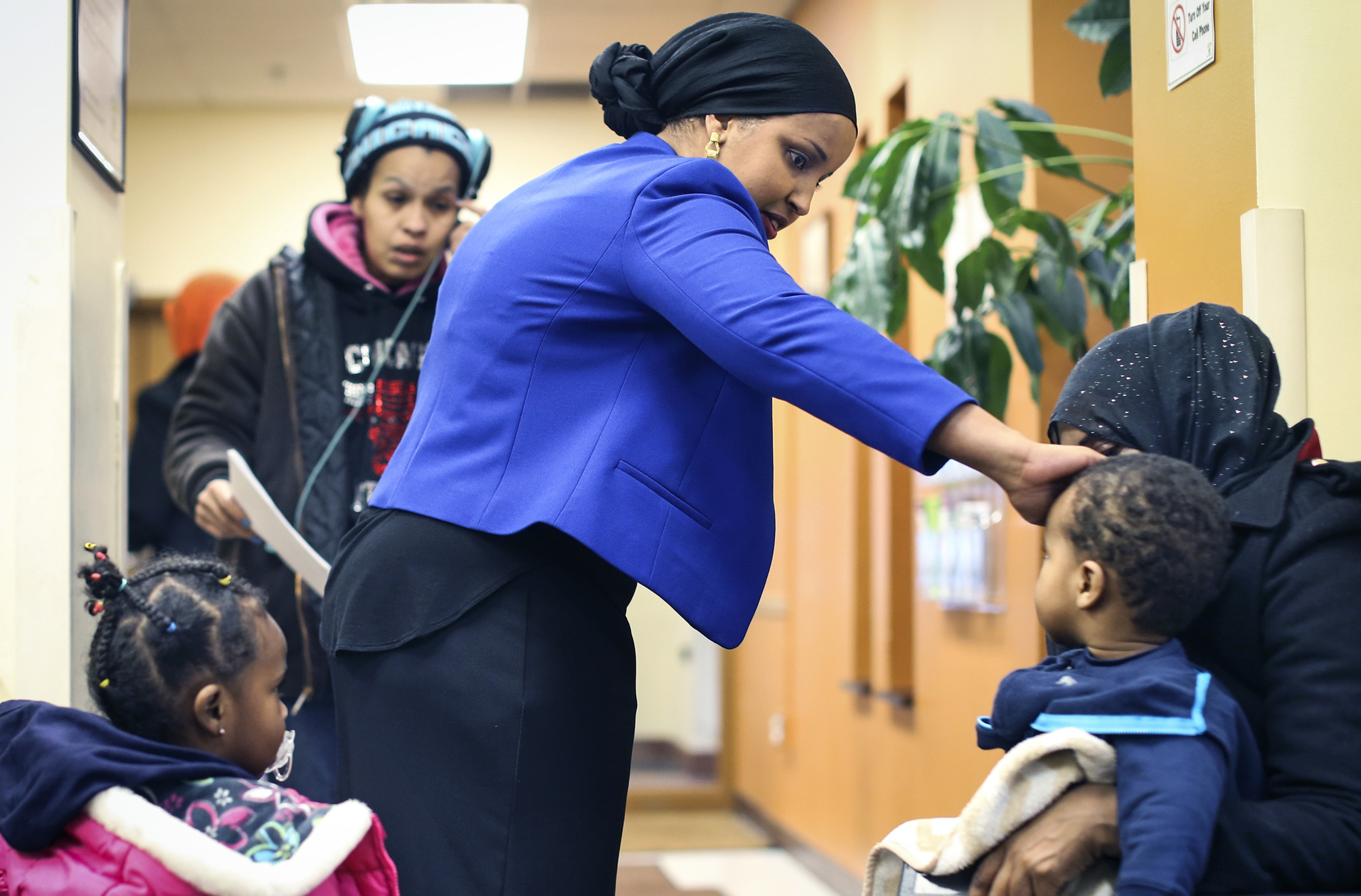 When Sahra Noor first visited People’s Center Health Services, she was a harried college freshman and the single mom of a toddler. She had arrived in the United States two years earlier after spending most of her teenage years in Kenyan refugee camps.She returned to the center last summer as the chief executive of what is now a network of clinics headquartered in the Minneapolis’ Cedar-Riverside neighborhood.In the 15 intervening years, Noor earned a graduate degree and rose rapidly in health care leadership. But she says she will draw heavily on her back story as a patient — at a time when the pressure is on for safety-net clinics to better track patient results and cut costs. The proud Somali community of Cedar-Riverside has high expectations of Noor, as well.“I see myself as a cultural broker, someone who understands the American health care system and the needs of low-income and immigrant communities,” said Noor.Over the past decade, a growing number of Somali-American women have launched successful professional careers. Now, some are aiming higher, eyeing new roles as decisionmakers.On a recent morning at People’s Center, Noor stepped out of her uncluttered corner office for a twice-daily ritual. She strode briskly through the clinic’s ground floor, pausing to chat casually with patients in the waiting room and peeking into the new pediatric wing. A welcome sign in a dozen languages and a sign-up sheet for an immigration lawyer are posted on the pastel walls.The ritual is an antidote to Noor’s biggest fear — that marooned in her office upstairs, she might lose touch with the front lines of patient care.“We are dealing with people’s lives, and we need to think like a patient,” said Noor, who started in August.
When Sahra Noor first visited People’s Center Health Services, she was a harried college freshman and the single mom of a toddler. She had arrived in the United States two years earlier after spending most of her teenage years in Kenyan refugee camps.She returned to the center last summer as the chief executive of what is now a network of clinics headquartered in the Minneapolis’ Cedar-Riverside neighborhood.In the 15 intervening years, Noor earned a graduate degree and rose rapidly in health care leadership. But she says she will draw heavily on her back story as a patient — at a time when the pressure is on for safety-net clinics to better track patient results and cut costs. The proud Somali community of Cedar-Riverside has high expectations of Noor, as well.“I see myself as a cultural broker, someone who understands the American health care system and the needs of low-income and immigrant communities,” said Noor.Over the past decade, a growing number of Somali-American women have launched successful professional careers. Now, some are aiming higher, eyeing new roles as decisionmakers.On a recent morning at People’s Center, Noor stepped out of her uncluttered corner office for a twice-daily ritual. She strode briskly through the clinic’s ground floor, pausing to chat casually with patients in the waiting room and peeking into the new pediatric wing. A welcome sign in a dozen languages and a sign-up sheet for an immigration lawyer are posted on the pastel walls.The ritual is an antidote to Noor’s biggest fear — that marooned in her office upstairs, she might lose touch with the front lines of patient care.“We are dealing with people’s lives, and we need to think like a patient,” said Noor, who started in August.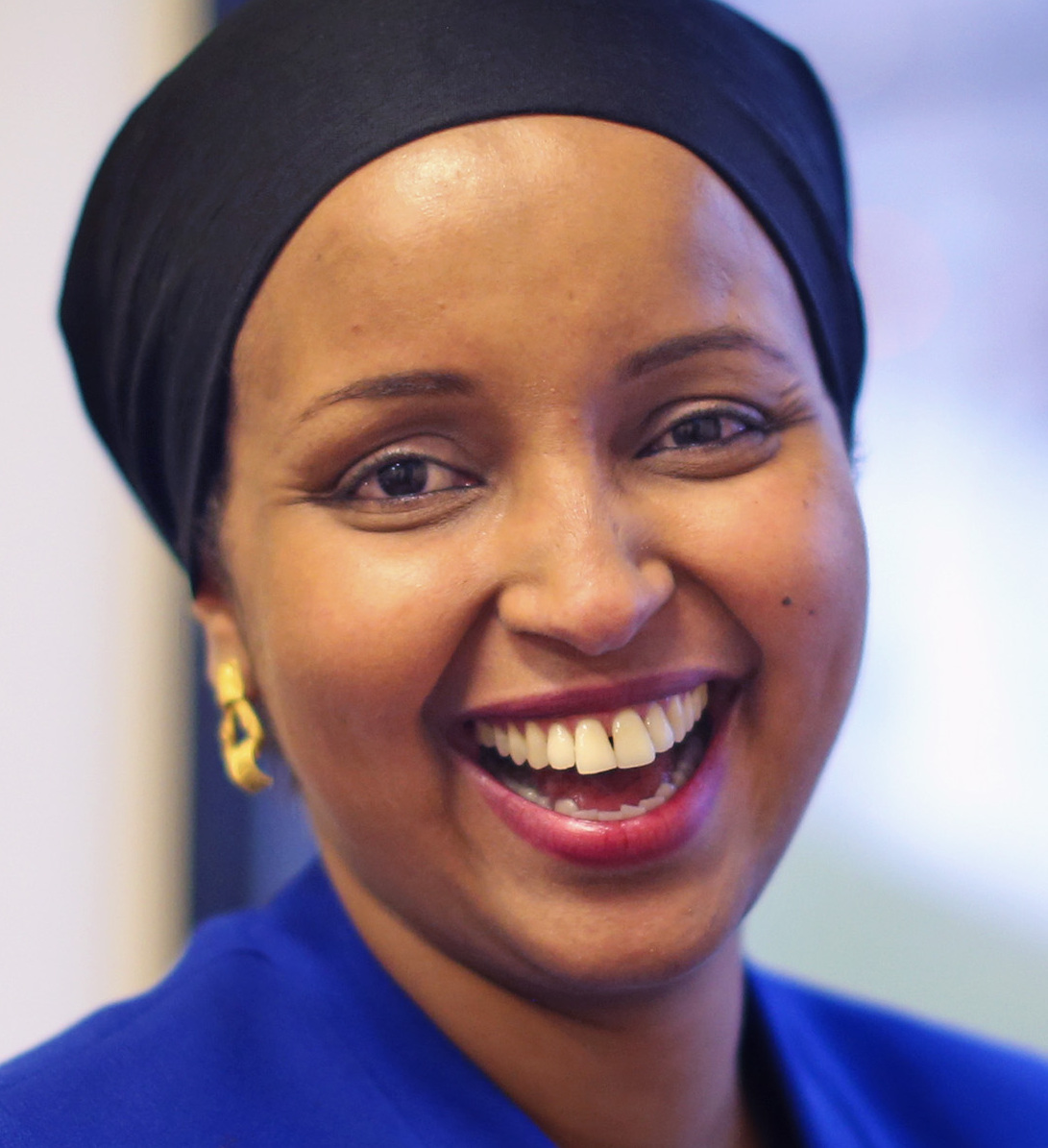 The center opened in 1970 as an all-volunteer operation with limited hours. By the time Noor became a patient in 1998, it was a full-fledged community clinic.It was among a growing number of providers that rely largely on publicly subsidized coverage such as Medicaid as well as state and federal grants, but also aim to save taxpayer money by warding off costly emergency room visits and hospital stays.Once Noor rushed in as her 2-year-old daughter cried in pain from an ear infection. The young mom had lapsed health insurance and no appointment. The nurse practitioner who treated her daughter gave the young family free medication and that ineffable “reassurance everything would be OK.”Noor had arrived in the United States at age 18 and squeezed a high school career into two years at a Virginia alternative high school. In Minnesota, Noor and her daughter moved into a Cedar-Riverside high-rise apartment so Noor could attend nursing school at St. Catherine University.Noor had wanted to work in health care since she experienced firsthand the shortage of care at Kenyan refugee camps. Months after her extended family arrived there, relieved to have survived the fighting back home, tragedy struck: A pregnant aunt died of a treatable illness while Noor battled malaria.Those early experiences fueled Noor’s resolve when she arrived in Minneapolis. She juggled college, motherhood and a part-time job: in a nursing home, a call center and later as a medical assistant at Hennepin County Medical Center. All along, she says, “I felt I hadto be the best at everything I did. Being a single mom, I wanted to make sure I did not become a statistic.”She got up at 3 a.m. to study before dropping off her daughter at day care and heading to an 8 a.m. class. She was overwhelmed — and determined not to show it.“She didn’t want anyone to cut her any slack,” said Noor’s sister, Ilhan Omar, now a Minneapolis City Council senior policy aide. “Her daughter was never going to be an obstacle or an excuse.”After graduation, Noor worked as a nurse at Hennepin County Medical Center. Dr. Osman Harare, a Somali patient advocate at the time, remembers her explaining carefully how immunizations, insurance and appointments work to patients. Noor remembers working with people on dialysis and with pacemakers, and yearning to be a leader who championed prevention.Rising in leadershipFrom there, Noor’s career picked up speed. She got a job at the Community-University Health Care Center, a safety-net clinic in the Phillips neighborhood, as a health educator and later an assistant clinic manager. During that time, she also got a master’s in nursing and health systems administration at the University of Minnesota.Next, she landed a management position spanning eight states with insurer UnitedHealth Group. Friends joked she had crossed over to the “dark side,” but as a supervisor of case managers for Medicaid beneficiaries, she saw herself as a patient advocate. Later, she took over the language services and community health department at Fairview Health Services, with a staff of interpreters who spoke 16 languages.
The center opened in 1970 as an all-volunteer operation with limited hours. By the time Noor became a patient in 1998, it was a full-fledged community clinic.It was among a growing number of providers that rely largely on publicly subsidized coverage such as Medicaid as well as state and federal grants, but also aim to save taxpayer money by warding off costly emergency room visits and hospital stays.Once Noor rushed in as her 2-year-old daughter cried in pain from an ear infection. The young mom had lapsed health insurance and no appointment. The nurse practitioner who treated her daughter gave the young family free medication and that ineffable “reassurance everything would be OK.”Noor had arrived in the United States at age 18 and squeezed a high school career into two years at a Virginia alternative high school. In Minnesota, Noor and her daughter moved into a Cedar-Riverside high-rise apartment so Noor could attend nursing school at St. Catherine University.Noor had wanted to work in health care since she experienced firsthand the shortage of care at Kenyan refugee camps. Months after her extended family arrived there, relieved to have survived the fighting back home, tragedy struck: A pregnant aunt died of a treatable illness while Noor battled malaria.Those early experiences fueled Noor’s resolve when she arrived in Minneapolis. She juggled college, motherhood and a part-time job: in a nursing home, a call center and later as a medical assistant at Hennepin County Medical Center. All along, she says, “I felt I hadto be the best at everything I did. Being a single mom, I wanted to make sure I did not become a statistic.”She got up at 3 a.m. to study before dropping off her daughter at day care and heading to an 8 a.m. class. She was overwhelmed — and determined not to show it.“She didn’t want anyone to cut her any slack,” said Noor’s sister, Ilhan Omar, now a Minneapolis City Council senior policy aide. “Her daughter was never going to be an obstacle or an excuse.”After graduation, Noor worked as a nurse at Hennepin County Medical Center. Dr. Osman Harare, a Somali patient advocate at the time, remembers her explaining carefully how immunizations, insurance and appointments work to patients. Noor remembers working with people on dialysis and with pacemakers, and yearning to be a leader who championed prevention.Rising in leadershipFrom there, Noor’s career picked up speed. She got a job at the Community-University Health Care Center, a safety-net clinic in the Phillips neighborhood, as a health educator and later an assistant clinic manager. During that time, she also got a master’s in nursing and health systems administration at the University of Minnesota.Next, she landed a management position spanning eight states with insurer UnitedHealth Group. Friends joked she had crossed over to the “dark side,” but as a supervisor of case managers for Medicaid beneficiaries, she saw herself as a patient advocate. Later, she took over the language services and community health department at Fairview Health Services, with a staff of interpreters who spoke 16 languages.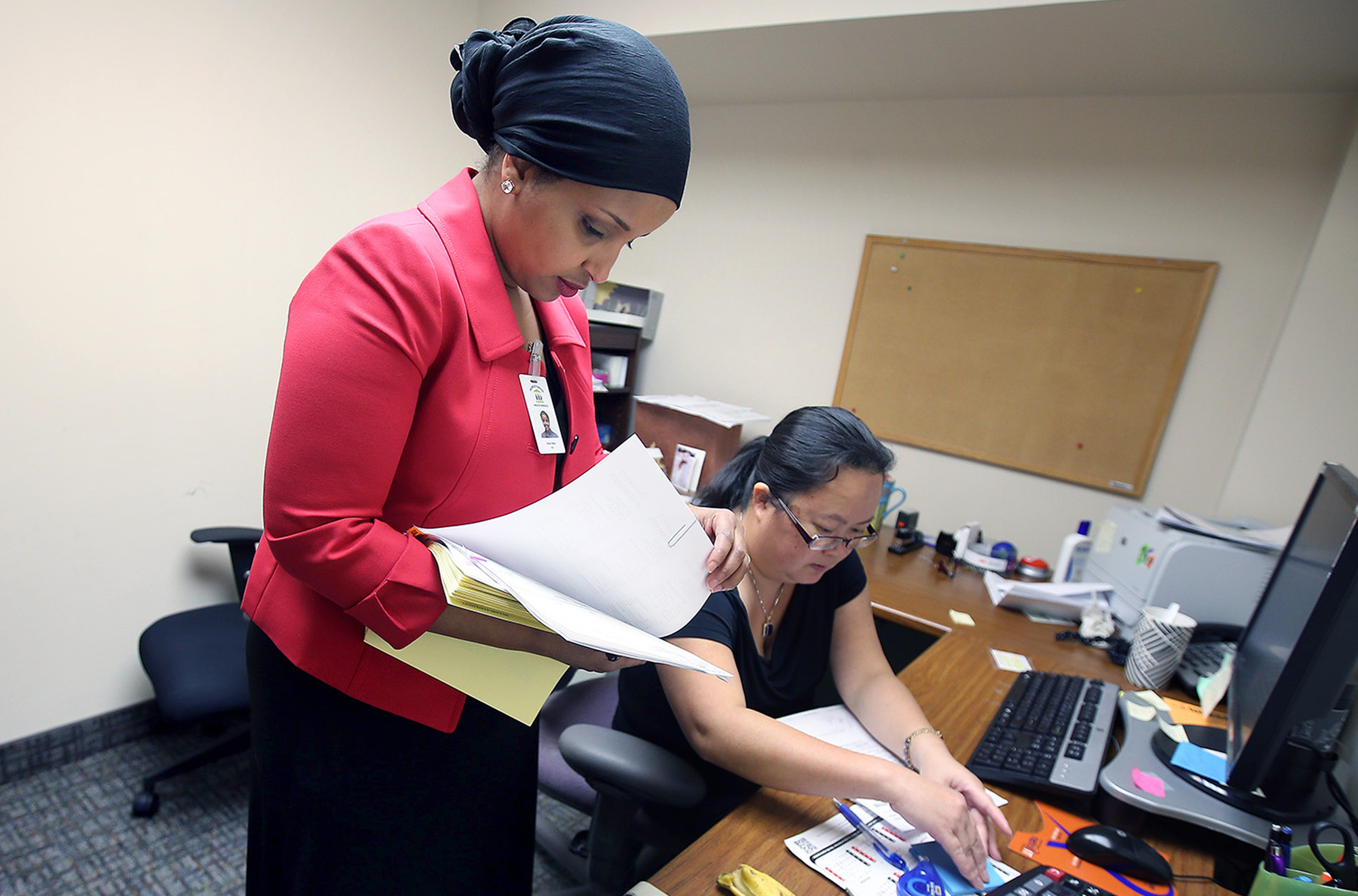 At the time, she launched the Health Commons in Cedar-Riverside, an innovative bid to bring health care to patients’ home turf. There, walk-ins could take wellness classes and get free consultations with volunteer physicians and nurses.Cawo Abdi, a University of Minnesota sociology professor, says for years now Somali-American women have launched businesses and pursued professional careers, defying more circumscribed gender roles mothers and grandmothers might have hewed to in East Africa. Now, Abdi predicts, more of them will rise to leadership positions, challenging an expectation — in the society at large and within the Somali community — that “women should not be too loud or too assertive.“Young Somali women are becoming much more visible,” Abdi said. “They are a part of the landscape now.”Coming full circleStephen Blair Venable, a People’s Center board member who led the search for a new leader, says Noor had it all: She is a seasoned health care leader, a former nurse with an intense focus on the patient experience, and a warm, personable presence. She also happens to be a trusted member of the Somali community, which accounts for 70 percent of the patients at the Cedar-Riverside location.In the community, Noor’s hire made a splash on social media. Somali leaders hosted dinners in her honor. Abdirahman Ahmed, the owner of Safari Restaurant in Minneapolis and a friend, held one of them. The dinner was emotional and celebratory, says Ahmed, but the guests also took the opportunity to give the new CEO a piece of their minds. Ahmed urged Noor to think big. He pitched a collaboration with the Mayo Clinic, with Mayo visiting hours at the center.Noor has heard much more since. Omar, her sister, passed on feedback from several patients who thought the clinic could change its scheduling to make short-notice appointments easier and ensure that calls from patients did not go unreturned. “Oh my god, we pay consultants for that kind of feedback,” Noor told her sister. “Give these patients my phone number.”Since, Noor has launched a call center that tracks call waiting and response times.“In the Somali community, Sahra is family,” said Omar. “People are comfortable giving her criticism and opinions. That also creates a lot of pressure, but she excels in pressure.”Noor already has a lengthy to-do list. She’ll work to deepen a partnership with nine community clinics that banded together into an “accountable care organization” under the Affordable Care Act. Under the model, the state rewards clinics for patient results and Medicaid savings.She’s also gearing up to launch a new initiative to integrate the services the center offers, which include dental and mental health care. The idea is that if a busy mom comes in for a child’s checkup, the center would also seamlessly fit in a dental exam and, if needed, face time with a social worker.In returning to the center, Noor once again finds herself juggling a lot. Noor, who married six years ago, has a toddler and a new college student at home. The job is demanding: compliance deadlines, leadership meetings, new projects, all under the watchful eye of a patient community that sees Noor as one of its own. “It’s OK to say no,” Denise Ryan, Noor’s assistant, told her recently.But Noor feels a sense of purpose and, as her sister puts it, “a sense of homecoming.”“I am impressed,” Venable said. “Sahra is rising to the challenge — as I expected she would.”
At the time, she launched the Health Commons in Cedar-Riverside, an innovative bid to bring health care to patients’ home turf. There, walk-ins could take wellness classes and get free consultations with volunteer physicians and nurses.Cawo Abdi, a University of Minnesota sociology professor, says for years now Somali-American women have launched businesses and pursued professional careers, defying more circumscribed gender roles mothers and grandmothers might have hewed to in East Africa. Now, Abdi predicts, more of them will rise to leadership positions, challenging an expectation — in the society at large and within the Somali community — that “women should not be too loud or too assertive.“Young Somali women are becoming much more visible,” Abdi said. “They are a part of the landscape now.”Coming full circleStephen Blair Venable, a People’s Center board member who led the search for a new leader, says Noor had it all: She is a seasoned health care leader, a former nurse with an intense focus on the patient experience, and a warm, personable presence. She also happens to be a trusted member of the Somali community, which accounts for 70 percent of the patients at the Cedar-Riverside location.In the community, Noor’s hire made a splash on social media. Somali leaders hosted dinners in her honor. Abdirahman Ahmed, the owner of Safari Restaurant in Minneapolis and a friend, held one of them. The dinner was emotional and celebratory, says Ahmed, but the guests also took the opportunity to give the new CEO a piece of their minds. Ahmed urged Noor to think big. He pitched a collaboration with the Mayo Clinic, with Mayo visiting hours at the center.Noor has heard much more since. Omar, her sister, passed on feedback from several patients who thought the clinic could change its scheduling to make short-notice appointments easier and ensure that calls from patients did not go unreturned. “Oh my god, we pay consultants for that kind of feedback,” Noor told her sister. “Give these patients my phone number.”Since, Noor has launched a call center that tracks call waiting and response times.“In the Somali community, Sahra is family,” said Omar. “People are comfortable giving her criticism and opinions. That also creates a lot of pressure, but she excels in pressure.”Noor already has a lengthy to-do list. She’ll work to deepen a partnership with nine community clinics that banded together into an “accountable care organization” under the Affordable Care Act. Under the model, the state rewards clinics for patient results and Medicaid savings.She’s also gearing up to launch a new initiative to integrate the services the center offers, which include dental and mental health care. The idea is that if a busy mom comes in for a child’s checkup, the center would also seamlessly fit in a dental exam and, if needed, face time with a social worker.In returning to the center, Noor once again finds herself juggling a lot. Noor, who married six years ago, has a toddler and a new college student at home. The job is demanding: compliance deadlines, leadership meetings, new projects, all under the watchful eye of a patient community that sees Noor as one of its own. “It’s OK to say no,” Denise Ryan, Noor’s assistant, told her recently.But Noor feels a sense of purpose and, as her sister puts it, “a sense of homecoming.”“I am impressed,” Venable said. “Sahra is rising to the challenge — as I expected she would.”http://www.somaliaonline.com/new-generation-of-somali-women-is-on-the-rise-in-minnesota/
-
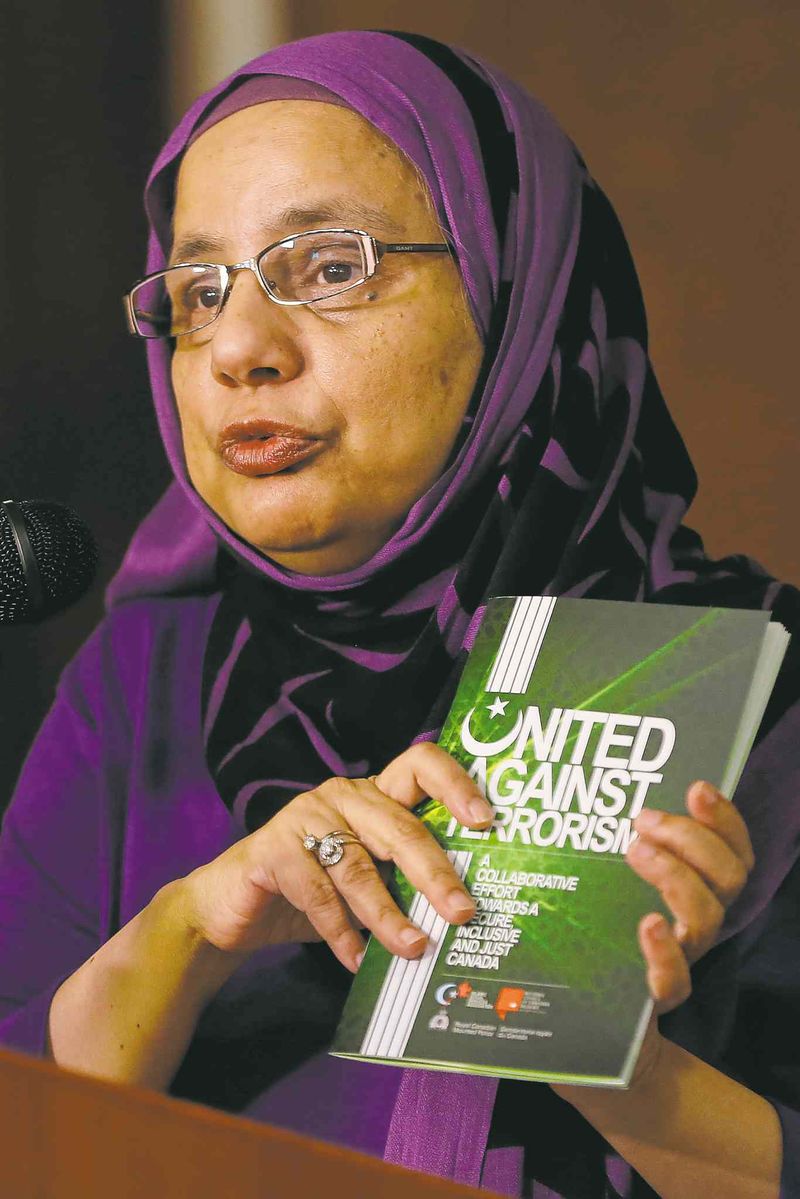 Local Muslim activist Shahina Siddiqui is desperately trying to save the future of a young University of Manitoba engineering student facing criminal charges for invoking the Islamic State (IS) during an alcohol-fuelled confrontation on campus."It always breaks my heart when I see young people in this situation," Siddiqui, executive director of the Islamic Social Services Association, said Thursday. "I would hate for this young man to lose his future."The 24-year-old engineering student, born in Somalia and raised in Winnipeg, said in an earlier interview he's being unfairly disciplined for making a reference to the Islamic State after he was kicked out of a campus bar two weeks ago.Siddiqui said she is working with the student and his family, and with both the U of M and the Winnipeg Police Service.The student was arrested by Winnipeg police and faces two charges of uttering threats to cause death or bodily harm."Security, they had me in cuffs, on the ground. Security was laughing at me," the student said."I said, 'This is, you know, the reason why these kids go join ISIS,' " he said, referencing the extremist group accused of committing violent acts in Syria and Iraq. Meanwhile, he said students from a Muslim country with whom he had been playing pool in the bar stood by and said, "You're a hero."But the engineering student said the bouncers and campus security officers are saying he said "I'll go join ISIS and come back tomorrow and bomb the university."The student said going overseas to join the Islamic State and return to campus in the space of barely a day is impossible."I'm not religious," he pointed out, "and what radical drinks in a bar?"The accused is banned from campus and is falling further behind in his courses. The student acknowledged in an interview he wasn't sober when he had the confrontation with bouncers and campus security, and that it was not the first time he's been in trouble while drinking on campus."He does have a drinking issue," Siddiqui said. "He is definitely an intelligent young man... his behaviour is absolutely unacceptable."Siddiqui pointed out his invoking ISIS in the situation was "not the smartest thing to do in this environment."The student agreed, but maintained he was the victim throughout."I brought that word up -- maybe that's why I'm being scrutinized. I know what political correctness is," the student said, but argued he should not be punished for referring to a terrorist group "when you're getting beat up and want to go home."U of M marketing and communications director John Danakas said privacy rules prevent the university from discussing individual students.Source: http://www.winnipegfreepress.com'It always breaks my heart when I see young people in this situation. I would hate for this young man to lose his future'-- local Muslim activist Shahina Siddiqui
Local Muslim activist Shahina Siddiqui is desperately trying to save the future of a young University of Manitoba engineering student facing criminal charges for invoking the Islamic State (IS) during an alcohol-fuelled confrontation on campus."It always breaks my heart when I see young people in this situation," Siddiqui, executive director of the Islamic Social Services Association, said Thursday. "I would hate for this young man to lose his future."The 24-year-old engineering student, born in Somalia and raised in Winnipeg, said in an earlier interview he's being unfairly disciplined for making a reference to the Islamic State after he was kicked out of a campus bar two weeks ago.Siddiqui said she is working with the student and his family, and with both the U of M and the Winnipeg Police Service.The student was arrested by Winnipeg police and faces two charges of uttering threats to cause death or bodily harm."Security, they had me in cuffs, on the ground. Security was laughing at me," the student said."I said, 'This is, you know, the reason why these kids go join ISIS,' " he said, referencing the extremist group accused of committing violent acts in Syria and Iraq. Meanwhile, he said students from a Muslim country with whom he had been playing pool in the bar stood by and said, "You're a hero."But the engineering student said the bouncers and campus security officers are saying he said "I'll go join ISIS and come back tomorrow and bomb the university."The student said going overseas to join the Islamic State and return to campus in the space of barely a day is impossible."I'm not religious," he pointed out, "and what radical drinks in a bar?"The accused is banned from campus and is falling further behind in his courses. The student acknowledged in an interview he wasn't sober when he had the confrontation with bouncers and campus security, and that it was not the first time he's been in trouble while drinking on campus."He does have a drinking issue," Siddiqui said. "He is definitely an intelligent young man... his behaviour is absolutely unacceptable."Siddiqui pointed out his invoking ISIS in the situation was "not the smartest thing to do in this environment."The student agreed, but maintained he was the victim throughout."I brought that word up -- maybe that's why I'm being scrutinized. I know what political correctness is," the student said, but argued he should not be punished for referring to a terrorist group "when you're getting beat up and want to go home."U of M marketing and communications director John Danakas said privacy rules prevent the university from discussing individual students.Source: http://www.winnipegfreepress.com'It always breaks my heart when I see young people in this situation. I would hate for this young man to lose his future'-- local Muslim activist Shahina Siddiqui


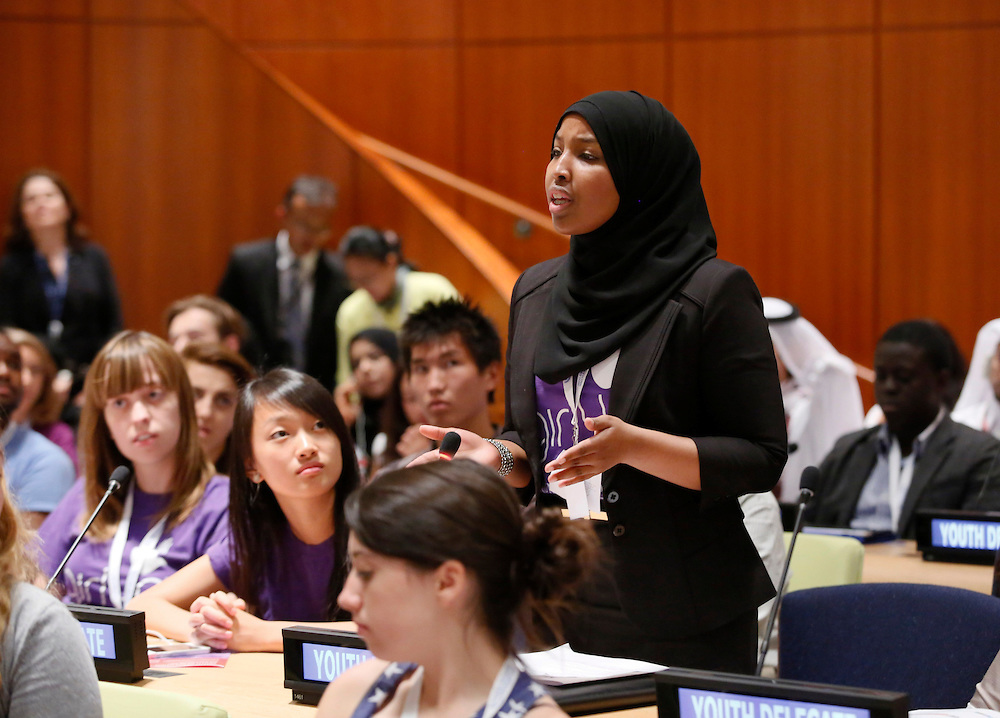
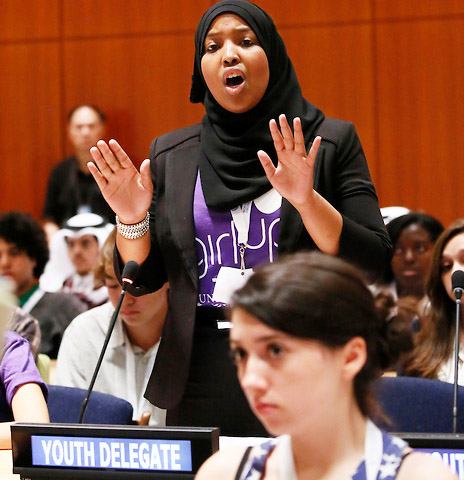
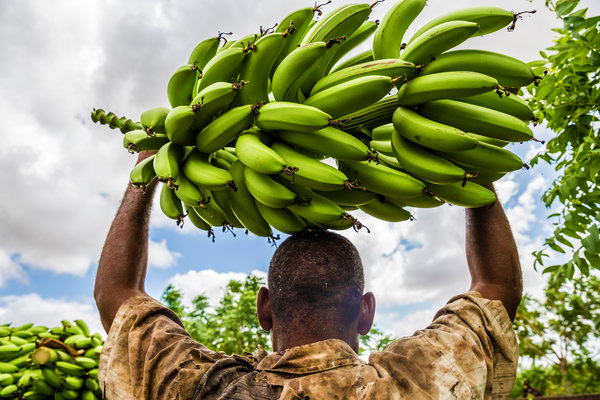
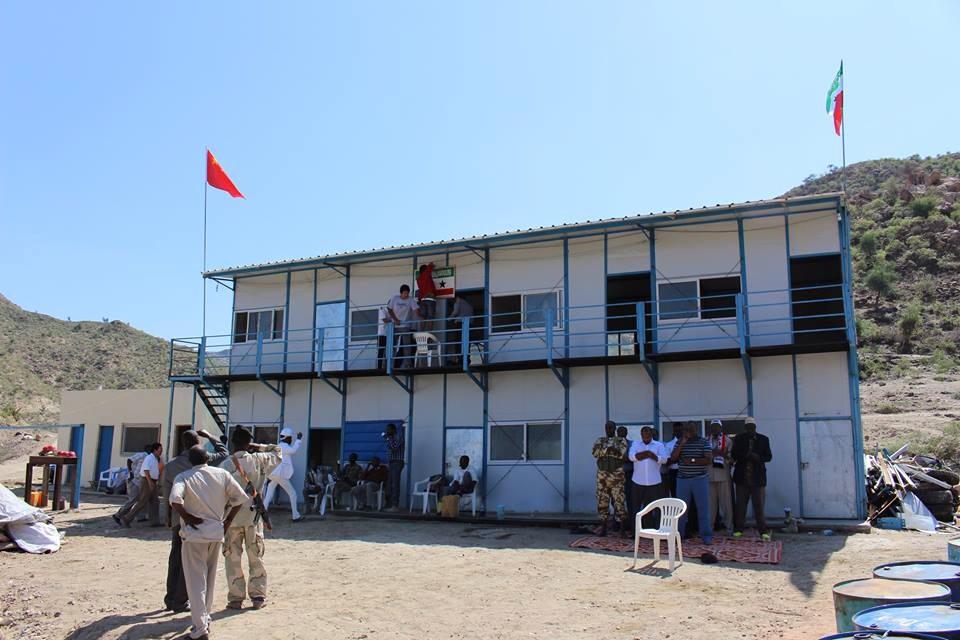
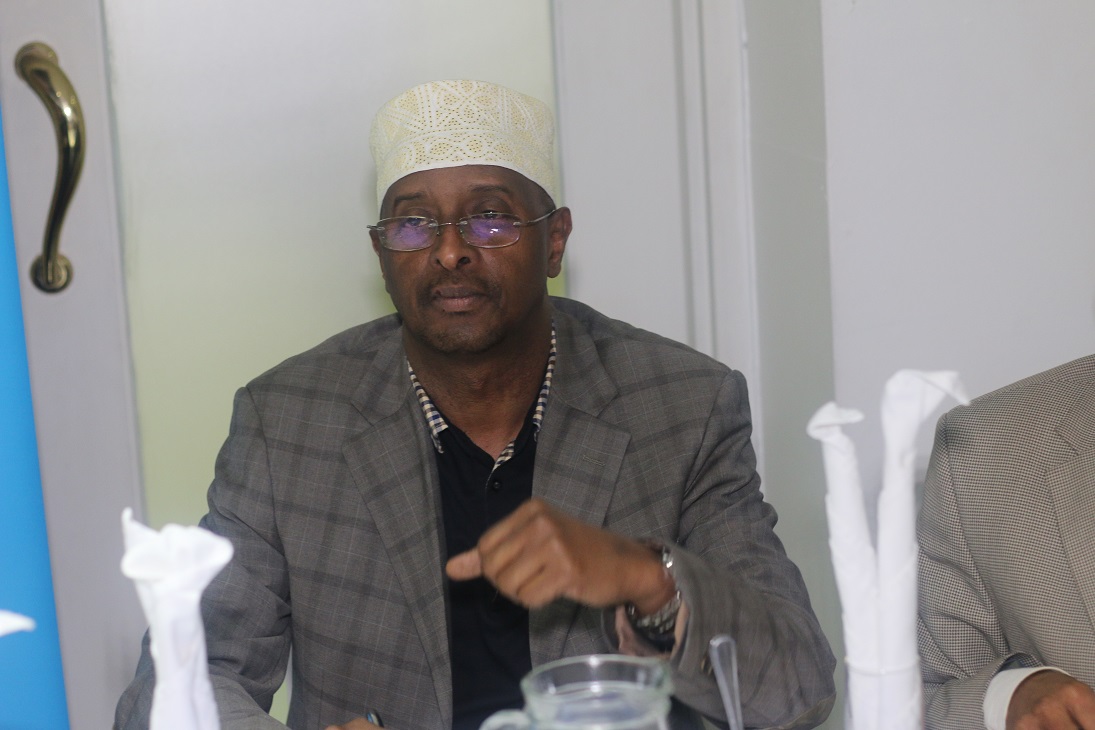
My Husband Was Murdered - But It Gave Me the Strength to Save My Country's Girls - By Fartun Adan
in General
Posted
http://www.somaliaonline.com/my-husband-was-murdered-but-it-gave-me-the-strength-to-save-my-countrys-girls-by-fartun-adan/